New arrivals to Whistler are sold the same dream so many ski bums have chased over the years, but the resort’s housing crisis often comes with a rude awakening



































BOUNCE BACK Stats show strong rebound for B.C.’s tourism industry in 2022



















16
17
REALTY RUSH? Realtors weigh in on foreign buyer ban exemption
34
RIVER RUNNER Whistler rafting guide publishes memoir
ISSUE 30.03 WWW.PIQUENEWSMAGAZINE.COM













































Nesters Market 604.932.3545 Pharmacy 604.905.0429 nestersmarket.com 7019 Nesters Road (Just 1 km north of Whistler Village) 2022 Pharmacy & Wellness PRESCRIPTIONS WHILE YOU SHOP 8am to 6pm. 7 days a week Progressive They
the nutritional
your
products
and
of activity
nutrients
ingredients and select
ingredients, ensuring absolute purity and potency
products
you. Selected products
on sale. $7.99 EACH Gluten Free, Keto and Vegan 108g Squares Functional Bars Plant Based and Vegan 33g EVE’S CRACKERS MIDDAY Prices Effective At Whistler Nesters From: Thursday, January 19th to Wednesday, January 25th 2023. We reserve the right to limit quantities. Sale limited to stock on hand. Some items subject to Tax, plus deposit, recycling fee where applicable. We’re changing our effective flyer dates to Thursday through Wednesday January 12th! , starting $5 2 FOR
think about
needs of
entire body and design their
for age, gender,
level
when it really matters. They create formulas that are finely detailed so nothing gets missed. They add support
to help you absorb and utilize the key
only the best sources of
because they want to make sure their
work for
are
Wake-up call
Whistler’s housing crisis often comes with a rude awakening for new arrivals. - By Róisín Cullen
16 BOUNCE BACK
Statistics show a strong rebound for B.C.’s tourism industry in 2022, but the sector’s labour force isn’t rebounding quite as quickly. 17 REALTY
RUSH?
Despite the resort’s exemption from Canada’s foreign homebuyer ban, Whistler realtors don’t expect a rush of international buyers to flood the market.
18

SHARING IS CARING
Following a successful pilot project last summer, Whistler’s e-bike share program will become permanent in 2023.
24 MAKE
IT OFFICIAL
Pemberton residents can help shape the future of Spud Valley by getting involved with the Village’s Official Community Plan review. 30 TAKING
FLIGHT
Decorated Olympic luger Tristan Walker is settling into a post-athletic career in Whistler—and eyeing a career as a pilot.

34 RIVER RUNNER
Whistlerite Tamar Glouberman’s new memoir, Chasing Rivers: A Whitewater Life, chronicles her years as a whitewater rafting guide.
COVER I’m confused—if economics are supposed to trickle down, shouldn’t meaningful social change do the same? Am I the only one that thinks all the massive empty houses don’t fit in? I can only assume worthy opinions must also only trickle down. - By Jon Parris // @jon.parris.art

28 34 30 THIS WEEK IN PIQUE
4 JANUARY 19, 2023










































































































LOCATED IN WHISTLER MARKETPLACE VILLAGE NORTH • FRESHSTMARKET.COM apply onl e AT F R E S H S T M A R K E T . C Gr us with * Promotional voucher must be presented at time of purchase Excludes applicable taxes bottle deposits tobacco eco-fees & gift cards This voucher has no cash value so we cannot give cash back One voucher per person per household per purchase per day promotional voucher valid for instore purchases only This voucher is only validat Fresh St Market in Whistler 4330 Northlands Blvd Whistler, BC V8E 1C2 Expires january 26 2023 329 /100 g P R I C E S I N E F F E C T F R I D AY, J A N U A R Y 2 0 - T H U R S D AY, J A N U A R Y 2 6 3 73/kg Ocean Wise Wild Ahi Tuna frozen or thawed for your convenience 399 each V ietnam Fresh White Dragonfr uit Far kay Chow Mein Noodles or steam fried Chinese style 397 g 449 each Saunders Family Farm Jam or Jelly 250 mL Por tofino Ar tisan Bread assor ted 585 g – 700 g Wong WIng Vegetable Spring Rolls 6's or chicken egg rolls 10's 999 each 599 each 699 each each 1099 lb 1 Abokichi Okazu Miso chili or curr y 230 mL WELL ORANGE YOU LUCKY wishing you a happy Yea r of the Ra b bit! Blue Ja v Oranges wishing you a happy Yea r of the Ra b bit! 449 L B CANADIAN GRAIN FED Fr e sh Boneless C ent r e Cut Pork Loin Roast OR Ch ops family pack 9 90/kg
Founding Publishers KATHY & BOB BARNETT
Publisher SARAH STROTHER - sstrother@wplpmedia.com
Editor BRADEN DUPUIS - bdupuis@piquenewsmagazine.com
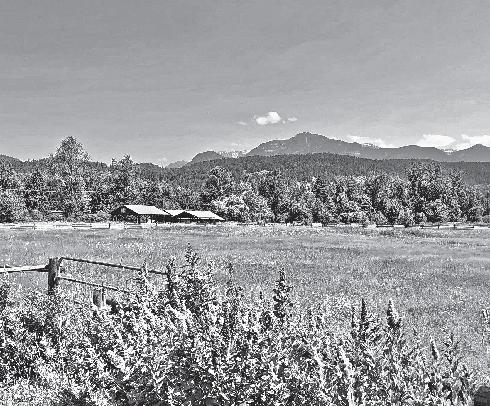
Sales Manager SUSAN HUTCHINSON - shutchinson@wplpmedia.com
Production Manager AMIR SHAHRESTANI - ashahrestani@wplpmedia.com
Art Director JON PARRIS - jparris@wplpmedia.com
Advertising Representatives
TESSA SWEENEY - tsweeney@wplpmedia.com
GEORGIA BUTLER - gbutler@wplpmedia.com
Digital/Sales Coordinator AMELA DIZDARIC - traffic@wplpmedia.com
Production production@piquenewsmagazine.com

Features Editor BRANDON BARRETT - bbarrett@piquenewsmagazine.com
Arts Editor ALYSSA NOEL - arts@piquenewsmagazine.com
Social Media Editor MEGAN LALONDE - mlalonde@piquenewsmagazine.com
Reporters
BRANDON BARRETT - bbarrett@piquenewsmagazine.com
MEGAN LALONDE - mlalonde@piquenewsmagazine.com
ALYSSA NOEL arts@piquenewsmagazine.com
ROBERT WISLA - rwisla@piquenewsmagazine.com

DAVID SONG - sports@piquenewsmagazine.com
Classifieds and Reception mail@piquenewsmagazine.com

Office and Accounts Manager HEIDI RODE - hrode@wplpmedia.com
Contributors
President, Whistler Publishing LP

SARAH STROTHER - sstrother@wplpmedia.com
ISSN #1206-2022
Subscriptions: $76.70/yr. within Canada, $136.60/yr. courier within Canada. $605.80/ yr. courier to USA. GST included. GST Reg. #R139517908.
Canadian Publications Mail Product Sales Agreement #40016549.


THIS WEEK IN PIQUE 38 MUSEUM MUSINGS The Whistler
and Archives
for decades—now it’s eyeing a brand new facility to call its permanent home. 13 PIQUE’N YER INTEREST With the Village
closed, columnist Megan
poses an important question: Does Whistler need a bowling alley? (Editor’s note: yes.) 08 OPENING REMARKS Though some technological advances may be slower than first advertised, is Whistler doing enough to future-proof itself in the meantime? 10 LETTERS TO THE EDITOR Letter writers this week reminisce
Whistler’s
days, take aim at the B.C. justice system, and applaud the efforts
27 THE OUTSIDER Vince Shuley breaks down some ski-hill archetypes you might see in Whistler and beyond this winter. 32 FORK IN THE ROAD Eating more beans—and fewer calories overall—can lead to a longer life, writes Glenda Bartosh. Opinion
Columns
Lifestyle
54 MAXED OUT With its stifled debate and blatant overreach, B.C.’s
health-care
is
shameful travesty, writes
32 38 We acknowledge the support of the Government of Canada #202 -1390 ALPHA LAKE RD., FUNCTION JUNCTION, WHISTLER, B.C. V8E 0H9. PH: (604) 938-0202 FAX: (604) 938-0201
Pique Newsmagazine (a publication of Whistler Publishing Limited Partnership, a division of Glacier Media) distributed to over 130 locations in Whistler and to over 200 locations from Vancouver to D’Arcy. The entire contents of Pique Newsmagazine are copyright 2023 by Pique Newsmagazine (a publication of WPLP, a division of Glacier Media). No portion may be reproduced in whole or in part by any means, including electronic retrieval systems, without the express written permission of the Publisher. In no event shall unsolicited material subject this publication to any claim or fees. Copyright in letters and other (unsolicited) materials submitted and accepted for publication remains with the author but the publisher and its licensees may freely reproduce them in print, electronic or other forms. Letters to the Editor must contain the author’s name, address and daytime telephone number. Maximum length is 250 words. We reserve the right to edit, condense or reject any contribution. Letters reflect the opinion of the writer and not that of Pique Newsmagazine Pique
Newsmedia Council, which is an independent organization established to deal
concerns about editorial content, please
response
formal complaint, visit
web site at
Museum
has tracked Whistler’s history
8
Lalonde
about
glory
of Whistler Adaptive.
&
Environment & Adventure
& Arts
new
act
a
G.D. Maxwell.
www.piquenewsmagazine.com
Newsmagazine is a member of the National
with acceptable journalistic practices and ethical behaviour. If you have
contact (edit@ piquenewsmagazine.com). If you are not satisfied with the
and wish to file a
the
mediacouncil. ca or call toll-free 1-844-877-1163 for additional information. This organization replaces the BC Press council (and any mention of it).
G.D. MAXWELL, GLENDA BARTOSH, LESLIE ANTHONY, ANDREW MITCHELL, ALISON TAYLOR, VINCE SHULEY
6 JANUARY 19, 2023 1.
17.6
acres
w.
river
frontage
$1.4M 2.
115
acres
w.
trees/fields,
river
fr.
NOW
$4.37M 3.
126
acres
w.
home,
barns/shop,
river
fr.
$5M 4.
10+
acres
3
minutes
from
downtown
$3.25M 5.
198
acres
w.
home,
trees/fields,
river
fr.
$10M 6.
Motel
w.
10
units
and
2
cabins
Pemb.
$3.7M 7.
Mountain
Side
Townhomes
-
New
Listings
Completion
Summer
2023 SOLD 5
acres
w.
home,
barn,
suite,
$1.92M SOLD Indust.
Park
.5
acre
w.
building
$3.25M SOLD
Indust.
Park
building
w.
suite
$2.15 1 5 3 2 REAL
ESTATE INGHAM Pemberton’s
Local
Real
Estate
Listing
Expert (604)230-8167
Frank@Frankingham.com 4


































F e e d i n g t h e Sp i r i t o f Wh i st le r S i n ce 19 8 8 100's of free dry & warm underground parking spots available. CREEKSIDE VILLAGE 604.938.9301 TRANSIT PASSES on sale instore @whistlercreeksidemarket /CreeksideMarket BEST CUSTOMER SERVICE 2020, 2021, 2022 Current Opening Hours: Daily from 7am-8pm Follow us on Facebook & Instagram for changes to our opening hours. PERUVIAN RED SEEDLESS GRAPES $4LB 8.82 KG COMPLIMENTS MUFFINS Raisin Bran, Banana Choc Chip, Blueberry or Carrot $6 6 PACK LECLERC COOKIES 8 Flavours to Choose From 2 FOR $7 240G OASIS FRUIT SMOOTHIES Greenenergy, Berry or Tropica Mango $5 1 75L P RO D U C E D E L I B A K E RY G RO C E RY DA I RY/ F ROZ E N OVEN FRESH ROLLS Sausage or Spinach & Cheese $8 480-600G M E AT/S E A F O O D MEXICAN ORGANIC AVOCADOES $5 4 PACK INDIAN LIFE NAAN Authentic, Wholewheat or Garlic $5 500G QUAKER GRANOLA BARS Chewy or Dipps $3 120-156G MCCAIN SUPERFRIES 7 Varieties to Choose From $4 650G FRESH KUTERRA SALMON FILLETS $4 100G FRESH IS BEST SALSA Mild, Mediu or Hot $5 375G RAINCOAST CRIPS ARTISAN CRACKERS 6 Varieties to Choose From $7 150G P E C I A L S : J A N U A R Y 1 9 - 2 5 QUE PASA ORGANIC TORTILLA CHIPS Salted, Sea Salt, Unsalted Red Corn, Blue Corn or Hint of Lime $4 300 -350G QUE PASA ORGANIC TORTILLA CHIPS $4
Future-proofing Whistler

FOUR YEARS AGO, I sat in on a riveting Lower Mainland Local Government Association (LMLGA) presentation—an oxymoron, I know—that has stuck with me ever since.
In it, Don Lidstone, a Vancouver lawyer specializing in local government law, broke down the implications of autonomous
BY BRADEN DUPUIS
vehicles—implications, he posited, that nobody was really paying attention to.
“It will be more transformative than the internet or internal combustion during the next 10 years, and during the next election term of four years, you’ll have to deal with it in terms of staffing, finance, infrastructure, IT systems, risk management and viability and bylaws. A lot of big issues there,” Lidstone said.

“2022 is your next election … and nobody is doing anything about the fact that there are going to be so many of these driverless cars.”
This massive shift in transportation would require municipalities to completely rethink their approach to planning, Lidstone reasoned.
“Right now, if you have engineering and planning, you’re dealing with signage, you’re dealing with curbs and lanes and signals, traffic intersections, parking. That’s all going to change, because none of that is going to be relevant anymore,” he said.
“These cars operate by lidar and radar and cameras ... so the cars talk to each other, but they also have to talk to your infrastructure.”
That was May 2018, and the election Lidstone referenced has now come and gone—with nary a peep of the implications of autonomous vehicles.
So the technological revolution has been slower than advertised.
The topic of autonomous vehicles was once
again broached locally at a Whistler Learning Centre panel discussion in September 2020.
At that event, real-estate economist and University of Alberta professor David DaleJohnson noted the Society of Automotive Engineers has developed a ranking system for vehicle automation, weighted on a scale of zero to five—zero being no automation, five being full, with four constituting a “very high” level of automation that still allows the user to step in, if necessary.

The roadblock to full automation is uniquely philosophical, in a way, DaleJohnson said.



“The issue is, if you’re following a vehicle and all of a sudden a mattress falls off the roof of the vehicle right in front of you, is the car smart enough—does it have enough intellectual capacity—to know what it’s supposed to do?” he said.
Some researchers don’t think we’ll ever achieve Level 5 automation, Dale-Johnson said.
autopilot mode has been a complaint among Tesla owners for some time.
So again—the technological revolution isn’t exactly happening overnight.
But Whistler would be wise to start taking it more seriously, on all fronts.
True to Lidstone’s assertions, there is no evidence that the Resort Municipality of Whistler (RMOW)—or any local governments in B.C., really—are taking serious steps to prepare for the rise of autonomous vehicles.
In fact, the words “autonomous” and “driverless” are both completely absent from Whistler’s recently adopted, 387-page Official Community Plan.

Taking it a step further, “automation” is also missing, despite the fact that workforce automation will no doubt play a key role in the resort’s future.
The word “technology” does appear 13 times over the 387 pages, and often in reference to things like transportation and motor vehicles,
with any degree of certainty.
My mother used to tell us stories about how, when she was a kid, the prevailing belief was that, by the year 2000, everyone would have their own personal jetpack.
Twenty-three years past that promised delivery date, my mom is still bitter she does not yet have her own jetpack.
It’s the same vibe given off by those retro, old-timey magazines with their hypothetical views of the future—always so laughably wrong and optimistic when viewed in hindsight from the hypothesized year in question.

I suppose it speaks to our idealized view of technology and how it will progress— somehow always along a straight, progressive line towards a sleek, helpful, stress-free future; never how it actually plays out, which is often two steps forward, one step back, followed by a step or two to either side.
So how will technology, Artificial
Either way, it would appear self-driving cars have a long way to go before they’re transforming our everyday lives.
On Nov. 24, a 2021 Tesla Model S equipped with a prototype “full self-driving” mode caused an eight-car pileup on San Francisco’s Oakland Bay Bridge.
According to a detailed breakdown of the crash by Forbes, that incident was likely at least partially caused by human error. But the article notes that “phantom braking” while in

so the plot isn’t completely lost.
The RMOW also has a Technology Advisory Committee… but like most municipal committees, the majority of its meetings are closed to the public, so we can’t really know how seriously they’re discussing things like driverless cars or the implications of automation.
At any rate, history shows us that the future of technology and its practical implications can be a difficult topic to discuss
Intelligence and workforce automation impact Whistler as a tourist resort?

It’s safe to say that, in the long run, automation will prove a net positive. It’s also a safe bet that we’re in for some collective hardship as we muddle our way towards a truly post-work society.
When it comes to the hard specifics, only time will tell—but preparing for the future, whatever it might hold, is in Whistler’s best interests. ■
OPENING REMARKS
8 JANUARY 19, 2023 Over 60+ 5-star Google Reviews don’t lie, let’s connect so we can start working to find your dream property Cell: 604 905 8438 2-2240 Nordic Drive Located in the Taluswood complex slopeside to Whistler Mountain, this spacious1305 sq ft, 2 bed/2 5 bath townhome is the perfect Whistler getaway with vaulted ceilings, stone fireplace, log and beam accents, forced air furnace, heated tile flooring, pool hot tub and garage Full-time owner use allowed with nightly rental option No GST Asking Price: $2,299,000 www gskllp ca Ross Parker, CPA / ross@gskllp.ca / 604.892.9100 Specializing in accounting and tax ser vices for corporations and their shareholders. Please contact me for an initial no-charge confidential consultation
My mother used to tell us stories about how, when she was a kid, the prevailing belief was that, by the year 2000, everyone would have their own personal jetpack.


































FIS Nordic Junior / U23 World Ski Championships Proudly Supporting Sport & Winter Tourism: Official Partners: Presented by: Event Venue Partner: Federations: B e Part of the Action at Whistler Olympic Park! Cross-Country Skiing • Nordic Combined • Ski Jumping Jan. 27 to Feb. 5, 2023 • Tickets $5, kids under 6 FREE Come cheer the athletes, ski, snowshoe, toboggan and enjoy the festival marketplace! The day lodge is open with food service. @blacktusknordic Watch on livestream! Tickets & more info at WJC2023.ca COMPETITION & CEREMONY SCHEDULE January 27: Opening Ceremony Jan. 28–31: Cross-Country Skiing February 1: Nordic Combined February 2: Cross Country Skiing & Ski Jumping February 3: Cross Country Skiing & Nordic Combined February 4: Cross Country Skiing, Ski Jumping & Nordic Combined February 5: Ski Jumping & Closing Ceremony Detailed schedule available at WJC2023.ca
There’s no turning back for Whistler


A while back, I was once a prolific letter writer to Pique. Many of those who read and noticed them have recently asked me why I haven’t submitted one in quite a few years. What gives? The short answer is my hope gives.

Let’s face it, Whistler is a victim of its own success. Any attempts to even try to resuscitate some form of authenticity are fruitless at this point. In retrospect, maybe I was idealistic, naive and just holding on to the carefree glory years of ski bums and hippies. Can you imagine before the onslaught of social media, I thought my opinion could optimistically spark change, instil common sense or at least create a dialogue with the lawmakers? It’s laughable now.

“Plus ça change, plus c’est la même chose.” While the target demographic, corporate structure, overpriced everything and blatant opulence are the new normal, all the old problems still exist and have never been fully addressed. The writing has been on the wall for decades. G.D. Maxwell has been writing it weekly since the beginning. None of this happened overnight. It seemed there was this notion that if you avoid it, it may fix itself. Cater to the rich and the peasants will magically take care of themselves.
Even when I moved here in 1988 , there was a “housing crisis.” Basically that meant a ski bum that arrived in November may have to couchsurf for a while. I spent my first night on Seppo’s couch and the rest of the season in a motorhome at the KOA Campgrounds (now Spruce Grove). At least there were options back then—plenty of ski chalets with lots of rooms, and some with cheap rent, especially in the summer.
House parties, potlucks, bonfires and visitors were common. Almost all this inventory has been replaced by usually vacant, single-family vacation homes. Where zoning permits, most of the remaining rentals are now Airbnb. Square footage and occupancy is inversely proportional. It’s




either a 5,000-plus-square-foot mansion used short-term or four to a bedroom.


Back then you could still squat in many places, and the day lots were free campgrounds. Myself and many of my forwardthinking friends improvised for a while to come up with a downpayment for a townhouse or lot up in Pemberton/Birken. Squamish was rough, but an affordable option, with plenty of listings after the mill closed. These folks are the lucky ones who were able to stay and raise a family in the Sea to Sky. Unfortunately, most of those who didn’t invest had to move away. Now, even successful long-term locals are cashing in and moving on.


My point is we are much worse off now with

respect to housing, affordability and the ability to attract and retain the creative, visionary and business-savvy people as well as all the workers needed to make the resort function in the long run. Add to this overtourism, corporatization, traffic, unsustainable growth, climate change, loss of arts and culture (I still grieve the loss of The Boot and the original Dusty’s) and it’s obvious there is no turning back. I now feel like an outsider when walking through the village. The most noticeable change is the demographic.
My visionary self can still imagine the what ifs of missed opportunities. The social housing, more staff accommodation, hostels, seniors homes, a locally or at least Canadian-owned ski company, concert venues, preservation of history, sustainable energy options, a rail service, affordable restaurants, relaxed liquor laws and a thriving cannabis scene. Can you believe we don’t even have a pot shop yet? We’ve missed the boat on so many fronts.
On a positive note, there are still some things in Whistler that are wonderful and timeless, mostly the things that can’t be ruined by capitalism, bureaucracy, greed or mismanagement. I have great memories, fabulous friends, appreciate nature and the beautiful scenery, and I still enjoy skiing, my job grooming, and vending at the farmers’ market. I’m one of the lucky ones.
“The more things change, the more they stay the same.”




 Mike Roger // Birken/Whistler
Mike Roger // Birken/Whistler




LETTERS TO THE EDITOR
10 JANUARY 19, 2023 suttonwestcoast.com | LOCAL AGENTS | LOCAL KNOWLEDGE | LOCAL EXPERTS Squamish Specializing in Squamish pre-sale opportunities Get in touch for information about upcoming projects Peter Cudmore 604-902-1858 peter@petercudmore com Whistler 302-3212 Ravencrest Blueberry Drive $2,850,000 • Panoramic views from Wedge to Blackcomb! • Rarely available 4 bed & 3 bath • Phase 1 zoing allows nightly rentals and unlimited owner use • Massive floor plan 2309 sq ft with lots of storage! Matthew Callaghan Personal Rea Estate Corporat on 604-966-8678 mcallaghan@sutton com NEWPRICE Squamish 38147 Cleveland Avenue Call today for your real estate needs Residential and Commercial Darin Joseph 604-849-2656 darin@darinjoseph com LEASED Dave Halliwell 604-932-7727 dave@davehalliwell com Whistler 9344 Emerald Drive $3,495,000 • Excellent revenue producer • Panoramic mountain views • Great family home with separate carriage house SOLD W H I S T L E R | P E M B E R T O N | S Q U A M I S H L o c a l E x p e r t i s e w i t h N a t i o n w i d e E x p o s u r e
Law and disorder in B.C. not just sad, it’s tragic



When I heard former U.S. President Donald Trump say this, I was shocked: “I could stand in the middle of Fifth Avenue and shoot somebody, and I wouldn’t lose any voters, OK?”
Now I realize that, under current conditions, I could stand in the middle of Main Street in Whistler and commit a crime knowing full well that I would be released on bail within minutes. Probably just get a ticket to appear.
Released on bail, authorities had been searching for Amardip Singh Rai since May 2021, when he failed to appear in court on 17 charges that include sexual assault, assault with a weapon and unlawful confinement. Nine of the charges are related to firearms.
Earlier this month, Fario Panzu Mabana was released on bail after allegedly throwing hot soup in an elderly Vancouver convenience store worker’s face.
Also this month, the Vancouver Police
- PATRICK SMYTH
Law and disorder in B.C. is not only sad, but tragic. Our Crown counsel and judges are absolutely useless. Here are some B.C. news items from this past week:

“Manhunt underway for missing Abbotsford teen accused of stabbing woman.”
The sixteen-year-old was released from custody in October after being charged with aggravated assault, assault with a weapon and robbery.
“One of Canada’s most-wanted fugitives arrested in Surrey, police say.”
Department released a 45-year-old who allegedly shot first responders working on Vancouver’s Downtown Eastside, and police, with a pellet gun.
“He’s a man who, at the time of his arrest, was out on bail for another violent crime,” said VPD Sgt. Steve Addison. “He was wanted B.C.wide for theft out of Nanaimo.”
Meanwhile, a man with more than 115 criminal convictions was arrested this month after allegedly stealing nearly $40,000 worth of art from a gallery in Vancouver, according
Backcountry Update


AS OF TUESDAY, JAN. 17
The coastal snowpack has had a wild ride. It has seen cold and snowy conditions, warm and rainy conditions, and periods of dry weather. We expect the area to see light to moderate snow on Friday and Saturday. Depending on how things play out, Sunday could be a good day to get into the backcountry. Be sure to check the forecast at avalanche.ca before heading out.
Conditions will be tricky in the areas north and east of Pemberton. The danger rating may not fully convey the complicated nature of avalanche conditions around the Hurley, Birkenhead, and the Duffy.
The snowpack there is shallow, with several weak layers hidden at the bottom. The lateDecember crust is down 60- to 120-centimetres. Near the base of the snowpack, a weak layer from mid-November can be found and remains a concern. Not only is this not a typical snowpack structure for the coastal mountains, it’s also not showing any typical signs of instability (i.e., shooting cracks, whumpfing, hollow or drum-like sounds). It’s highly unlikely that you’ll see clues that these weak layers can be easily triggered. If you get out your shovel
and dig down to the November layer (the snow will look like large grains of sugar), you’ll see that the snowpack here is a house of cards and is primed for human-triggered avalanches.

If you are planning to head into those zones, making conservative terrain choices and leaving a wider margin for error will be essential. Here are a few suggestions:



Avoid alpine terrain and treeline features where the snowpack is shallow. Avoid rock outcroppings, convexities, and anywhere else the snowpack is thin or variable. Reduce the consequences by sticking to smaller pieces of terrain that aren’t capable of creating large avalanches.
Ride one at a time, stick to the sides of features, regroup in safe spots well away from overhead hazards, and have a clear, established escape plan.

From a mindset perspective, adopt a defensive posture; I don’t care if you call it stepping back, high alert, or low ambition.

This weekend will be about matching terrain (and how you travel through it) to conditions. As always, be sure to visit avalanche.ca to get the most up-to-date information on how the weekend will play out. ■

at 604-938-7676,
Write to us! Letters to the editor must contain the writer’s name, address and a daytime telephone number. Maximum length is 450 words. Pique Newsmagazine reserves the right to edit, condense or refrain from publishing any contribution. Letters re ect the opinion of the writer and not that of Pique Newsmagazine GOT GOOD VIBES TO SHARE? Send them to goodnews@piquenewsmagazine.com

LETTERS TO THE EDITOR
CONDITIONS MAY VARY AND CAN CHANGE RAPIDLY Check for the most current conditions before heading out into the backcountry. Daily updates for the areas adjacent to Whistler Blackcomb are available
or surf
snow-report#backcountry or
to www.whistlerblackcomb.com/mountain-info/
go to www.avalanche.ca.
“Our Crown counsel and judges are absolutely useless.”
JANUARY 19, 2023 11 Engel & Völkers Whistler T 604.935.2287 E marshall@marshallviner.com marshallviner.com 8271 Alpine Way • 3 Bedrooms + Study, 2 Bedroom • Quiet lot with loads of sunlight & fabulous mountain views • Home and property are meticulously maintained $3,499,990 Register at marshallviner com to receive weekly real estate updates W H I S T L E R ’ S #1 RE/MAX AGENT 3111 S T MORITZ Walk to Alta Lake or the Wh is tler Village from th is 4 bedroom end unit townhome Nig htly rentals allowed $2,575,000
LETTERS TO THE EDITOR




to police, while a Richmond man with a history of domestic violence—recently convicted of beating his wife in front of their five-yearold—won’t see any jail time, a Supreme Court judge ruled last month.
Our police forces are doing outstanding jobs. Our politicians, and by virtue the legal system, are a massive failure. Convince me I am wrong.
Patrick Smyth // Whistler


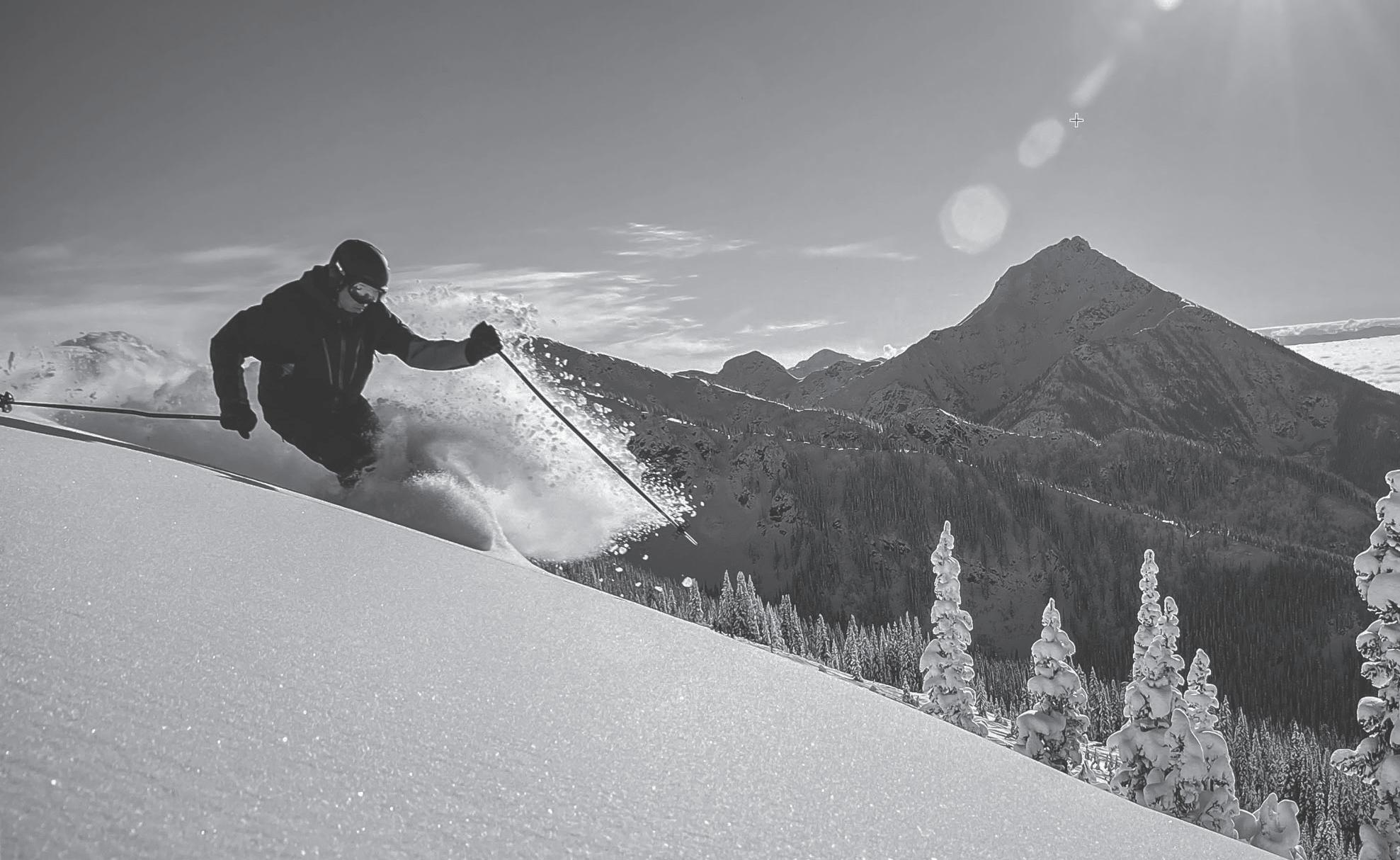
Whistler Adaptive Sports Program creates life-changing experiences
I read with interest the information in your Jan. 5 issue about the Whistler Adaptive Sports Program (WASP).
Congratulations to Megan Lalonde for her article about the inspirational Olivia Rey. Onya Olivia—keep skiing!


I am one of the “surge of participants” mentioned in the latter half of the article; the “Zorro” crew of family and friends travelling from Australia and New Zealand for our fourth visit to Whistler so I could again participate as a sit-skier in the adaptive program.
Executive director Shelley Milstein stated that WASP was seriously challenged in many aspects of this 2022-23 season. I have to say that WASP has met, defied and so far defeated these challenges. I had some fabulous days skiing, including my 70th birthday, when three generations of our family, and our mates, had some of those
beautiful long Whistler runs.
For a struggling system, I must congratulate all WASP personnel who performed their duties to the utmost, and sometimes beyond, with professional attitude, kindness, patience and generosity of time and spirit, attention to safe skiing on the mountain, confident in their knowledge of the sport and its often complex equipment. They are genuinely great people helping the less fortunate, like me, to have the time of their lives or their experience of a lifetime. Whistler mountain-man Wyllie Buchanan— you are a legend!
I hope many men and women would have read your article and undertaken some serious thought about giving some time to help the WASP organization. The friendships made, the knowledge gained and, of course, the chance to ski and experience other adventure sports and recreation make it a very interesting and often life-changing experience. There are opportunities available to ski with some intriguing, physically and/or mentally challenged, amazing and sometimes inspiring people who would be incredibly grateful for your help.

Please publish more articles about the WASP organization; many more of the general public are becoming interested in adaptive sports, the athletes and those behind them. Especially if an old bloke in a sit-ski is faster than they are on a big blue run.
John D. Sorensen // New Zealand n

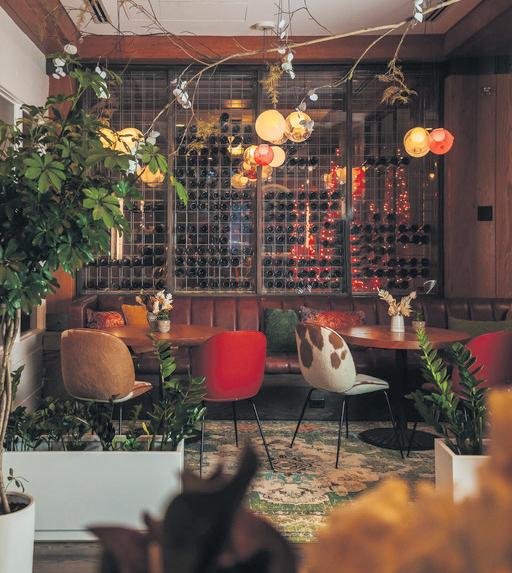


























12 JANUARY 19, 2023 Build, Ski Golf & Live , At the incredible Revelstoke Mountain Resort One acre lot available on the luxurious Mackenzie Court seconds away from the lifts and the under-construction Cabot Revelstoke Golf Course Short term home rentals available $1 120 000 , , Contact Chris Pawlitsky 250 200 0181 chris@revelstoke-realty com each office independently owned and operated RE/MAX Revelstoke Realty 250 837 5121 Join Us For Our 'Locals Only' 4-Course Menu www nitalakelodge com/theden | @thedenwhistler Just $59 per person Last chance! Available Sunday - Thursday until January 26th Excellent meat & vegan options available *One person per table must have proof of full time residency in the sea-to-sky (Squamish to Pemberton) SEA TO SKY PSYCHEDELIC THERAPY Individual and group Ketamine Assisted Therapy facilitated by a collective of Sea to Sky counsellors, psychiatrists, nurses and doctors Psilocybin-assisted therapy via Health Canada special access program coming soon www seatoskypsychedelictherapy com seatoskykat@gmail com L ooking for a new Accountant? We love spreadsheets so you don't have to! L et us help with your financials and tax planning. Accepting corporate clients Book your free confidential consultation now Nick Davies, Whistler local and exper ienced family lawyer pr actising across BC and Yukon. Call at 604-602-9000 or visit www.macleanlaw.ca Maclean Law is headquar tered in Vancouver with offices across Br itish Columbia
Does Whistler need a bowling alley?
A FEW TIMES each shift, I’ll inevitably get asked some variation of the same question from a few different tables I’m serving, usually as I’m handing over the credit card machine.
“What’s fun to do in Whistler tonight?”





Usually I’ll rattle off a few of the spots in the village I think have the best music, the best cocktails, the best beer lists, the
BY MEGAN LALONDE
best overall vibes, depending on what they’re looking for. Occasionally I’ll offer some guidance about whether Cows ice cream is really worth waiting in line for.
The question becomes significantly more difficult to answer when it’s coming from a family with kids, or anyone who has made it abundantly clear that their plans for the evening don’t include heading underground.
There’s Vallea Lumina, or an escape room if that’s your thing; the Scandinave Spa is open until 9 p.m., and in the winter there’s the skating rink at Olympic Plaza and crosscountry skiing at Lost Lake. Axe throwing, if you’re willing to drive to Function. There was the cinema, until that closed earlier this month. Otherwise, I’m stumped.
I know the movie theatre shutting down represents the loss of one of the last affordable evening activities for a lot of people in town, especially families. It’s also reviving the conversation about the need for more weatherindependent entertainment options in the resort. (Anyone remember the time a pre-Vail Whistler Blackcomb planned to build a water park? Anyone remember the time there actually was a water park at the base of Whistler?)
As Pique reported last week, the theatre’s closure also means the massive,
couch, but realistically, Village 8 couldn’t hold a candle to the massive theatres with IMAX screens, motion seats, and probably pumped-in scents at this point. (This might be a good time to admit that I haven’t been to a movie theatre since well before the pandemic started.)
So what should go down there, taking into account the commercial space’s strict zoning limitations?
A poll on Pique’s website asked that question last week. Here’s what readers had to say:
CINEMA 25.84 PER CENT

BOWLING ALLEY 30.73 PER CENT
RESTAURANT AND BAR 1.56 PER CENT
SKATING RINK 1.78 PER CENT
MINI-PUTTING COURSE 2.90 PER CENT
ALL OF THE ABOVE 22.94 PER CENT
NIGHTCLUB 1.56 PER CENT
WAVE POOL 6.46 PER CENT
OTHER 3.56 PER CENT
NOTHING, IT SHOULD STAY EMPTY 2.67 PER CENT
struggling with an employee shortage.
The proponent, Calgary-based Concorde Entertainment Group, ended up pulling the proposal.
Fair enough, but still, it seems unbelievably wild that a massive piece of property in one of the most prestigious commercial areas in Canada can sit empty indefinitely, even with the challenges any operator would face when committing to such a massive project.
So let’s dream big for a hot sec.

That space could house some solid entertainment options that aren’t limited to sitting at a table and drinking. Like three bigger cinema screens instead of eight smaller ones, with the full VIP experience and 4D-moving seats, for example. (Are cheap Tuesday nights still a thing for those theatres?)
Or lean into Whistler’s status as an action-sports hub and throw in a few skate ramps. Or a go-kart track. Or indoor golf. A lazy river, a standing wave and a pool with a couple of slides?
33,000-square-foot commercial space in that corner of the village that has remained partially vacant for more than two decades, owned by West Vancouver-based real estate firm Larco Investments, just got even bigger and emptier.
But truthfully, Village 8’s eight screens and rows of fold-down seats were already underutilizing that space. It might have beat watching Netflix on a laptop screen from your

Bowling wins! Should be an easy enough task, especially considering there’s still a few abandoned lanes somewhere down there, leftover from the bowling alley that used to operate in the space back in the day, right?
But that’s not necessarily the case. Another company tried to make that happen a few years ago, but met opposition from the resort’s hospitality industry, which cited concerns about the need for more staff in a town already
Or, just give the people what they want and bring back a bowling alley.
It’s pretty clear from the traffic on the Sea to Sky highway every Friday and Sunday afternoon that Whistler doesn’t need new attractions to draw in visitors. But with good weather becoming less of a guarantee, and an empty space sitting a few steps from Whistler Blackcomb’s lifts, using that space to give locals and visitors another way to spend a rainy evening doesn’t seem like the worst idea. ■
PIQUE N’ YER INTEREST
[L]et’s dream big for a hot sec. JANUARY 19, 2023 13 C A L L A G H A N V A L L E Y C A N A D I A N W I L D E R N E S S . C O M S N O W M O B I L E T O U R A C O M P A N Y W I T H H E A R T 604 938 1616 C A R L E T O N L O D G E / E A G L E L O D G E W I L D E R N E S S R U N






Engel & Völkers Whistler
























Engel & Völkers Whistler
Statistics show a strong rebound for B.C.’s tourism industry in 2022
AS VISITORS RETURN, THE TOURISM SECTOR’S LABOUR FORCE ISN’T REBOUNDING QUITE AS QUICKLY
BY MEGAN LALONDE
AS VISITOR NUMBERS trend ever closer to pre-pandemic levels in B.C., its tourism industry’s labour force isn’t recovering at quite the same rate.
“We picked up a lot of momentum after many of the last travel restrictions were lifted in the spring of last year, and that really opened the doors to people wanting to travel,” said Walt Judas, CEO of the Tourism Industry Association of British Columbia (TIABC).“We saw that particularly on the domestic side—we’re still far behind from where we need to be or want to be on the international front, but we’re getting a lift from international destinations now, too, and anticipate that there may be recovery in ’24, ’25, depending on all kinds of circumstances, including whether a full recession materializes, or whether there are other influences such as inflation or wars or what have you. There are always those variables.”
While operators aren’t “fully confident” 2023 will bring in the kind of numbers recorded in 2019 and the years leading up to the pandemic, Judas said industry stakeholders “have reasons to be optimistic just based on performance in 2022.”
Some sectors within the broader tourism industry “exceeded expectations” in 2022,
said Judas, matching or improving their 2019 numbers. “For others, they’re not quite there yet,” he added. “The other consideration is, while domestic visitation has certainly filled in the blanks, it’s not necessarily the case for every single sector within tourism—for example, the meeting sector isn’t quite where it needs to be yet.”
BY THE NUMBERS
Data from Destination BC’s “Snapshot of BC Travel” dashboard shows Whistler’s hotel occupancy rate hit 68 per cent during the week of Dec. 26, 2022, while the province-wide occupancy rate for the same week sat at 44 per cent.
Whistler’s average daily rate (ADR) for accommodation during the week between Christmas and New Year’s was $984, with revenue per available room (RevPAR) sitting at $665, compared to an ADR of $241 and RevPAR of $106 across the entire province.
Though monthly occupancy statistics for December 2022 weren’t available as of press time, Destination BC statistics listed Whistler’s average hotel occupancy for the previous 11 months at 60.2 per cent, representing a 30-point increase year-over-year. The resort’s occupancy peaked at 73.6 per cent in March 2022—seven months after Canada reopened its borders to Americans—before bottoming out at 38.9 per cent in November. In 2019, Whistler’s average hotel occupancy rate for the year reached an all-time high of 70.1 per cent, with March marking the busiest month that year at 87.5 per cent.

Statistics show B.C.’s hotel occupancy rate for the entire province was 66.6 per cent during the first 11 months of 2022. For a three-
year stretch beginning in 2017, the province’s average occupancy rate held steady at 70 per cent, before dropping to 40 per cent in 2020 following the onset of the COVID-19 pandemic.
As a whole, B.C. welcomed more than 2.85 million international visitors in the first 10 months of 2022, representing a year-over-year increase of 574.2 per cent. Comparatively, the province recorded almost 6.43 million international arrivals in all 12 months of 2019.
EMPLOYERS ‘KNOW WHAT CHALLENGES THEY’RE GOING TO FACE’
As those visitors return to B.C., rebuilding the tourism industry’s labour force after it was decimated by the pandemic is proving to be a more difficult endeavour.
B.C. tourism operators face the same struggles recruiting and retaining staff as employers in other industries, brought on by a high volume of retirements compounded by a lack of secure, affordable housing, said Judas. Some employers are coping by limiting operating capacity, while others are “pulling out all the stops to try to recruit people, and also spending a lot of time and effort to ensure that the employees they do have find every reason to stay with a company or a business,” he added.
Meanwhile, organizations like Go2HR, B.C.’s tourism and hospitality human resource and health and safety association, are working with clients to “change the mindset for employers, to plan and be more strategic so that they’re not under the wire and having to scramble at the last minute,” explained Cindy Conti, Go2HR’s human resources consultant for the Vancouver, Sunshine Coast
and Sea to Sky regions. Operators “know they need to plan appropriately,” she added. “If there are challenges with transportation or accommodation, or your employee doesn’t have anywhere to live, it’s not a surprise anymore.”
According to Go2HR’s B.C. Tourism and Hospitality Employment Tracker, employment in the sector reached 335,750 in December 2022, representing a significant jump from the same month in both 2021 and 2020, and a more modest 0.4-per-cent rise from the 334,500 tourism jobs recorded in November 2022. But even with those increases, employment in B.C.’s tourism industry remained below pre-COVID levels, with 16,500 fewer jobs compared to December 2019.
Federal policies are helping, agreed Judas and Conti, like the government’s decision to remove the cap on the number of positions seasonal employers can fill through Canada’s Temporary Foreign Worker (TFW) Program, increasing the number of days TFWs are permitted to work in Canada and ditching the 20-hour-per-week working limit for international students. Still, Judas said more can be done on the immigration front to help bolster the tourism sector.
With in-person events once again the norm, “Generally, my impression is that things have come back,” said Conti.
“Yes, people are still struggling with that the labour force, but … in terms of bouncing back, they’re busy, but a lot of them are almost more prepared than they were in the past because they know what challenges they’re going to face. I just spoke to an employer [who works with tour guides] who’s already kind of preparing for summer, and has started to chat with some of the schools.” n
CROWD CONTROL After two relatively quiet winter seasons thanks to COVID-19 pandemic restrictions, Whistler Mountain’s slopes were packed with visitors (and locals) over the Jan. 14 weekend.
NEWS WHISTLER 16 JANUARY 19, 2023
PHOTO BY MEGAN LALONDE
How will Whistler’s foreign homebuyer ban exemption impact the resort?
REALTORS SAY DISTINCT NATURE OF WHISTLER’S HOUSING LANDSCAPE SHOULD MAKE OTHER CANADIAN MARKETS MORE ATTRACTIVE
BY BRANDON BARRETT
WHEN NEWS FIRST emerged last spring of Ottawa’s looming ban on foreign home sales, alarm bells sounded in Whistler, as they did in other resort communities that tend to attract well-heeled international buyers.
That concern, as it turns out, was for naught, with the federal government announcing just days before the ban was to go into effect Jan. 1 that recreational properties would be exempt from the ban. The two-year ban on non-resident buyers, aimed at improving housing affordability for Canadians, also doesn’t apply to foreign nationals with temporary resident status; workers who have worked and filed tax returns in Canada for at least three out of the four years prior to purchasing a property; and international students who meet certain requirements, including having spent the bulk of the past five years in Canada.
The 11th-hour exemptions have led to new questions for Whistler, however. Namely, whether the resort can expect a rush of international sales after two years in which foreign buyers mostly stayed out of the market due to COVID-related travel restrictions.

According to local realtors Pique spoke with, not likely. Given the longstanding development cap in place limiting inventory, combined with the resort’s strong reputation as an outdoor destination continuing to drive demand, the kind of speculative foreign investment that the ban is meant to address doesn’t apply locally to the same extent, explained Matt Chiasson, co-owner of RE/MAX Sea to Sky Real Estate.
“There are other places in Canada that if you were just dumping money, there are places to put it,” he said. “In the next year, if there are a bunch of people trying to park money in Vancouver, could that trickle to us? We’re going to keep an eye on that. I don’t see it, but it’s possible. I just don’t. I’m not used to dealing with buyers who just want to dump money in something; they want to buy because they want to be here.”
B.C. is already less likely to attract international buyers, since the provincial government introduced its non-resident buyer tax in 2016, said housing expert Thomas Davidoff, associate professor at UBC’s Sauder School of Business.
“I don’t see it having a huge impact in British Columbia, because with the foreignbuyer tax, we already have a small fraction of foreign buyers here,” he said.
An amendment to the Property Transfer Tax Act, the tax imposes an additional 20-percent transfer tax on residential property purchased by foreign buyers. While the tax, along with the vacancy and speculation tax in place provincewide, has reduced the number of

foreign buyers in B.C., they were “too limited in scope to halt the recent real estate frenzy fuelled by low interest rates,” wrote the BC Real Estate Association in March of last year.
Between the strength of the U.S. dollar and the relative affordability of Canadian vacation homes compared to those south of the border, some housing experts anticipate an upswing in sales activity in certain markets, particularly smaller rural enclaves. A November survey of American buyers living in border states by Royal LePage found that three-quarters of those with recreational property in Canada bought after the Liberals announced plans in April for the incoming ban.
“With its world-class skiing resorts and picturesque winter landscapes, Canada will remain a desirable location for recreational buyers from all over the world,” read a statement last week to Global News from Pauline Aunger, broker at Royal LePage Advantage Real Estate.

Indeed, Whistler has already seen a rebound in international sales since the height of the pandemic, especially from the historically strong American market—but, as a general rule, foreign buyers still only make up a fraction of Whistler’s real estate sales. In the past decade, the highest proportion of international buyers in a given year came in 2018, when foreigners made up 17.7 per cent of transactions, led by U.S. buyers, who represented nearly 10 per cent of all sales made. In 2021, when travel restrictions remained in place for much of the year, the percentage of foreign buyers fell to just 4.1 per cent. That trend was on the upswing last year, with foreign buyers accounting for 10.66 per cent of sales.

“I think a lot of Americans are disillusioned with what’s going on in the U.S., so we might see an increase in desire there,” said Ann Chiasson, also a co-owner of RE/MAX Sea to Sky Real Estate.
With fewer markets to invest in with the foreign buyer ban in place, one thing to keep an eye on, Ann noted, was the potential for money laundering, something the Whistler market hasn’t seen much of historically, according to the realtor.
“This is where we’re going to have to be very cognizant of people who are looking to launder money. They may look at Whistler because it’s an option now. As real estate agents, I think we have to be a little more diligent over the next few years,” she said.
Opinions are divided as to whether the ban will have its intended effect of making housing more affordable for Canadians. Given the distinct realities of both the B.C. and Whistler housing markets, Whistler Real Estate Co. realtor Dave Brown believes it’s more smoke than fire.
“I don’t believe the ban is going to create more housing or anything like that; it’s more an optical move than an effective move,” he said. n



NEWS WHISTLER JANUARY 19, 2023 17 ICBC & INJURY CLAIMS ■ Minor to catastrophic injur es ■ Car accidents ■ Wrongful death claims BUSINESS & PERSONAL LAW ■ Corporate and Commercia ■ Real Estate Deve opment ■ Buying/Se ling Property or Business ■ Wi ls & Estates ■ Fami y Law ■ Immigration Law 604 892 5254 301-37989 Cleveland Ave RACEANDCOMPANY COM FREE CONSULTATION ■ In person or by phone Does not apply to Fam y or mmigrat on Consu tat ons 6 0 8 P A N P A C I F I C M O U N T A I N S I D E $ 4 8 3 , 0 0 0 T H E T R U S T E D L E A D E R S I N W H I S T L E R O W N , P L A Y & E A R N
Whistler council approves e-bike share program
LOCAL BIKE SHOP OPERATORS ‘WANT TO HAVE A VOICE’ IN PROGRAM GOING FORWARD
BY ROBERT WISLA
FOLLOWING A SUCCESSFUL pilot project last year, the Resort Municipality of Whistler (RMOW) is moving ahead with a permanent e-bike share program for the resort, beginning in summer 2023.

In a 4-2 vote on Jan. 10, Whistler’s mayor and council decided to move forward with a Request for Proposals (RFP) to make the service permanent.



The Evo electric bike share pilot ran for 84 days from July 25 to Oct. 16, during which 774 unique riders took more than 1,000 individual trips (covering more than 2,600 kilometres).
According to a report to council, 43 per cent of users were from Metro Vancouver, while 19 per cent were from Whistler and 35 per cent were from other communities.
The busiest times were from 11 a.m. to 6 p.m., and the most active days were on the weekend, with Mondays being the quietest day of the pilot. The e-bikes were available for use any time of day or night.
The Squamish Lil’wat Cultural Centre proved the busiest hub for the bikes, with 27 per cent of all trips starting and ending at the museum, followed by Whistler Olympic Plaza at 20 per cent. Trips to and from the municipality’s parks made up about 33 per

cent of all trips, and 57 per cent of trips had different start and end locations.

When the municipality first announced the pilot, local bike shop owners were concerned it would cut into their revenue from tourists. The pilot results indicate that
fear was not unfounded, with 81 per cent of all trips taken by people who do not live in Whistler.

According to David Wilcox, co-founder of Premium Mountain Rentals, Whistler’s bike shop owners are not necessarily against an







e-bike share program, but want to be part of the program and don’t want to compete with a large company for business.





“We’re supportive of the program; our key point is we just want to be involved,” Wilcox said. “We want to be heard, and we want to have a voice.”
Especially now, as the program is just getting off the ground, it’s important for local shop owners to be at the table, “so that a couple of years down the road, we don’t find ourselves in sort of this David versus Goliathtype scenario where the program’s really expanded and has completely sort of undercut commercial operators that are already in Whistler,” Wilcox added.
“We’re paying some of the highest commercial rents in the country to have a presence in Whistler. Through the pilot, this summer demonstration, the Resort Municipality of Whistler gave these locations to a large [rental] company for free, while the small independents are paying big commercial rates.”
Councillors Jen Ford and Ralph Forsyth voted against the proposal, citing the potential impact to local rental companies.



“I see the value of a program like this. These are winning operations in urban settings. They get people out of cars for short

NEWS WHISTLER
BIKE CHECK After a successful pilot project last summer, Evo’s e-bike share program will return to Whistler’s public spaces in 2023.
SEE PAGE 19 >> 18 JANUARY 19, 2023 $319,000 604 907 1400 2 2 SQFT: 912 • • • • $1,799,000 604 902 3309 3 2 SQFT: 1,152 • • • • $3,489,000 604 761 1273 3 5 3 SQFT: 1,736 • • • • W H I ST L E R | S Q U A M I S H | N O R T H S H O R E | V A N C O U V E R | O K A N A G A N
FILE PHOTO BY BRADEN DUPUIS
Whistler council approves cannabis retail rezoning
INTAKE PROCESS SET TO BEGIN FOR POTENTIAL WHISTLER CANNABIS RETAILERS FEB. 13
BY ROBERT WISLA
WHISTLER WILL FINALLY see its first cannabis shops in 2023, five years after Canada legalized the controlled substance.
On Jan. 10, Whistler’s mayor and council approved zoning amendment bylaws to allow up to five cannabis shops to operate in the resort.
The bylaws allow cannabis shops in five of Whistler’s commercial areas: Nesters Plaza, Village North, Village Centre, Creekside and Function Junction. The notable exception is the Rainbow neighbourhood, due to its proximity to Whistler Secondary School, as the municipality’s cannabis policy bans stores within 300 metres of schools and the Meadow Park Sports Centre. The policy also requires cannabis shops in the village to be located off the Village Stroll.
Under the new bylaw, cannabis retailers hoping to set up shop in the municipality will have to apply for a temporary use permit (TUP). Operators also require a provincial Cannabis Retail Store Licence and a $190 annual business licence from the Resort Municipality of Whistler (RMOW).
On top of the TUPs, the RMOW expects applicants to submit a community impact statement that addresses the retail policy’s guiding principles and meets various evaluation criteria.




According to the RMOW’s cannabis retail policy, the evaluation criteria includes providing staff housing and a living wage to employees, demonstrating climate leadership,
E-BIKE SHARE FROM
and a commitment to Whistler’s community health and social strategy goals.
Whistler Mayor Jack Crompton said he is happy the cannabis file is finally past the last of the bylaw hurdles and will now start the permitting process.
“I’m looking forward to the TUP process and seeing what kind of applications we get back,” Crompton said. “This was the last legislative bylaw piece we had to put in place so that that process can be.”
With the new bylaws passed, a designated intake period will begin, which allows the RMOW to consider complete cannabis retail TUP applications in a batch application
c t a b l e a p p e t i z e r s f r o m l o c a l r e s t a u r a n t s
process. Applications are set to open Feb. 13.
The approval to create Whistler’s first legal cannabis shops has been a long time coming. While the RMOW adopted a Cannabis Retail Policy in August 2022, work started on the policy back in February 2021.
Learn more about the RMOW’s cannabis policy and bylaws at whistler.ca/cannabis. n
PAGE 18

cab trips or inconvenient bus schedules, so I think that there’s some real value in having a system like this that is recognizable to the people visiting from elsewhere,” Ford said.
“However, we have a very short window for bike rental operators and sellers in this community to do their business. It is an expensive business to get into.”
Ford added that she doesn’t want the RMOW “to compete with any of the local operators,” and that the upcoming RFP “needs to be very focused on bringing local operators into this and making it viable for them to be a part of this and lead on this.”
Coun. Arthur De Jong cited the need to get more people out of their vehicles as imperative for the municipality to fight climate change, as single-use vehicles continue to make up more than half of Whistler’s total emissions.
“The only way that we’re going to turn the corner and reach our goals is to get people out of cars, on the buses, on the bikes,” he said.
“We have to compete at a much higher level. We really have to raise the tide on bike use here, and we need to become the
Copenhagen of the mountains. If we don’t do it with buses and bikes, we lose.”
While mindful of the potential effects the e-bike program will have on local businesses, Mayor Jack Crompton believes nothing is stopping local rental outfits from proposing to create an e-bike share like Evo’s summer pilot.
“We want to have our local operators in this RFP process, and I hope they’re successful. It would be unfortunate if, at this point, we decided against moving forward with the RFP because this is one of the first steps towards taking action on our climate action plan,” Crompton said.
“It’s one of the first and probably one of the most straightforward. I think it gets harder from here. So I hope we’ll put this RFP out, and I hope there are some phenomenal, creative, impressive proposals from local business operators.”



The RFP will officially go out sometime between now and early spring, with the service expected to start sometime in May or early summer 2023. Staff will approve the RFP based on various metrics, such as the cost of the proposed service to the RMOW. n




NEWS WHISTLER
“I’m looking forward to the TUP process and seeing what kind of applications we get back.”
JANUARY 19, 2023 19 A W H I S T L E R B L A C K C O M B F O U N D A T I O N C H A R I T Y F U N D R A I S E R C o m e c e l e b r a t e 3 0 y e a r s o f m a k i n g a d i f f e r e n c e W H I S T L E R ’ S L E G E N D A R Y F U N D R A I S I N G E V E N T ! F R I D A Y , M A R C H 3 W H I S T L E R W I N E T A S T I C M a c d o n a l d B a l l r o o m , F a i r m o n t C h a t e a u W h i s t l e r 6 : 4 5 p m t o 7 : 3 0 p m | V I P F i r s t S i p - $ 3 0 * (inclusive) *Main event ticket required as well Exclusive special pours only available at VIP First Sip 7 : 3 0 p m | M a i n E v e n t - $ 9 5 (inclusive) A u n i q u e w i n e t a s t i n g e v e n t w i t h l i v e e n t e r t a i n m e n t a n d a n e x t e n s i v e c o l l e c t i o n o f w i n e , b e e r , s p i r i t s a n d d e l e
- JACK CROMPTON
R e g i s t e r a t e a m t o t a k e p a r t i n t h e e n t i r e a c t i o n p a c k e d w e e k e n d ! F R I D A Y , M A R C H 3 & S A T U R D A Y , M A R C H 4 T W O - D A Y Q U A R T E T - $ 2 , 7 0 0 (4 skiers/snowboarders per team)
r e D a y , A p r è s - S k i , t h e R a c e C l a s s i c , W h i s t l e r W i n e t a s t i c t i c k e t s , a n d G r a n d F i n a l e G a l a t i c k e t s A N U N D E R W A T E R D R E A M S A T U R D A Y , M A R C H 4 S U B M E R S E G A L A P R E S E N T E D B Y S A M S U N G W h i s t l e r C o n f e r e n c e C e n t r e 7 : 0 0 p m - m i d n i g h t | $ 2 7 5 (inclusive) Dive into a world of vibrant coral reef and magical kelp forests Enjoy mingling with mermaids, cocktails with whales and dancing with dolphins Our deep sea performers, art installations and delicious cuisine will leave you truly spellbound To purchase tickets or sign up a team, please visit: WHISTLERBLACKCOMBFOUNDATION.COM
T e a m p a c k a g e i n c l u d e s : B u ff e t B r e a k f a s t s , 2 - D a y L i f t T i c k e t s , P r i o r i t y L i f t L i n e P r i v i l e g e s , S k i W i t h a P r o A d v e n t u
Stl’atl’imx Tribal Police officer under investigation for ‘criminal wrongdoing’
POLICE WON’T COMMENT ON NATURE OF ALLEGATIONS; MEMBER PLACED ON LEAVE WHILE RCMP AND OFFICE OF POLICE COMPLAINTS COMMISSION INVESTIGATE
BY BRANDON BARRETT
A STL’ATL’IMX TRIBAL Police Service (STPS) officer is under investigation for allegations of criminal wrongdoing and has been placed on leave, according to a release Tuesday from the police force.
On Dec. 22, 2022, Stl’atl’imx police say they “became aware of alleged activities involving a member of their police service” that reportedly took place outside of STPS jurisdiction.
“The STPS take any allegations of criminal wrongdoing by any employee of their police service very seriously. We have taken measures to ensure a full and fair investigation while making every attempt to maintain community trust,” said STPS Chief Const. Deborah Doss-Cody in the release. “We believe others need to tell their truths about what happened to them, and we encourage any person who may have been involved or has knowledge of these matters to reach out to the RCMP investigators and Victim Services.”
The case has been assigned to the Sea to Sky RCMP General Investigation Section, with oversight being provided by additional senior investigators from the Lower Mainland District RCMP, the STPS said.

A spokesperson for the Sea to Sky RCMP declined to provide additional information about the investigation or the nature of the allegations.
The matter has also been referred
to the Office of Police Complaints Commission, B.C.’s independent, civilian oversight agency.
The STPS officer has been placed on administrative leave while the investigation is ongoing, the police force said.
The Stl’atl’imx Tribal Police Service is the only self-administered First Nations police service in B.C., and operates in 10 participating St’at’imc communities. Officers are designated as provincial constables.

RCMP Victim Services encourage anyone affected by this matter to call 604905-1969, or email whistler_victimservices@ rcmp-grc.gc.ca for information and confidential support.

Anyone with information about this file is asked to contact the Sea to Sky RCMP at 604-932-3044.
“Given that this matter is now in the hands of the RCMP, the STPS is unable to make any further comments regarding any aspect of the criminal investigation,” the police force said in its release.
Pique will continue to follow this story as it develops. n
NEWS WHISTLER
UNDER INVESTIGATION A Stl’atl’imx Tribal Police Service truck.
20 JANUARY 19, 2023
in person Ticket price
app etizers,
by the
y
There will also be an online auction to support the family going live Januar y 24th To bid on items please visit https://givergy.ca/auctionfor wayne Cash Donations are also welcome through the Go Fund Me Page and will be matched by Rod and Lori Rohda up to $15,000 Thank you so much to the Rohda Family for this amazing donation https://www.gofundme.com/f/support-wayne-with-his-recover y BUY TICKETS HERE
FILE PHOTO
Last Februar y, our beloved Wayne Wiltse was in a life-changing car accident that has left him paraplegic He spent several months in hospital, followed by an equally lengthy rehab process at GF Strong. Wayne and Annette, who had been living in Vancouver to support Wayne’s recover
y, are now home. On Tuesday, Januar y 31st at 7pm, we are holding a fundraiser at Dusty’s to help the Wiltse Family We are happy that Wayne and Annette will be there
includes
a drink and entertainment
legendar
Hair farmers.
RMOW launches interactive community monitoring portal
COMMUNITY MONITORING DASHBOARD WAS DESIGNED TO SUPPORT DATA-DRIVEN DECISION-MAKING AND TRANSPARENT REPORTING ON MUNICIPAL GOALS, MUNI SAYS
BY BRANDON BARRETT
THE RESORT MUNICIPALITY of Whistler (RMOW) has officially launched a new online, interactive community monitoring portal aimed at supporting data-driven decisionmaking and transparency on municipal goals.

Unveiled last Tuesday, Jan. 10, the Community Monitoring Dashboard will be used to track the RMOW’s progress on the objectives laid out in its Official Community Plan and annual corporate plan.
“This is a self-serve, transparent means of demonstrating our progress on our goals,” said Mayor Jack Crompton, in a release. “It is a great tool to help community members familiarize themselves with the community’s demographics and economic underpinnings, and I’m excited to see how it will be applied, both internally and by our residents and businesses.”
The data is drawn from a variety of sources, including the municipality’s own monitoring; its internal operational data; results from the annual Community Life Survey; Tourism Whistler visitation tracking; census data from Statistics Canada; and information from local utility providers.
“All of these different sources are coming together to produce this dashboard that’s quite holistic in the information that we’re sharing,” said RMOW economic development analyst
“I was elected to council in 2011, and one of the first meetings I had was with then-general manager Bob MacPherson about the need to have open data,” he said. “This is a great thing for communities, and to see that level of sharing of information with the community, I think, is terrific. I hope to see more of it and more ways we can share data with this community. I think that’s a big advancement.”
The data-sharing portal arrives at a time when residents’ trust in municipal decisionmakers is at an all-time low. According to the results of the RMOW’s 2022 Community Life Survey, released last week, only 40 per cent of responding residents believe the municipality has the community in mind when making decisions, the lowest percentage since the survey began in 2006.
Residents’ belief in their ability to influence municipal policy also declined in 2022. Only half of respondents last year were satisfied with existing opportunities to provide input into the RMOW’s decision-making, down six points from 2021 and the third lowest percentage since the survey was launched. (Surveys were not conducted in 2011 and 2016.)
“We’ve got work to do here to ensure that people feel like they have access to us as decision-makers. I’ll continue to put my phone number out there everywhere and talk to anybody who wants to talk to me,” said Crompton, noting how trust in all levels of government has largely declined across the board in recent years.
Res i d en ces at La kec res t
• Luxury 3 Bedroom, 2 5 Bathroom townhome
• Double car garage, 3 fireplaces, 2,006 sq ft
• Private Boat house and Dock Facilities
• Exclusive 8 unit townhome complex with high-end finishing

OFFERED AT $ 4,790,0 0 0
Electoral Area C Agricultural Advisory Committee - Call for Volunteers
- JACK CROMPTON
Richard Kemble at last week’s presentation.
The portal curates the information into three categories: community performance indicators are tracked under Community Monitoring; corporate plan performance under the Corporate Indicators section; while the Whistler Facts and Figures section provides an overview of the resort’s demographics and core municipal metrics, including housing, economic performance, climate action and land use.
For the first time, the community monitoring data can be easily exported in a number of formats for anyone to use.
“You can do CSV, Google Sheets, whatever you need, and then that information is there for you to use as you carry on with your projects,” Kemble added.
In a follow-up interview, Crompton said he was “overjoyed” to see the export tool made available this year.
“There’s high distrust for government generally—and we’re part of that. I don’t want to diminish that concern, because I think we’re best when we take those indicators seriously and try and respond,” he said. “I want to be a better mayor, I want to be a better local government. There’s work for us to do, but certainly there has been some very real damage to people’s perception of government writ large.”
Locals’ lack of trust in decision-makers hasn’t bled into their opinions on the municipal services the RMOW provides. The Community Life Survey results showed a vast majority of residents—78 per cent—were satisfied with the municipal services provided last year, while 82 per cent said they received good value for their property tax dollars.
Access the Community Monitoring Dashboard at whistler.ca/getdata. Full results from the 2022 Community Life Survey can be found at whistler.ca/surveys. n
WHAT? The SLRD is looking for interested residents of Pemberton and Electoral Area C to serve on the SLRD Electoral Area C Agricultural Advisory Committee (AAC).
WHO? Anyone with an interest or expertise in agriculture and related matters is welcome to apply. Applicants should:
• Be a land owner and/or permanent resident of Electoral Area C or Pemberton
• Have an interest in preserving the viability of farming in the Pemberton Valley and surrounding area
• Be from the farming and ranching community (optional)
• Posess a clear understanding and knowledge of topics affecting agricultural land

• Be available to commit to roughly 4-6 day-time meetings per year, for a one year or two year term


HOW? Application forms can be obtained on the SLRD website, or by contacting the SLRD office. Please submit your application no later than 5pm on January 27, 2023.
For additional information please contact: Brenda Kolenbrander, Planner Squamish-Lillooet Regional District Tel: 604-894-6371, ext. 264 E-mail: bkolenbrander@slrd.bc ca slrd.bc.ca/areacaac
NEWS WHISTLER
“There’s high distrust for government generally—and we’re part of that.”
JANUARY 19, 2023 21
6 0 4 . 9 3 2 . 9 5 9 0 t f : 1 . 8 0 0 . 6 6 7 . 2 9 9 3 , e x t . 8 3 8 e : m a r i k a @ w r e c c o m
–
Whistler & Pemberton are EXEMPT from the Foreign Buyer Ban Interested in lear ning more about the current market – give me a call.
7
3 075 H I LLCRE S T DRIVE | L AKE CRE S T
N E W L I S T I N G
Whistler Community Foundation secures $145K in recovery funding for Sea to Sky groups
ONE-TIME FEDERAL INJECTION MEANS CHARITIES, NON-PROFITS AND INDIGENOUS GOVERNING BODIES CAN APPLY FOR GRANTS AIMED AT IMPROVING EFFICACY, ACCESSIBILITY, AND SUSTAINABILITY OF SERVICES THEY PROVIDE
BY BRANDON BARRETT
THE WHISTLER Community Foundation (WCF) has secured a sizable chunk of federal funding that it can dole out to organizations across the Sea to Sky, part of a wider national effort to support the post-pandemic recovery of Canadian charities, non-profits and Indigenous governing bodies.

“We all recognize as funders that charities, non-profits and Indigenous governing bodies really need support right now as they adapt to post-pandemic realities,” said WCF Chief Executive Officer Claire Mozes on Thursday, Jan. 12.
The $145,000 earmarked for the WCF represents a small portion of the $400-million Community Services Recovery Fund, a onetime injection of federal funds aimed at supporting organizations that have “struggled with increased demand for their services, reduced revenues, declines in charitable giving due to the rising cost of living, and a greater need to make use of digital tools as part of adapting and modernizing their operations,” read a release.
Ottawa has split the funds between three national funders: the Community Foundations of Canada, Canadian Red Cross and United Way Centraide Canada. Each funder will be responsible for distributing grants supporting a specific focus area: “Investing in People,” which will support one-time projects honing in on how organizations recruit, retain, engage and support their personnel; “Investing in Systems and Processes,” which will support one-time projects that invest in the systems and processes involved in creating the internal workings of an organization’s overall structure; and “Investing in Program and Service Innovations and Redesign,” which will support one-time projects primarily focused on program and service innovation and redesign using information gained during the COVID-19 pandemic.
Community foundations like the WCF will be tasked with handing out funds for systems and processes improvement. Mozes said the minimum $10,000 grants are designed to “support organizations from the inside out.”
“It’s about investing internally in not-for-profits, charities, and Indigenous
governing bodies so if they need, say, a new communications plan and need to update ... their accounting system, but also things like updating and implementing a new fundraising strategy, or thinking about working together and perhaps merging with another community service organization. So these really big-picture things that can support what they’re doing now and what they want to do in the future,” added Mozes .
Mozes stressed that eligible Sea to Sky groups can also apply for grants in the other two focus areas through the main Community Services Recovery Fund portal, at communityservicesrecoveryfund.ca, and aren’t relegated to the systems and processes funds being distributed by the WCF.
“Organizations will need to go online to the website and see what areas fits them best; perhaps there is funding available in a different stream than we’re funding for,” said Mozes.
With the WCF normally focused on charities, Mozes said it’s a rare opportunity for a wide array of organizations to obtain much-needed funds.
“That is a huge difference on our part to be
able to fund groups other than just charities,” she said. “It is a bit rare that these kinds of grants come along where we’re actually saying, ‘Hey, look at your organization and find ways to improve and here’s some funding to do it.’”
Mozes also clarified that, despite it being called a Community Services Recovery Fund, the grants are available to more than just social-service providers.
“It’s widespread. It’s literally all aspects of community that you can think of if they are a charity, a non-profit or an Indigenous governing body that fits the criteria,” she said. “We try to work from a place of yes. We want to support our local organizations, so if they are putting forward an application that fits closely with the eligible expenses and program design, that makes the role of the selection committee [easier].”

Since the WCF was founded in 1999, it has handed out more than $3.7 million in grants to deserving local groups, including roughly $292,000 in 2021.
Applications are open now until Feb. 21 at 5 p.m. Apply at communityservicesrecoveryfund. ca/apply-now. n
NEWS WHISTLER
22 JANUARY 19, 2023 We h a v e m o v e d ! N o w l o c a t e d i n F u n c t i o n J u n c t i o n 1 4 - 1 1 0 0 M i l l a r C r e e k R d , W h i s t l e r C o n t a c t u s a t 6 0 4 9 3 8 0 0 7 5 OPEN 10-6 FUNCTIONJUNCTION WE MOVED!HAVE Now Hiring!
Naturespeak: Time to talk to a tree
BY CHLOE VAN LOON

WHEN WAS THE LAST TIME you shifted your curious gaze to our trustiest of plants, the often overlooked, the bearers of year-round shelter and fuel, the pine-smelling, conebearing friends... the evergreen trees? Winter is an awesome time to ponder and appreciate our local evergreen tree species.
During Whistler’s winter months, many plants go into a dormant state to survive the chilly temperatures and limited sunlight. This means that they stop growing and using energy, instead focusing on conserving resources. Without the awesome, year-round access to the outdoors, we might all be doing the same.
Through evolution, the trees native to Whistler have developed a number of strategies to survive winter. Deciduous trees shed their leaves in the fall to reduce the amount of water they lose through transpiration, whereas evergreen trees grow thick, waxy coatings on their leaves to help prevent moisture loss from cold and drying winds.
Pine? Conifer? Evergreen? Don’t they all mean the same thing? Let’s have a little refresh. Pine trees are those of the family Pinaceae. Conifers produce cones and have needle or scale-like leaves. Evergreens are green all year round and include broad-leaved trees like arbutus, which you can find on the coast but not in Whistler.
While walking through the Whistler Valley, try to notice the Douglas fir, Western hemlock, Western redcedar, and the less recognized amabilis fir, Pacific yew, and Engelmann spruce. On your next adventure into the mountains, notice the forest transition into yellow cedar, whitebark pines, mountain hemlocks, and subalpine firs. In total, you can expect to find 12 species of native conifer trees

in Whistler’s watershed. Have you met them all? Go introduce yourself.

Need some help doing so? Well, pines come in packets—packets of two to five needles. Firs have friendly flat needles; spruce are square and stabby. Cedars have scalelike needles, and smell particularly good. I don’t have a fun mnemonic for hemlocks, but the needles of the Western hemlock are of
unequal length, almost flat, glossy, and soft.
All these tree species provide ecosystem services in the form of shade, fuel, shelter, and—perhaps most forgotten about— converting carbon dioxide into breathable air for us and many other species. Who are those other species? Three resident chickadees species nest in old woodpecker nests and the rotten branches of conifers. Whitebark pine feeds Clark’s nutcrackers, and the grizzly bears that find the seeds the busy-bodied nutcracker buried for another meal that now will never come. All of the evergreens maintain mycorrhizal relationships with fungus through the miles and miles of mycelium underground. Small animals like squirrels, chipmunks, mice, and shrews, as well as certain feathered friends, all eat Douglas-fir seeds. Naturalist and environmental philosopher John Muir said, “Between every two pines is a doorway to a new world,” and I totally agree.
Yes, our evergreens are here all year round, but in spring and summer wildflowers steal our attention, and fungi demand our focus in the fall—so this winter, turn to trusty evergreen trees. So on your next gondola ride up the mountain, neighbourhood dog walk, or when looking out the kitchen window longing for warmer days, be curious and have a conversation with a tree this winter.
Naturespeak is prepared by the Whistler Naturalists. To learn more about Whistler’s natural world, go to whistlernaturalists.ca. n

NEWS WHISTLER
WINTER’S BEST Snow-covered subalpine firs in Whistler Olympic Park, located in the Callaghan Valley.
JANUARY 19, 2023 23 Contact To book your advertising space, call your sales rep: Pique Newsmagazine 604 938 0202 Published by Whistler Publishing LP, the team that bring you Pique Newsmagazine #202-1390 Alpha Lake Road, Whistler, B C., V0E 0H9 www piquenewsmagazine.com | www glaciermedia.ca Be a part of Whistler’s one and only wedding guide. Tap into a multi-million dollar market opportunity This full colour, glossy magazine is the perfect planner for all potential weddings in the corridor Deadlines AD SPACE BOOKINGS Monday, February 13th, 2023 Publication IN STANDS March, 2023 Distribution 6,000 Copies Distributed through participating advert sers in Pemberton Squamish Whistler and the Whistler Visitor Centre as well as various popular pickup locations and businesses through out the Sea to Sky Corridor Book Now!
PHOTO BY KRISTINA SWERHUN
Village of Pemberton announces Official Community Plan review
PEMBERTONIANS ARE ENCOURAGED TO ATTEND AN OPEN HOUSE ON MARCH 6 TO HAVE THEIR SAY ABOUT THE FUTURE
BY DAVID SONG
DO YOU LIVE in Pemberton? Do you see a glaring problem or area of need in your community? Do you have any thoughts or visions of what Spud Valley could (or should) look like in years to come? If so, you will soon have a chance to voice those opinions in the company of your elected representatives and fellow residents.
On Jan. 16, Village of Pemberton (VOP) staff announced the public launch of an Official Community Plan (OCP) review, as well as the first chance for residents to engage with this critical policy update: a Community Open House on Monday, March 6.
“The OCP review is a strategic priority of the Village of Pemberton council,” said Mayor Mike Richman in a press release. “This review is an opportunity to identify our vision as a community and develop a roadmap to achieve that vision. We would love the Pemberton community to get involved and join us in this important work to help determine the future of Pemberton.”
WHAT IS AN OCP, AND WHY DOES IT MATTER?
The OCP is Pemberton’s highest-level policy document, communicating the municipality’s vision, goals and objectives. It outlines Pemberton’s long-term development plans, guides future land use, and acts as the basis for the Village’s approach to various social issues.
“The OCP review will address a number of important priorities in the Pemberton community, such as reconciliation, environmental sustainability and community resilience, housing, and our local economy,” said Kevin Clark, OCP review committee chair. “It is critical that we consider these important topics as we look to the future, and we hope the community will get involved.”
All of Pemberton’s other bylaws and policies need to be consistent with the OCP, explained planner Colin Brown. “Our current one was last done in 2011, so it’s past its due date,” he said. “At this point, we’re ready to go and ask the public what they think Pemberton should look like in the year 2050.”
Moreover, the OCP will build on other municipal and regional planning initiatives, including, but not limited to: the Community Climate Action Plan, Pemberton Valley Recreation Trails Master Plan, and the AgeFriendly Affordable Housing Action Plan.

Some people may view their government as an isolated entity that operates ignorant of—or indifferent to—the public’s experiences and concerns. Brown wants Pembertonians to
know that is not the case, and that they can play a vital role in shaping the future of their home by engaging with the OCP review.
“This is the public’s opportunity to have their say on a whole host of issues,” he emphasized. “When we consider different development work or different projects throughout the community, one of the first places we consult is the OCP. What does the OCP say about this? And it’s built on significant public engagement.
“[As VOP staff], we have a running list of topics in our office, or in the back of our heads, but we need the public to really tell us which ones of those are most important, and what should be prioritized.”
It is still early in the process, and Brown expects that the OCP review could take anywhere from 18 months to two years to complete. For now, he and his fellow VOP staff members hope to pose three main questions to Pembertonians: what do they love about their community, what would they change, and what do they see Pemberton becoming by 2050? They are broad questions, but ones meant to spark continuing conversation in the months to come.
OPEN HOUSE: OPEN TO ALL Accessibility was a key consideration for VOP staff regarding March 6’s Community Open House. It will take place at the Pemberton and District Community Centre, a facility in the middle of town that many can reach on foot
OF SPUD VALLEY
or via bicycle. The event will run from 4:30 to 7:30 p.m., with a 20-minute presentation by VOP planning consultants beginning at 5 p.m. Small group discussions will follow, allowing participants to discuss almost any issue in a fluid and approachable way.
Information boards and interactive activities will be displayed for those who are only able to drop by for a short time.
“The Open House is designed somewhat to be a drop-in, drop-out event,” Brown said. “Someone doesn’t necessarily need to be there for the whole time.”
Pembertonians who are unable to attend the Open House on March 6 are still encouraged to participate in the OCP review. One way they can do so is by way of “Kitchen Table Discussions”: informal chats with friends, family and neighbours about relevant community issues. Discussion packages can be picked up from the Village Office and Community Centre— these include self-guided talking points and a $25 food and beverage rebate to subsidize the potential cost of meeting over a meal.
Furthermore, any member of the community can contact VOP staff online at haveyoursay.pemberton.ca. The website is up to date as of Jan. 16 with more information regarding the OCP review and other projects happening in the village. Brown also urged Pembertonians to keep an eye out for posters, decals and QR codes that will go up on public buildings and vehicles this week advertising the OCP review. n
UNDER REVIEW The OCP review will play a primary role in determining the future of Spud Valley through 2050.
NEWS PEMBERTON 24 JANUARY 19, 2023
PHOTO COURTESY OF THE VILLAGE OF PEMBERTON/URBAN SYSTEMS
Landslide mitigation work on Lillooet Lake to go ahead
SLRD APPROVES MULTI-MILLION-DOLLAR LOAN FOR LILLOOET LAKE ESTATES LANDSLIDE MITIGATION
 BY ROBERT WISLA
BY ROBERT WISLA
FOLLOWING A SUCCESSFUL local area service petition last year, residents of the Lillooet Lake Estates (LLE) community southeast of Pemberton may soon see some long-awaited debris flow mitigation work taking place.
At its Dec. 14 meeting, the SquamishLillooet Regional District’s (SLRD) board of directors adopted bylaws that will create a local service area for the work, enabling the SLRD to borrow $4 million towards the project’s $9 million total price tag, to be repaid by affected property owners through their taxes.
Residents of LLE and neighbouring Heather Jean Properties, located about a half an hour southeast of Pemberton on the In-shuck-ch Forest Service Road on the shores of Lillooet Lake, are no strangers to landslides.
First established in 1976, the risk of landslides has been a constant issue for the 170 properties in the community (year-round population of about 60). Debris, particularly from Twin Goat Mountain, periodically flows down Catiline Creek, which cuts through the middle of the community, occasionally leading to dangerous landslides.
A decade ago, in 2013, a large-scale debris flow event resulted in 25,000 cubic metres of material deposited in the community, and an evacuation order being implemented for weeks while the government assessed the damage and ongoing risk.
The landslide risk has hung over the small lakeside community ever since.
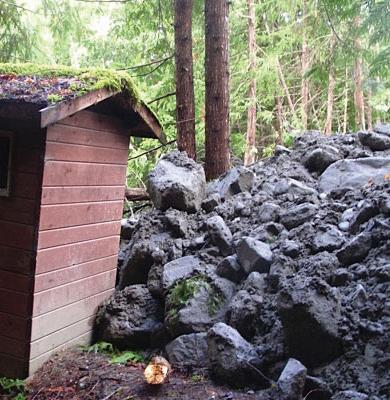
The scale of the 2013 slide prompted the provincial government to commission a geotechnical report on the area. The results painted an expensive picture, with estimates for needed debris mitigation efforts ranging from $4 million for increasing the capacity of the existing channel to $31 million for a debris retention barrier on the creek’s fan that could handle up to 300,000-cubic-metre debris flows.
“We’ve had two major slides in 2010 or 2013 that didn’t hurt anybody, but they certainly created a real risk, and in one case, it destroyed a truck,” said Gary Young, president of the LLE strata.
For nearly a decade, the SLRD and the LLE strata have been developing solutions to help address the community’s landslide risks.
The work took a step forward on Dec. 14, as directors adopted new bylaws that established a local service area to design, construct, operate and maintain a debris flow mitigation structure for Catiline Creek, which will mitigate risk to the community.
Directors also approved a $4-million loan authorization to fund the work, which will substantially help improve the community’s safety once complete.
Residents approved the local service taxation area, with a substantial majority in favour. “We orchestrated a petition process,

and we got 85 per cent, so it’s obvious that the community is totally behind getting this project fixed, getting the community safe, and letting us return to normal life,” Young said.
The service area establishment allows the SLRD to help the community take on some of the project’s cost over an extended period.
“In this case, they need a debris flow barrier to be built. It’s going to be very expensive, but it will allow these homes to build this without it taking 25 years to save the money. They can front-load it with a loan and then pay it back over time,” said SLRD chair Jen Ford.
The estimated cost for designing and constructing the debris flow mitigation structure and excavation work in Catiline Creek is about $9,024,233, of which $4 million is the amount of debt the SLRD will borrow to complete the project either entirely or in phases.
Of the $9 million, a portion of the total cost will be covered by the Ministry of Forests, Lands and Natural Resource Operation (MFLNRO), as it will have to replace a bridge on the forest service road that crosses the creek.
“It is about a $7-million project, or a little over $7 million plus the participation of [MFLNRO], because they have to do work on the forest service road,” Young said.
The completion timeline ranges from one to four years for the mitigation structure, including the timing of federal grant applications, permits and the need for fairweather windows when excavation work begins on the creek.
Young believes with some of the landslide risks abated, the lakeside community’s property values will increase as the risk of damage reduces and more people will move to the community.
“It’s fair to say, and I think the province recognizes this, our land costs are depressed by the risk associated with Catiline Creek,” he said. “So once Catiline Creek is finished, I’m convinced we will see significantly more people moving here full-time.” n
YOU'RE INVITED TO
THE PEMBERTON & DISTRICT PUBLIC LIBRARY’S

AGM
We invite ever yone to attend our our Annual General Meeting on Tuesday, Januar y 31st at 7 pm Come with your questions, meet the Librar y Board, and discover how the librar y has navigated the challenges of the past year
JOIN THE LIBRARY BOARD
Do you love the librar y? Can you spare approximately 2 hours a month? Why not become a Librar y board member and help shape the future of the librar y! Help us connect and inspire our community through ideas, programs and technology
To learn more, please email Emma Gillis at egillis@pember tonlibrar y.ca
DATE:

Tuesday, Januar y 31st 2023 TIME: 7:00 PM
VENUE:


At the Pember ton & District Public Librar y
Phone: 604-894-6916
Email: info@pember tonlibrar y.ca
Website: pember tonlibrar y.ca
NEWS PEMBERTON
SLIDE RISK The aftermath of a 2013 landslide near the Lillooet Lake Estates community.
JANUARY 19, 2023 25
FILE PHOTO
NOTICE
2023 COMMUNITY ENRICHMENT PROGRAM
The Resort Municipality of Whistler (RMOW) will be accepting Community Enrichment Program (CEP) applications from community groups looking for financial assistance for 2023 The application period runs from January 25 to February 15, 2023.

The CEP provides funding to not-for-profit organizations or societies based within Whistler that are considered by Council to be contributing to the general interest and advantage of the municipality The categories include ‘Environment ’ , ‘Social Services’, ‘Community Services, ‘Recreation and Sport ’ or ‘Arts and Culture’ Each interested community group is required to complete a Grant Application Form and present to Council at a Committee of the Whole Meeting on March 7, 2023 All approved funding will be issued no later than April 30, 2023 Grant Application Forms are available at www.whistler.ca/cep or at the reception desk of the Whistler Municipal Hall, Monday to Friday, from 8 a.m. to 4:30 p.m.

Fossil gas is not healthy for children and other living things
COOKING WITH GAS has some advantages over cooking on conventional electric stoves, as gas stoves heat and cool instantly. But it’s not difficult to prepare amazing meals on an electric range, and efficient induction ranges offer even more versatility than gas—without the problems.
Those problems are significant, from household pollution to global heating. Gas stoves release dangerous pollutants into
BY DAVID SUZUKI
homes, buildings and the atmosphere, including nitrogen dioxide, carbon monoxide, formaldehyde and particulate matter.
A recent analysis of 27 studies on the effects of gas appliances on children concluded 12.7 per cent of current childhood asthma in the U.S. can be attributed to gas stove use— ranging from three per cent in Florida to 21.1 per cent in Illinois. (The percentage of homes with gas stoves is much higher in Illinois than in Florida.) About 40 million U.S. households, 38 per cent, have gas stoves.
The U.S. Environmental Protection Agency found nitrogen dioxide concentrations are 50- to 400-per-cent higher in homes with gas stoves than homes with electric appliances.
Nitrogen dioxide can cause cardiovascular and respiratory problems and exacerbate illnesses like flu and COVID-19. As a Vox article notes, “Outside, the EPA would consider the level of NO2 produced by the stove illegal. Inside, though, there is no regulation.”
Those efforts are heating up as many jurisdictions consider banning gas stoves for new homes and buildings. The tactics are wideranging: massive ad and “influencer” campaigns, fake grassroots groups and supporters (known as “astroturfing”) to support gas over electric, lobbying politicians and, sometimes, outright threats. Even the term “natural gas” was coined back in the 1930s as a way to portray it as a clean, affordable fuel. As a Mother Jones article points out, industry also adopted the slogan “cooking with gas” in the 1930s.
Industry argues proper ventilation will resolve indoor pollution issues. Putting aside the fact that this just moves pollution outdoors, most jurisdictions don’t require venting that would keep indoor air pure. Many people can’t afford to install adequate range hoods and fans, and renters often have no say.
The advantages of cooking with gas over conventional electric are mostly about convenience, and newer induction stoves, which use magnetics to heat, are more efficient, safer and better for indoor and outdoor environments. They’re also not subject to the volatility of fossil fuel markets.
However, shifting to electricity in all areas of our lives also means using cleaner sources, such as wind and solar. The main disadvantage of induction stoves is that they don’t work with all types of cookware— including copper and aluminum—but even that can be overcome by placing those pots and pans on a suitable metal heat plate.
Not everyone can immediately replace their polluting gas appliance, but incentives, regulations and building codes can ensure gas becomes a thing of the past. Of course, if you continue to use a gas stove, you should vent
Health issues around gas appliances have
Gas furnaces and water heaters cause less indoor air pollution because many jurisdictions require them to be vented outside—contributing to outdoor air pollution and climate change. (Research shows buildings in California emit more nitrogen oxide than power plants, and almost as much as cars.)
So-called “natural” gas is almost entirely methane, a greenhouse gas pollutant about 80 times more potent than carbon dioxide over the short term. All along the supply chain, from extraction and production to transportation and use, considerable amounts of it escape into the atmosphere.
Health issues around gas appliances have been known since the 1980s. But as with other problems fossil fuels cause, industry has put considerable resources into downplaying or denying the dangers, and into promoting gas appliances.
to the outside, or at least keep windows open while using it.
As with fossil fuels wastefully burned in cars, gas for cooking was never really about efficiency or affordability. The goal was to get people to buy and burn more to enrich the most profitable industry in history. Instead of recognizing the true value of these limited stores of concentrated solar energy that took millennia to create, our growth-driven economic system has long relied on burning them up as quickly as possible.
It’s time to change that, for the health of our children, ourselves and the planet.
David Suzuki is a scientist, broadcaster, author and co-founder of the David Suzuki Foundation. Written with contributions from David Suzuki Foundation Senior Writer and Editor Ian Hanington. ■

SCIENCE MATTERS
been known since the 1980s.
26 JANUARY 19, 2023
Email:
Completed applications must be
No late applications will
accepted To learn more, visit whistler
Resort Municipality of Whistler whistler.ca Mobile IV Therapy www.whistlerrevive.com 1-604-259-1206 Glacier Media Digital experts help businesses succeed online. Contact your Sales representative at Pique Newsmagazine today for a free digital audit Get noticed! • Social • Google • Websites • Programmatic • SEO/SEM • Sponsored content 604-938-0202 sales@piquenewsmagazine.com
Please submit applications to: Legislative Services Department, RMOW, 4325 Blackcomb Way Whistler, BC V8E 0X5 Phone: 604-935-8117
corporate@whistler ca
received by 4 p m , February 15, 2023
be
ca/cep
The January reveal

YEARS AGO, when I worked as a ski instructor, there were fewer times throughout the year that I loved more than the week after the holidays had ended. It was usually around the fourth day of January when all the holiday skier visits had died down, the southbound procession of cars crawling their way back to work with a hefty New Year’s hangover. The
BY VINCE SHULEY
post-holiday departure and a welcome end to 14 (or more) straight days of hospitality work indicated that it was now time for the locals to enjoy the mountain once more. No stressful schedules at your two or three jobs, no lift lines and no worries except how much energy you had to ski all that January pow.
Those were awesome years, but time has a tendency to give you the nudge to try things differently. That doesn’t necessarily mean leaving Whistler in the dust and trying to live somewhere else.
However, the hands of many folks are getting forced to do just that with the lack of housing and affordability in our beloved community. The dream of all-you-can-eat midweek skiing is still very much alive for many in Whistler, some of who actually managed to balance that with flourishing careers. But when your ski squad slowly morphs towards a
group of weekender dads/moms and your job no longer accepts the 20-centimetre rule as a valid reason for absence, skiing the weekend might be the only recourse.
And that’s OK. When you’ve had a season pass for the last 15 years or more, involuntarily substituting powder days for other stuff going on in your life gets (a bit) easier to stomach.
With this perspective, I’ve started to notice a few trends among local skiers. A few of these archetypes have already been well documented in ski town culture, but I’ll describe them here for your reading entertainment nonetheless.
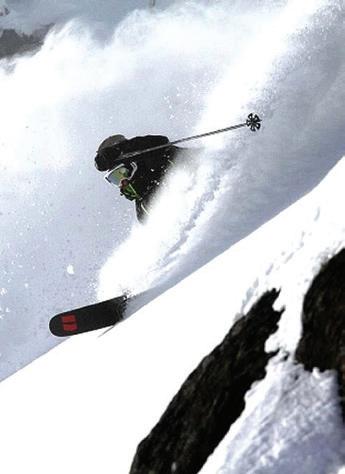
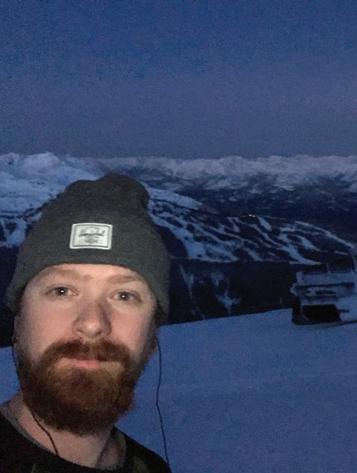

THE VERTICAL OPTIMIZER
If you ain’t skiing downhill, you’re wasting time. This efficiency expert is constantly monitoring the lift-line wait times on the Epic Mix app, steering clear of long lift lines in favour of more and longer laps. Skiing on sunny or powder weekends presents a particular challenge for the Vertical Optimizer, who issues lots of recommendations for bypassing a busy Crystal Chair or Jersey Cream and sliding down to Excelerator instead. If Excelerator is busy, they may even go full controversial and ski down to Blackcomb Base, after the initial upload crowds have dispersed, of course. Friends will usually offer Vertical Optimizer a chill pill.
THE PATIENT POWDER HARVESTER
The Harvester is the proud opposite of the
Vertical Optimizer, electing instead to get ahead of the crowds rather than avoid them altogether. This means lots of early starts to maximize mid-mountain powder before waiting it out near the front of the corral until the alpine lifts open. Once that alpine pow is harvested, they don’t mind heading home in place of waiting in line to ski in tracks. Quality over quantity is the mantra of the Harvester, and for this reason, they will often ski alone. Other people just don’t seem to get it.
THE SOCIAL SLIDER
The Social Slider genuinely enjoys skiing, but never really sees the point if there aren’t friends around to enjoy it with. Busy weekends and snarled uploads don’t really matter, it just lends more time to on-mountain conversations. Coffee breaks are essential and après is non-negotiable, the latter providing even more opportunities to run into friends and acquaintances.
THE DAYS COUNTER
The number of days skied per season is oft considered the benchmark of legit ski bums. The Days Counter won’t stop booting up in the mornings until they’ve hit triple digits on the season. Skiing through arctic outflows, Pineapple Expresses and unconscionably busy days on the hill, the Days Counter may well consider their number of days on the mountain more important than the quality or quantity of actual skiing.
M E E T O U R C R E W
FAIR WEATHER FLYER
Leave the pow days for the keeners. Skiing in the sunshine with blue sky summit selfies is the name of the game. Since the Fair Weather Flyer lives on B.C.’s coast and not in California or Colorado, they ultimately ski fewer days than their peers.
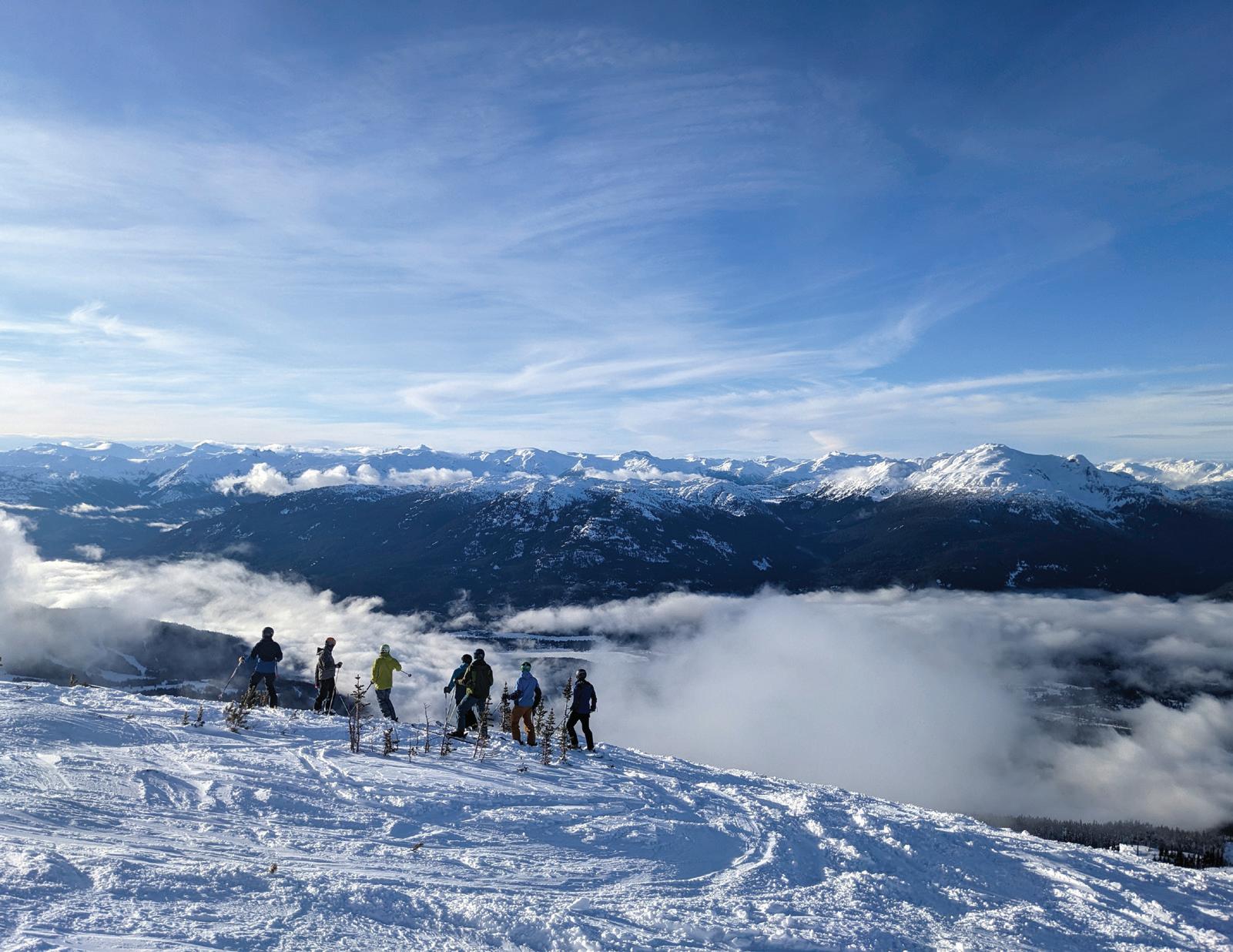
THE ONE AND DONE’R
Gondolas, not chair lifts. Umbrella Bar, not safety bar. The One and Done’r lives for the one long lap from the Roundhouse to the valley—after a tipple at Seppos Bar of course (or Umbrella Bar if you’re feeling fancy).
THE ACHIEVEMENT UNLOCKER
The skiing equivalent of an obsessed gamer, the Achievement Unlocker has skied every run on the trail map, skied every line in Finestone and Hodder’s Advanced Guide to Whistler Blackcomb and even managed to tick off most (or all) of the achievements in the Whistler Blackcomb Live app before it was decommissioned and replaced with the aforementioned and inferior Epic Mix app. What does January skiing reveal about you?
Vince Shuley identifies as a Patient Powder Harvester. For questions, comments or suggestions for The Outsider email vince.shuley@gmail.com or Instagram @whis_vince ■
THE OUTSIDER
JANUARY 19, 2023 27
By Róisín Cullen
After two pandemic years that largely kept foreign workers at home, Whistler’s rental market is as tight as it’s possibly ever been. Horror stories abound of frontline staff contending with unreasonable rental rates and, sometimes, the even-more unreasonable demands of overzealous landlords. Droves of young skiers and boarders land here, wide-eyed and hungry for adventure, inspired by the tall tales and jaw-dropping Instagram photos of friends and fellow countrymen who’ve taken the plunge.
But is it the Whistler dream they’re being sold, or a bill of goods? Pique spoke with a batch of fresh locals here for their first ski season to find out.

“I moved to Canada because of the war in Ukraine. I was lucky to be out of my country when everything started. In 2015, I started my duty as a seafarer with Carnival Cruise Line. Whistler is one of the best spots for tourism in Canada, so it was an obvious choice with my experience,” he says. “However, it was more a feeling that made me need to move to the Whistler area. I didn’t know anything was wrong with the housing situation until a potential employer ended an interview when he heard I didn’t have accommodation.”
Boiko eventually found a place in Pemberton, but his commute to work has become more and more treacherous as the weeks roll on. He worries each night that Highway 99 will be closed the following morning due to poor weather conditions. He longs to move in with his girlfriend so they can start making a life here in Canada, thousands of miles away from their war-stricken home.
many obstacles in his way won’t deter him.
“There’s always a good side. There are a lot of nice and sweet people, like my girlfriend’s neighbours in staff housing. They are always helpful and do their best to help us out,” Boiko says. “My co-workers in the Club Wyndham Cascade Lodge are the best team I’ve ever had in my entire life. Everyone makes you feel like you are in paradise. We’re not going to try to move anywhere else. We are planning on settling in this area. It’s just a matter of time.”
One of the recent posts to Whistler’s popular housing Facebook group was by Ukrainian refugee, Yurii Boiko. Boiko moved to Canada with his girlfriend Julia to escape the war that broke out nearly a year ago when Russia invaded their homeland. Both have full-time jobs and are eager to settle down in Whistler. However, Boiko now fears this goal is far beyond his reach.
“My girlfriend and I can’t move in together and are paying two separate rents. It’s extremely difficult doing anything, starting from grocery shopping and ending in staying in each other’s places. She’s in staff housing at the moment. I’m feeling annoyed and frustrated. I sent messages to over 20 people posting about housing and got zero replies from landlords,” Boiko says.
“As soon as they put up a post, they get bombarded with millions of messages.”



The Ukrainian has had his fair share of nightmare house viewings, with a particular property in Bayshores immediately coming to mind. “It was $2,000 for a tiny room that you can’t even stand up in. You share a bathroom with three other people,” he says.
Greedy landlords aren’t the only pitfall in Whistler’s tight rental market. Boiko says he has been contacted by more than 20 apparent scammers since he began his hunt for a house. But it hasn’t dampened his enthusiasm for his adopted home. He says his love for Whistler and the people here has instilled in him a determination that cannot be quelled. He insists that the
Joe Brooke forced himself to stop scrolling through local Facebook housing groups before moving from England to Whistler for his first season here. Joe and his friend, Mason Flannery, were well aware of the housing crisis, but decided to push it to the back of their minds for as long as they possibly could. Nothing could have prepared them for the hardship their accommodation search would cause.
“We were stressed before we ever got here. We couldn’t even look at that page. There’s also a part of it that reminds you you’re not the only person going through it. It makes you worry how you are going to find a place out of all these thousands of people,” Brooke says.
“We were well aware of how hard it would be. We knew it was going to be hard but we didn’t know it was going to be like this.”

Like countless others from the U.K. and Ireland, Brooke and Flannery felt compelled to follow their Whistler dream, a dream shared by adventurers from virtually every corner of the world throughout the decades. They feel more people should be aware of the realities that can come with pursuing this dream before packing their bags and booking a one-way flight.
“I don’t think I would have come if I knew how hard it was actually going to be,” Flannery admits. “I came here because of Brexit and I chose Whistler because I had a lot of friends here already. I am a ski instructor so I applied for staff accommodation. It didn’t get approved, so I started looking months in advance.

“We lived in a hostel for the first month. That first month was very depressing. You keep thinking that this is your own choice. Every single day there is a new person in your room. It’s hard to meet a new person every day and put on a happy face when you have so much shit going on.”
A lack of personal and physical space are all too familiar problems for enthusiastic ex-pats arriving in Whistler. Homesickness and jet lag have to be quickly pushed aside as the relentless search for semi-permanent accommodation begins.
“We have a lot of gear because we are here for the season, but you end up living out of a bag and so does everybody else. So, the small bit of the room that is not taken up by beds is taken up by multiple suitcases and skis. We were so stressed all the time,” says Brooke.
“It’s
“We were so down all the time and we were constantly having to worry. You couldn’t relax because you felt like if you weren’t on your phone looking then you’re not doing the most that you can possibly do. We just stayed out all time. We would wake up in the morning and leave and then try and not to go back until bedtime. A hostel is a hostel but it wasn’t even cheap.”

‘I don’t think I would have come if I knew how hard it was actually going to be’
FEATURE STORY
he “Whistler Housing Crisis” Facebook group is flooded daily with pleas for accommodation from strangers all around the world. People of different ages, nationalities, professions and backgrounds all have one thing in common: the Whistler dream. But as requests for spare rooms quickly turn into callouts for floor space, reality sets in. Couples and solo travellers alike are all willing to pay a small fortune for a space on a sofa just to be near the village.
new arrivals to Whistler dream so many ski bums the years, but the resort’s often comes with a rude
Franzi Müller just arrived in Whistler over the holidays, and while she struggled to find accommodation like so many other young workers in town, she said it’s all been worth it.
the vibe and the people. Everyone is so nice and cool with having a rough place to sleep,” she says. Photo by Róisín Cullen
Englishmen Joe Brooke and Mason Flannery knew the hunt for housing in Whistler would be tough, “but we didn’t know it was going to be like this,” Brooke says. Photo by Róisín Cullen
Franzi Müller
28 JANUARY 19, 2023
Joe Brooke and Mason Flannery
Soon enough the best friends became all too familiar with the housing scams so common in Whistler, and the importance of having local connections.

“The first place I actually found was outed as a scam a few hours later in a Facebook group. The people had even been to the house and looked around. They had been to the house and were still going to potentially get scammed,” Mason says. “I also heard of a landlord who took the rent, gave my friends the key, then when they went to the house, it was the wrong key. You don’t know who to trust.”
Taking away the shine

The boys chalk the eventual discovery of their $4,000-permonth studio up to being in the right place at the right time. But a cold December immediately put their new lodgings to the test, forcing the Englishmen to wonder if it was all worthwhile. “For the first few weeks, Joe was living on the window sill. Some mornings, he would wake up, pull the cover off to find frost on the blankets and curtains,” relays Flannery.
The guys say their landlord acknowledges the rent is ridiculously priced, but someone will always be willing to pay it.
Brooke’s back-up plan was to live out of a van he was planning to rent. He quickly learned this alternative was not exactly feasible. “By law, you’re not allowed to stay overnight in a vehicle in Whistler. There are so many people that park just outside of town. I don’t want that uncertainty every night, not knowing if you are going to get caught,” he says.
The pressure of living up to the eminently Instagrammable Whistler dream took its toll on the duo, after having planned their sojourn here for so long. “It’s hard when your friends and family are asking you if you’re enjoying the ski season. You’re expected to say that it’s the best thing ever, but the reality is that you can’t enjoy yourself while you’re looking for housing. It just takes away the shine,” Flannery says.
A group of five Irish arrived in Whistler in October with similar hopes, ready to work hard and play hard. Among them was Sam Power, an elementary teacher eager to take on the world-famous slopes. Sam tells Pique he believed he had given himself more than enough time to get sorted before the season started. “I knew it was pretty difficult to get housing but I didn’t really have a concept of what that meant. I came here thinking I’d get into staff accommodation,” he explains.
The idea of leaving Whistler never truly felt like an option to the group, even as the days left on their Airbnb stay began to dwindle.
“I had talked to people in other ski resorts like Big White,” Power says. “I didn’t really want to go to those, because the Whistler dream was the whole thing. In the Facebook group, people have just given up looking for a couch for a night or two just so they’re not out in the cold. I know people who have been here five or six years with permanent residency in Canada who are only having issues now.”
As it has for years now, the list of ingredients that make


Whistler so special are the reasons so many dream-seekers will put up with such poor living conditions season after season.
“The skiing is sensationally good. The nightlife is incredible. The people are incredible. I’m sleeping in the top bunk of a bunk bed and almost everyone I know is doing the same,” says Power. “You learn to get more economical with your space.”
Sam’s best pal, Cian Murphy, felt unable to relax into Whistler life before all of the gang were safely housed and accounted for. “I had heard a lot about Whistler’s housing crisis five years ago when I lived in Vancouver, but nothing had prepared me for how bad it was going to be this time around. I was stressed to bits because there were five of us trying to get a roof over our heads. The minute you’d get a sniff of a lead, it would go from under your feet,” he says.
The Whistler trade-off

The slipping away of lead upon lead eventually drove Rafael Toledo out of Whistler. A Google search of the best ski resorts on the planet led the Brazilian here in 2017. At the start of this year, he felt the need to call it a day and move to Squamish. It has become harder than ever before to find a bed, he believes.
“I’ve been jumping from house to house like a grasshopper. I don’t think people understand what’s going on here at all until they come over. I really think I would be having a better time anywhere else,” says Toledo.
Toledo shared tales of desperate renters ending up in strange and sometimes dangerous situations. He says one prospective landlord revealed his own strict code of conduct to Toledo in a series of emails. No offensive language, a nightly curfew and three months of “preventative discipline” were included in the deal (which sounds identical to the rules laid out to another local renter who shared his experience with Pique a couple months back: “It’s ‘grim’: Whistler’s housing crisis continues to deteriorate ahead of another winter,” Pique, Nov. 17, 2022). Weekly sitdowns would be arranged between the landlord and Toledo to review his behaviour—and to decide on any “disciplinary action” needed.
The 34-year-old quickly bailed out when he says “moderate corporal punishments” were suggested.
Another young hopeful had been planning for the ski season since May last year but still found the dream of Whistler unattainable. Speaking to Pique anonymously in order to protect her job prospects, the Englishwoman says she had sorted a job and staff accommodation with a local hotel but
was told just 10 days before her arrival that a bed was no longer available. She says the hotel did offer her a job for the spring, leaving her in a strange no-man’s land for the winter. Luckily, she has been living with her sister in Seattle, but worries about the effect a similar cancellation would have on someone without a steadfast support system nearby.
“I had put nearly £2,000 into this move and it all fell apart in one [short email],” she says. “Without staff accommodation, the Whistler rental market is well above my budget, if there is anything at all. Facebook groups are absolutely swamped with people on the verge of homelessness/leaving their travels. It is very depressing.”
While the young woman hopes she can try again for next year’s ski season, she is reluctant to put herself through the same emotional upheaval again. “This experience has affected my mental health in a negative way; living with so many unknowns has been stressful,” she says.
“Luckily, I don’t have any dependants, but this situation could be a lot worse for families. It’s a real crisis. There are so many jobs available, but who will fill them when there are so few rooms and the ones that are available are so beyond reasonable pricing?”
Franzi Müller had just arrived in Whistler when she spoke to Pique over the holidays. The German singer’s adventure was already off to a bad start, having lost all of her luggage on the flight over. However, she was excited to finally see the sparkling Christmas lights in Whistler Village, ski the worldrenowned slopes and reunite with old friends. Müller believes that Whistler’s housing crisis has become par for the course for new arrivals.
“My friends told me that housing was a huge issue but they all said they would instantly do it again. I’ve only ever heard good things and it would have been a shame if the housing crisis had put me off coming. The amount of posts puts you off even posting into the housing Facebook group. There are locals who have been here 15 years who are looking for a place. I feel like they should get somewhere over me,” she says.
Like so many other 20-somethings, Müller doesn’t mind if things don’t always go to plan and is excited to see what comes next. “It’s the vibe and the people. Everyone is so nice and cool with having a rough place to sleep,” she says.
All of those interviewed about their housing struggles in Whistler had so many things in common; a dream, an idealized view of the lifestyle, an acceptance that things do not always turn out the way you hoped, and a strong camaraderie unlike anything any of them had felt before. Similarly, when asked if they would do it all again, the recurring answer was usually the same: “Absolutely.” ■
FEATURE STORY
Whistler are sold the same bums have chased over resort’s housing crisis rude awakening
Brooke and Flannery eventually landed a studio apartment for the winter—at $4,000 a month. During the December cold snap, Brooke would sometimes wake up to find frost on his blankets and curtains. Photo by Róisín Cullen
After five years in Whistler, Brazilian native Rafael Toledo decided it was time to make the move to Squamish. “I don’t think people understand what’s going on here at all until they come over. I really think I would be having a better time anywhere else,” he says.
Photo by Róisín Cullen
JANUARY 19, 2023 29
Rafael Toledo
Canadian luge icon Tristan Walker prepares to take flight in Whistler
THE 2018 OLYMPIC SILVER MEDALLIST HAS RETIRED AND IS BUILDING A CAREER AS A PILOT WITH BLACKCOMB HELICOPTERS
BY DAVID SONG
TRISTAN WALKER knows a thing or two about flying.
After all, he’s spent 21 years on luge sleds, fighting for every thousandth of a second on manicured icy tracks all over the globe. He and longtime doubles partner Justin Snith once raced against the world’s elite each year, hitting speeds of more than 140 kilometres per hour. Walker and Snith are undoubtedly Canada’s most accomplished doubles luge team, with an Olympic silver and four World Championships medals to show for their dedication.
Now 31 years of age, the two hung up their spiked gloves with one final ride last December at the Whistler Sliding Centre (WSC), the site of their first Olympic experience all the way

back in 2010.
The Calgary, Alta. native has begun his next chapter in life: a move to Whistler and a career as a helicopter pilot.
“I want to give the same level of dedication that I put into my athletic career into my next
of supersonic fighter jets on home soil— including the ill-fated Avro Arrow. In a different life, Walker might have joined the Air Force right out of high school and earned his way up to flying CF-18 Hornets out of Cold Lake or Bagotville.
degree needed to become an officer, and in turn, a fighter pilot.
Flying commercial airliners would have been lucrative, but Walker was disinterested in being “stuck in a metal tube for eight hours at a time in a machine that mostly flies itself” nowadays. That’s why he chose instead to be a helicopter pilot.
“Helicopters are hands-on. You’re a proper aviator, and you’re flying the thing the entire time,” he said. “And it’s the type of work [that lets you stay] in the mountains, which is one of the things I really want to do.”
career in aviation,” Walker said. “I want to continue to be a student. A 100-hour pilot knows nothing. You know just enough to be dangerous because someone will let you fly a helicopter, maybe.”
CLEARED FOR TAKEOFF
Lifelong luger he may be, but Walker is also the grandson of Len Bolger, a former Royal Canadian Air Force pilot involved in the research, development and testing
Yet in this universe, Walker became a four-time Olympian who helped teammates Snith, Alex Gough and Sam Edney win silver at the 2018 Olympic Winter Games. That breakthrough in the mixed team relay was just the second piece of Olympic hardware in Luge Canada’s history—the first being Gough’s individual bronze, also earned in PyeongChang. Afterwards, Walker realized that his chance to break the sound barrier from the cockpit of a Hornet had passed him by. He was too old, and didn’t have the university
Walker unofficially retired immediately after the Beijing Winter Olympics and started his commercial helicopter training program last May in Abbotsford. He also reached out to Blackcomb Helicopters via some connections in the luge community, visiting the company’s base in Whistler last summer.
“Whistler has always had a special place in my heart, and I’d love to be able to start my next career in a place that means so much to me,” said Walker.
Clearly, Blackcomb Helicopters was interested, as Walker was offered a job working ground crew during the current heli-skiing season. It’s not a full-time gig, but the veteran luger is grateful for an opportunity to get his
TAKING FLIGHT Tristan Walker (right) and Justin Snith are Canada’s most accomplished doubles luge team, with four World Championships medals and Olympic silver in 2018 to show for their hard work.
PHOTO COURTESY OF LUGE CANADA
“I want to give the same level of dedication ... into my next career in aviation.”
SPORTS THE SCORE 30 JANUARY 19, 2023
- TRISTAN WALKER
foot in the door.
Walker’s ultimate goal is to use his piloting career to help people. For that reason, he is attracted to a company like Blackcomb Helicopters, which offers a myriad of services from heli-skiing and sightseeing to construction, firefighting, medevac and search-and-rescue.

“Everything you need a helicopter for in the Sea to Sky corridor, they will do all of those things,” he remarked.




Having moved to Whistler in early December 2022, Walker plans to do a lot more than just service choppers and fly. He wants to have at least one year as a “ski bum” after being consistently discouraged from potentially risky hobbies during his luge career. By his own admission, he has skied more in the past month then he did in the preceding decade. It’s been quite a change of pace, so far.
A LUGER’S LIFE FOR ME
Walker commenced his luge journey at 10 years of age. He knows Whistler’s track— the fastest of its kind on Earth—as well as anyone, having trained or competed on it for at least a few weeks every year since the venue first opened in 2008. Having begun sliding two years earlier than Snith did, Walker was on the national development team when Snith picked up luge.

Developmental athletes normally help coaches run recruitment camps, and Walker happened to be working at the camp that recruited Snith to the novice team.
Their partnership “clicked from the very beginning.” The Calgarians synergized very well on-track, with Walker known for his powerful start and Snith for his feathery touch in steering the sled with his shoulders. They found immediate success as a pair, winning one bronze at their first career junior World Cup event and another at the 2009 Junior World Championships.
A year later, Walker and Snith placed 15th at their inaugural Olympics. They were 18 years old, the youngest doubles team in Vancouver 2010.
In 2014, coming off a World Championships silver medal the previous year, Canada’s lead duo barely missed the podium—twice—at the Sochi Olympics. Walker and Snith were just five-hundredths of a second away from bronze in doubles, and also finished fourth in team relay alongside Gough and Edney.
Those five-hundredths of a second haunted Walker until he learned to channel his energy into motivation for training instead of stress. Lugers, unlike bobsledders and skeleton racers, are timed down to one onethousandth of a second, and sometimes it is humanly impossible to avoid the kinds of minute mistakes that can keep one off the podium. Therefore, it is paramount to focus on what you can control.
“When you put [your focus] into training, it eases your mind on race day, because you can sit in the handles and say: ‘I spent the entire summer being a good athlete, training as hard as I could, and it gave me the best chance to have a good result on this day,’” Walker said.
SWAN SONG
Despite mulling retirement after PyeongChang 2018, Walker and Snith chose to return for one more quadrennial. They
gave “absolutely everything they could’’ to try for another Olympic medal in Beijing last February, but ended up seventh in doubles and sixth in team relay. At that point, both knew that it was time to step away from competitive luge.
“Because we knew that we put in everything that we possibly had to [race in Beijing], that was enough to be like, yeah, this is a good time to wrap it up,” Walker said.
Make no mistake, though—he isn’t done with sliding. In addition to his Blackcomb Helicopters job, Walker has joined fellow Canadian luger Reid Watts and fourtime Olympic bobsledder Chris Spring as passenger bobsled pilots who drive guests down the world’s fastest ice at WSC. Walker has (very tentatively) toyed with the idea of packing on more muscle to pursue bobsled competitively, but in his words, that’s a “really, really hard ‘maybe.’”
Above all, Walker takes heart knowing that the future of Luge Canada is in good hands with Devin Wardrope and Cole Zajanski, the young Calgarians who nearly usurped him and Snith as the Canadian doubles team in Beijing. The women are also well-represented by Sea to Sky locals Trinity Ellis, Caitlin Nash and Natalie Corless, among others, and the team remains as closely-knit as it was during Walker’s prime.
“We’re like a little family that travels the world together, and so, being able to see our teammates succeed and know that they’re cheering us on as well just really boosts the mood,” said Nash on Dec. 10 after a World Cup event in Whistler.
“That [kind of camaraderie] is something that I really hope continues, because it’s something that Justin and I really wanted to leave behind, culture-wise,” Walker said. “You’re racing against your teammates quite often in a sport like luge, but … it just elevates everybody when you have a good team dynamic.
“And [Nash] is right: it’s like a family.” n
Whistler Nordic Ski Club





Race Series
Classic Only, Cross Country Connection will provide complimentary classic skis to any participant Register: 6:00pm at the Passive House Race Start: 6:30pm Bring a headlamp and $2 Next Toonie: January 26 at Lost Lake Sponsors:







SPORTS THE SCORE
EARLY DAYS An 18-year-old Tristan Walker prepares to compete in Vancouver during the 2010 Olympic Winter Games.
JANUARY 19, 2023 31 F U N D I N G M A D E P O S S I B L E T H A N K S T O T H E G O U D G E F A M I L Y F O U N D A T I O N whistlerhealthcarefoundation org C A L L F O R H E A L T H C A R E F U N D I N G A P P L I C A T I O N S D E A D L I N E : F E B 2 8 , 2 0 2 3 WWW.WHISTLERLAWYER.CA adam@whistlerlawyer.ca | 604.905.5180
PHOTO COURTESY OF LUGE CANADA
Membership
required, please visit www whistlernordics com
is
Toonie
Toonie #2: Jan 19 at Lost Lake
Beans, beans the wonderful fruit…
TURNS OUT THAT NURSERY-SCHOOL RHYME CONTAINS REAL WISDOM FOR LIVING LONGER
Beans, beans the wonderful fruit;
The more you eat, the more you toot; The more you toot, the better you feel; Beans, beans at every meal.
I KNOW, I KNOW. Some people say “Beans, beans the musical fruit…” especially after Bart sang that version of the classic nursery-school
BY GLENDA BARTOSH
The Simpsons. And sometimes the ending is different. Either way, the version above is the one I grew up with in Alberta, where kids from nine to 90 loved to fart around about farts.
But how about this? Those wonderful beans, and other legumes, along with lots of veggies, no meat, little booze, and long periods of eating nothing at all, could be your ticket for literally adding years to your life expectancy. Just what you needed to shore up those slip-sliding New Year’s resolutions, right?
A huge study done by the University of Bergen, Norway that was based on more than a human lifespan of research into the body’s aging process really opened my eyes when I
read about it recently in Britain’s top science magazine, New Scientist. It showed that life expectancy can be increased by 10 or more years, simply by following a new diet based on different choices—ones that increase metabolic health and reduce your chances of illness, mainly cardiovascular diseases.
Basically, you move away from a typical Western diet—where the average daily caloric intake from 1970 to 2009 increased by about 20 per cent—especially by cutting out red and processed meats, dairy products, sugary drinks and refined grains, and move to one with more beans and other legumes, like lentils and chickpeas, along with whole grains, fish, fruit, veggies and a handful of nuts.
The biggest gains, for both men and women, were had by eating more legumes (those beans!), more whole grains and nuts, and less red and processed meat.
Similar studies have been done, but this Norwegian one stands out for its extensive reach, practicality and solid conclusions. While 20-year-olds could see extensions of up to 13 years by following the longevity diet, even people aged 60 could increase their life expectancy by eight years. There’s also a modified version—the “feasibility approach” diet—which people might be more likely to stick to.
To make things easy, the U of Bergen team has created an online calculator called Food4HealthyLife. You can quickly personalize it to learn how dietary changes will impact your longevity. (Note that you should never decrease your caloric intake to the point where it damages your health, and always work with your doctor when changing your diet.)
You can also find lots of solid scientific evidence out there that supports consuming fewer calories overall to extend life expectancy, such as CALERIE (Comprehensive Assessment of Long-term Effects of Reducing Intake of Energy), and things like periodic fasting or fasting-mimicking diets, all aimed at good health and living longer.
KNOW YOUR LIMIT, STAY WITHIN IT
Your body mass index, or BMI, is a simple ratio that uses your weight and height to provide an estimate of body fat. It’s calculated using your weight divided by your height, squared.
You likely know your height. As for your weight, which often varies, especially this time of year, the best way to weigh yourself is naked as a jaybird. Sometimes that’s tough to do, though, so my doctor says subtract five pounds, or 2.25 kg., when you’re fully clothed, shoes on. A pair of shoes averages two pounds, or a kilo, and our clothing comes in around two-plus pounds, or 1 to 1.5 kilos. (Maybe that’s why we feel so free in the tropics—we don’t have to lug all that extra weight around.)
Next, check out your BMI. Diabetes Canada offers a good online calculator. Then go to Health Canada’s website where you’ll find a BMI nomogram—a diagram representing the relations between three or more variable quantities by a number of scales—to learn your risk for developing health problems.
Whatever references you use, it’s never “one size fits all.” Pregnant or lactating women need to use appropriate calculators (there’s one on the Health Canada site). And some good sites
accommodate various ethnic origins.
You also need to allow for age. On the young end, Health Canada’s nomogram doesn’t apply to anyone under 18. Like in my teens, I was the same height I am now—healthy, but skinny as a beanpole. At 98 pounds, though, I would have been “severely underweight” as an adult—and “very unhealthy.”
At the other end of the age scale, Health Canada says that for anyone 65 and over, the normal range for a BMI can start slightly above that shown (18.8), and extend into the overweight range, which starts at 25. In short, when you cross a certain age threshold, you can still be healthy with “a little extra padding” as just about anyone I know over a certain age likes to say.

Once you know your normal BMI limit, stay within it. Remember—restricting calories has been shown to extend the health span and lifespan of every organism studied, from yeast to monkeys.
For instance, New Scientist reports that when calories are restricted for mice they can live up to 50 per cent longer than average. Mind you, it was a huge restriction (60 per cent)—something most people would have a hard time doing for any length of time, plus the mouse diet had to be supplemented with lots of nutrients.
Still, if we could replicate that increase in humans, we’d see a lifespan of about 120 years—something that sounds pretty darn good to a lot of people, especially those of a certain age.
Glenda Bartosh is an award-winning journalist who would love to live 300 years. n

FORK IN THE ROAD
BLOWN AWAY Regularly consuming legumes like beans can add years to your lifespan, according to a new study out of Norway. GETTY IMAGES
32 JANUARY 19, 2023
p.m.



p.m. Katrina
p.m. Alex
fitness classes have a separate fee and a defined start and end date. Pre-registration is required for the entire set of classes.



F Spin 6:15-7:15 p.m. Marie-Anne



F Spin 6:15-7:15 p.m. Courtney

Yoga Roll & Release 8-9

F Spin 6:15-7:15 p.m. Alex
I Zumba 6:30-7:30 p.m. Carmen I

I INCLUDED FITNESS






I Strong Glutes & Core 6:15-7:15 p.m. Carly
These classes are included with your price of admission for no extra charge. Love the corduroy? Let’s save it together. Walking, running, and dog walking must be done elsewhere in Whistler while the Lost Lake Nordic Trails are open. whistler.ca/nordic








ARENA SCHEDULE Please see whistler.ca/recreation for the daily arena hours or call 604-935- PLAY (7529) MEADOW PARK SPORTS CENTRE SWIM • SKATE • SWEAT • SQUASH OPEN DAILY: 6 a.m. to 9 p.m. POOL HOURS* JAN 19 JAN 20 JAN 21 JAN 22 JAN 23 JAN 24 JAN 25 MAIN LAP POOL 6 a.m.-3:45 p.m. & 6-8 p.m. 6 a.m.-3:45 p.m. & 6-8 p.m. 8 a.m.- 4 p.m. 8 a.m.- 4 p.m. 6 a.m. – 3:45 p.m. & 6-8 p.m. 7:45 a.m.-8 p.m. 7:45 a.m.-8 p.m. LEISURE (KIDS) POOL 9-11 a.m. & 4- 8 p.m. 4-8 p.m. 9 a.m.- 4 p.m. 9 a.m.- 4 p.m. 9-11 a.m. & 4-8 p.m. 4-8 p.m. 4-8 p.m. HOT SPOTS 6 a.m.- 8 p.m. 6 a.m. - 8 p.m. 8 a.m. - 4 p.m. 8 a.m. - 4 p.m. 6 a.m. - 8 p.m. 6 a.m.- 8 p.m. 6 a.m.-8 p.m. *Schedule subject to change without notice whistler.ca/recreation | whistler.ca | 604-935-7529 @RMWhistler | @rmwhistler | @rmowhistler FITNESS CLASS SCHEDULE JAN 19 JAN 20 JAN 21 JAN 22 JAN 23 JAN 24 JAN 25 THURSDAY FRIDAY SATURDAY SUNDAY MONDAY TUESDAY WEDNESDAY I Mountain Ready 7:30-8:30 a.m. Anna I Kin Stretch 7:30-8:30 a.m. Elliot I Strong Glutes & Core 7:30-8:30 a.m. Jess I Mountain Ready 7:30-8:30 a.m. Steve I Strength & Cardio 7:30-8:30 a.m. Roos I Strength & Stretch 7:30-8:30 a.m. Roos I Aqua Fit Shallow 8:45-9:45 a.m. Marie-Anne I Aqua Fit Deep 8:45-9:45 a.m. Marie-Anne I Low Impact Strength 9-10 a.m. Mel I Full Body HIIT 9-10 a.m. Alex I Low Impact Strength 9-10 a.m. Hazel R Pilates 9-10 a.m. Erin I Yin & Yang Yoga 9-10 a.m. Heidi I Strength & Stretch 9-10 a.m. Roos I Strength & Cardio 9-10 a.m. Roos I Zumba 10:30-11:30 a.m. Susie I Gentle
Fit 1:30-2:30 p.m. Roos R Mom & Baby 2.0 12-1 p.m. Sara I Zumba 12:15-1:15 p.m. Carmen I Gentle Fit 1:30-2:30 p.m. Sara R Prenatal Fitness 5:30-6:30 p.m. Sara I TRX Mixer 5:15–6 p.m. Mel I Mountain Ready 5:30–6:30
Anna I HIIT Express 5:15-6
F Bike Fit 6:45-7:45
R Pilates 6:45-7:45 p.m. Josie p.m.
Laura
I Slow Flow Yoga 8-9 p.m. Laura classes have a separate fee and allow you to register for classes on the days that fit your schedule.
F FLEXIBLE REGISTRATION Flex-reg’
R REGISTERED FITNESS
Registered
ChasingRivers offers adventure with a dose of vulnerability
WHISTLERITE TAMAR GLOUBERMAN CHRONICLES YEARS AS A WHITEWATER RAFTING GUIDE—THRILL, HEARTBREAK, STRUGGLES AND ALL
BY ALYSSA NOEL
TAMAR GLOUBERMAN’S connection to the past is both a blessing and a curse.
While she was easily able to delve back into memories from her years as a whitewater rafting guide for her new book, that vivid recollection has, at times, trapped her.
“I feel like I live with my past a lot closer than a lot of people do,” she says. “A lot of people are like, ‘That’s ages ago. I can’t believe you haven’t gotten over it.’ In some ways, if you’re writing a memoir, it’s helpful. But if you’re trying to move on with your life, it can be like quicksand.”
That might be true, but it’s certainly a benefit to readers of Chasing Rivers: A Whitewater Life
In the (part-time) Whistlerite’s adventure memoir, the reader is taken along on more than a decade of whitewater guiding trips and other outdoor adventures—some of which sound dreamy and compelling and others that take a dark turn.
But what gives the book its heart is
Glouberman’s vulnerability about her doubts, mental-health struggles, and relationships.
“I got a couple of emails from people saying, ‘Reading your book made me feel less alone. We had very different lives in a lot of ways, but went through some of the same things.’ I think that’s why most people who publish memoirs do it. Part of me was like, ‘Be brave and do it and see. Maybe people won’t relate, but maybe they will.’”
felt very present on the river, enjoying each splash and bounce … By the end I couldn’t believe I’d had qualms about coming back. The way the vibrations of the current travelled from the paddle blade, up the shaft and into my hands made me feel like I’d reconnected with the outside world, instead of hiding in the cocoon I’d spun around myself. I wanted the day to never end.”
While, to this day, Glouberman says raft
really don’t. You wouldn’t have everything you have if you had my job.’”
To that end, part of her motivation for writing the book was to share her unique perspective as a woman who hasn’t gotten married, settled down, and had kids—a trajectory that at the very least would have altered her adventurous career.
“The path of not getting married and having kids and having a life where the outdoors are such a huge part of my life, I don’t read that many books by adult women in that situation. But I know I’m not the only one. I would’ve liked to have had more books like that,” she says.
Ultimately, the book grew out of Glouberman’s thesis from the University of British Columbia’s Creative Writing MFA program. It was that online learning experience—and its somewhat liberating faceless feedback—that gave her the courage to share so many details of her life openly.
Whistler readers in particular will likely recognize their own mountain pursuits in Glouberman’s deep passion for the river— and of course there are direct parallels in her descriptions of multi-day trips deep into the wilderness.
“Every rapid felt like a homecoming,” she writes in the book after time away from the river. “We crashed through holes and waves while keeping everyone inside the raft. I didn’t have that ultra-focus of big rapids but I still
guiding was her favourite job—even more so than an epic-sounding gig guiding tourists in the Galapagos—she doesn’t shy away from its challenges. She wrestles with the enormity of having people’s lives in her hands, and the aftermath when a trip goes terribly wrong.
“I’ve had a lot of amazing jobs and I probably shouldn’t say this, but the one I’ve loved the most is raft guiding,” she says. “Every day in the Galapagos people would say to me, ‘I wish I had your job.’ I’d say, ‘You
“It’s weird writing about your own life,” she says with a laugh. “I don’t know how much I want to share. There’s a lot of things in the story that, until I wrote it down, I hadn’t talked about it with anybody. I don’t know if I want to share this stuff. I’m OK with strangers reading it, but people I know? I still don’t know.”
Glouberman is taking part in a reading event called Chasing Adventure with Squamish author Lisa Duncan at the Whistler Public Library on Feb. 23.
For more, visit whistlerlibrary.ca/events.

n
RUN THE RIVER Whistlerite Tamar Glouberman has released a compelling new adventure memoir, Chasing Rivers: A Whitewater Life, chronicling her years as a whitewater rafting guide.
PHOTO SUBMITTED
“In some ways, if you’re writing a memoir, it’s helpful. But if you’re trying to move on with your life, it can be like quicksand.”
ARTS SCENE 34 JANUARY 19, 2023
- TAMAR GLOUBERMAN
SNOWED IN COMEDY TOUR BRINGS FRESH LAUGHS TO THE MAURY YOUNG ARTS CENTRE ON JAN. 25
BY ALYSSA NOEL
TO SAY THE Snowed In Comedy tour changed Pete Zedlacher’s life isn’t an exaggeration.

Since joining the cross-Canada venture eight years ago, the Ontario-born stand-up comedian has moved out West to Calgary, opted to set acting, writing, and directing aside to focus on his comedy career, and, perhaps most importantly, switched from skiing to snowboarding.
“It’s changed my life,” he confirms. “I was a working comic in Ontario and I was doing some TV writing here and there and wasn’t super happy with the way my career was going. I was fortunate enough to get the call to go on the Snowed In Comedy tour.”
The tour started 14 years ago as an excuse to hit the road for work and snowboard in between, but has since bloomed into a massive endeavour, with 70 stops in towns and cities across the country, taking its four comedians through most of winter right up until spring.
“It’s remarkable. We just finished up some shows in Prince George and Smithers—towns we’ve been coming to for eight years—and hearing that yes, this is the best show yet is a tremendous pat on the back,” Zedlacher says.
Part of the appeal for the tour’s comedians— which include Dan Quinn, Paul Myrehaug, and Erica Sigurdson—is it pushes them to write entirely new sets every year, considering just how many people show up annually.
“At the end of the tour when we do the last show in Halifax, we put that material aside,” Zedlacher says. “There are no repeats, because we have people coming back year after year. Stand-up is not like music where you want to hear the hits.”
While the tour has turned its comedians into minor celebrities (particularly in smaller towns and cities where a comic isn’t likely
to be buying a coffee in line in front of you), Zedlacher has recently decided to spend more time in the U.S. in an attempt to break into the scene south of the border.
“I always look for a good challenge,” he says. “It’s so rare to have a curveball thrown at you this late in the game. It’s challenging and exciting and rewarding to connect with audiences. Some nights I’ve been like, ‘I don’t know what I’m doing.’ But it’s been fun and it’s cool to see different parts of the U.S. that I’ve never seen.”
Of course, it’s also nice to walk onstage in Canada to an audience that knows you and is ready to laugh. And it doesn’t hurt to be hitting all of the country’s top ski resorts, too.
“I started as a skier and these guys are all amazing snowboarders, so I thought, ‘I’m going to switch to snowboarding.’ I’m alpine fluid; I can do skiing and snowboarding,” Zedlacher says.
Perhaps just as enjoyable as hitting the mountains, the group of comedians is pleased to be enjoying a more straightforward tour this year.
“In 2021, we had a half-capacity audience. It was the best we could do. There were interesting challenges in places like Victoria’s Royal Theatre, which is a 1,400 seater and sold out,” Zedlacher recalls.
Organizers came up with a unique solution and rented out a second theatre with two of the comedians performing at one venue and two at the other. Then, at intermission, they switched.
“I can’t believe we pulled it off,” he says. “Now in 2023, we’re finally here and it feels like we’re back. The audiences are electric. People remember how to behave in theatres. It’s very refreshing and it feels good to be back.”
The Snowed In Comedy Tour hits the Maury Young Arts Centre on Wednesday, Jan. 25 at 7:30 p.m.
Tickets are available at snowedincomedytour.com/tour. n
WIN TICKETS TO A HOCKEY GAME



Come in for brunch on Saturdays & Sundays from 11am-2pm to enter to win.
Next game Jan 27th vs Columbus
Crystals
Come in to view our latest shipment

Visit us to learn more about the metaphysical proper ties and healing powers of stones

Across from the Olympic Plaza 604-905-0084 oraclewhistler com

SEEKING APPLICATIONS FOR TRANSPORTATION ADVISORY GROUP
The Resort Municipality of Whistler (RMOW) is seeking qualified applicants to serve in a voluntary capacity on the Transportation Advisory Group (TAG).
The purpose of the Transpor tation Advisory Group is to identify transpor tation related issues and oppor tunities to, from, and within Whistler. Using a social, environmental and economic lens, the TAG provides Council with strategic advice and recommendations regarding the assessment of, planning for, and implementation of transpor tation initiatives for the Resor t Community
Four Citizens-at-Large are appointed to TAG by Council for a two year term and typically meet quar terly for 3 hours during business hours. Download the TAG Terms of Reference at: whistler.ca/committees.
To apply, submit a resume and brief statement highlighting relevant experience and interest in par ticipating on this committee by email to edalsanto@whistler.ca or mail:
Transpor tation Advisory Group c/o Emma DalSanto
Resor t Municipality of Whistler
4325 Blackcomb Way Whistler, BC V8E 0X5
Application deadline: January 31, 2023 at 4:30 p.m.
Resort Municipality of Whistler whistler ca/committees
‘Stand-up is not like music where you want to hear the hits’
SNOWFALL WARNING Comedian Pete Zedlacher is set to hit the stage in Whistler alongside Dan Quinn, Paul Myrehaug, and Erica Sigurdson as part of the Snowed In Comedy Tour on Wednesday, Jan. 25.
ARTS SCENE JANUARY 19, 2023 35
PHOTO BY ROB PERRY
PIQUE’S GUIDE
LITERACY DANCE PARTY WITH IRA PETTLE
Having just released his debut album, A Little Bit, join Ira on Saturday, Jan. 28, from 9 to 10 a.m., as we celebrate Family Literacy Week, with our hands and feet, with original songs and old favourites designed to get bodies moving and voices joining in.
Designed for kids up to six years old and their caregivers, this free concert event will speak to the inner child in everyone!
> Jan. 28, 9 to 10 a.m.





> Pemberton and District Community Centre




> Free, but registration is required at pembertonlibrary.ca.






OUT OF CONTROL WINTER APRÈS
Arts Whistler Live! presents: Comedy Doubleheader—Julie Kim and Katie-Ellen Humphries with guest Henok Meresa.

Join this lineup of award-winning comics for a night of sharp wit and hilarious personal anecdotes as they spread happiness, lighten hearts, and unite through laughter.
> Jan. 28, 7:30 p.m.





> Maury Young Arts Centre





> $25

> Find full details at artswhistler.com/live.

ARTS SCENE LAUGH OUT LIVE!
JAN19-28 ARTS + ENTERTAINMENT VERTICAL LIFE
TOUR 3 From untold stories, unsung heroes and the faces we’ve come to know and love in climbing, this year VLFT3 is bringing a collection of eight short films that has something for everyone. >
> Rainbow Theatre > $20, or $25 at the door; $14 for Core member Find more info at verticallifefilmtour.com. LAUGH OUT LIVE! PRESENTS: AFTER AFTER? A COMEDY VARIETY SHOW @ APRÈS APRÈS! This smorgasbord of improv, stand-up, and sketch comedy paired with huge prize giveaways, videos, and special guests won’t disappoint, though it may have you questioning your overall life choices! > Jan. 24-27; doors at 7 p.m. > Après Après > $25 (one drink included) > laughoutliveshow@gmail.com for more info.
IT COUNT! FAMILY
PHOTO SUBMITTED
FILM
Jan. 19, 6:30 to 10 p.m.
MAKE
TO LOCAL
& NIGHTLIFE Here’s a quick look at some events happening in Whistler this week and beyond. FIND MORE LOCAL EVENT LISTINGS (and submit your own for free!) at piquenewsmagazine.com/local-events 36 JANUARY 19, 2023 Find out more about Vancouver Cocktail Week events and seminars at thealchemistmagazine ca/vcw T H E G O L D E N E R A C O C K T A I L R E V I V A L G A L A I S S P O N S O R E D B Y : March 11, 2023 • 6-7pm VIPs; 7-11pm partygoers Pacific Ballroom, Fairmont Hotel Vancouver, 900 W Georgia St Golden Era Cocktail Revival Gala TICKETS ON SALE NOW AT thealchemistmagazine ca/vcw Take the grand staircase up to one of the most historic and beautiful ballrooms in Vancouver and the marquee event of Vancouver Cocktail Week: The Golden Era Cocktail Revival Gala Raise your glass to the fall of Prohibition and enter the golden era of cocktails at an epic party that takes you on a glamorous journey through tipsy traditions Throughout the ballroom designed in 1939 and with more than 800 hours of hand-painted details stations featuring local bar stars and global brand ambassadors will offer drinks representing different eras in cocktail culture past and present Come early and enjoy our VIP hour, where you can mingle with our international and national VIP guests while enjoying passed canapés and cocktails Following the VIP hour, cheer on the finalists in the World Class Canada bartender competition during their speed-round hour before we announce the 2023 Canadian Bart ender of the Year Then enjoy the food stations, live music and DJ, and cast your bids in the silent auction to support the BC Hospitality Foundation The Golden Era Cocktail Revival Gala is guaranteed to be a night to remember Note that Fairmont Hotel Vancouver will be offering special room rates for the even ng fa rmont com/hotel-vancouver March 5-11, 2023 Massages Body Services Facials Esthetics Medi-Spa Luxury Spa Amenties *Proof of full-time residency in the Sea to Sky (Squamish to Pemberton) required Sea to Sky Locals SAVE 15% off all treatments at The Spa at Nita Lake Lodge. *Excludes RMT - locals flat rate of $155 available www nitalakelodge com/spa @spaatnita 604-966-5715 The Resor t Municipality of Whistler (RMOW) is offering interested par ties the oppor tunity to express their interest in providing constr uction ser vices in the deliver y of the Rainbow Par k Rejuvenation project, located at Rainbow Par k, 5778 Alta Lake Road, Whistler BC The project involves site grading , site amenities and ser vice enhancements, and soft landscaping for the rejuvenated par k For more infor mation please visit whistler ca/bids or new bcbid gov bc ca
EVENTS
Protect you r ho me fro m the s lo p es .
*O f fe r a p p i e s to re g u a r p ri c e of a TELU S S m a r t H o m e S e c u ri t y (“ S H S ”) p a n s exc u d i n g S m a r t C a m e ra S H S p l a n s re q u i re e i th e r a 3 -ye a r o r 5 -ye a r te rm , exc e pt S m a r t C a m e ra a n d S m a r t Au to m ati o n P u s p l a n s w h i c h o n y q u a f y fo r a 3 -ye a r te rm Ava a b l e to ex i s ti n g TELU S o r Ko o d o M o b i t y p o s t- p a i d c o n s u m e r c u s to m e r s w h o a re a l s o s u b s c r b e d to at l e a s t 1 TELU S re s i d e nti a s e r
r b e d to S H
c e a n d h ave n ot
i c e s n th e p a s t 9 0 d ay s C u s to m e r s w i th a n a c ti ve c o n s u m e r TELU S o r Ko o d o M o b i t y p o s t- p a d a c c o u nt w l re c e ve a d i s c o u nt of $1 0/m o nth C u s to m e r s w i th a n a c t ve e g i b l e h o m e s e r v c e w i l re c e i
a
s
u nt of $ 5/m o nth A l l S H S p a n s i n c l u d e TELU S O n l i n e S e c u ri t y (“ TO S ”) TELU S O n l n e S e c u ri t y B a s c (fo r S m a r t C a m e ra a n d S m a r t Au to m at o n P u s p l a n s) o r TELU S O n n e S e c u ri t y S t a n d a rd (fo r S e c u re a n d C o ntro ) D s c o u nt s a re a p p l i e d
TELU S re s e r

S
s th e r g ht to re m ove m o b i l i t y o r h o m e s o l u t o n s d s c o u nt s i f th e c u s to m e r n o l o n g e r m e et s e l g b l i t y re q u i re m e nt s C u rre nt re g u a r p ri c n g c a n b e v i ewe d at te l u s c o m / h o m e s e c u ri t y O f fe r s a n d re g u a r p ri c i n g s u b e c t to c h a n g e w i th o u t n oti c e M i n m u m s y s te m re q u re m e nt s a p p l y Eq u i p m e nt m ay n ot b e a s s h ow n Fi n a l e l i g i b i t y fo r th e s e r v c e s w b e d ete rm i n e d by a l c e n s e d a n d c e r ti fi e d TELU S te c h n i c i a n A c a n c e at o n fe e a p p l i e s fo r e a r y te rm n ati o n of th e 3 -ye a r o r 5 -ye a r s e r v i c e a g re e m e nt e q u a to $1 0/ m o nth fo r th e S m a r t C a m e ra a n d S m a r t Au to m ati o n Pl u s p a n s , a n d $ 35/m o nth fo r th e S e c u re a n d C o ntro p l a n s , m u ti p l i e d by th e n u m b e r of m o nth s re m a i n n g i n th e s e r v i c e a g re e m e nt (w i th a p a r t a l m o nth c o u nti n g a s a fu l l m o nth), p l u s a p p l c a b e t a xe s R e nt a l e q u i p m e nt m u s t b e retu rn e d i n g o o d c o n d i t o n u p o n c a n c e l at o n of s e r v c e oth e r w s e th e re p a c e m e nt c o s t w i l b e c h a rg e d to th e a c c o u nt Profe s s i o n a l n s t a l l ati o n fe e of $150 a p p e s fo r a l l p rofe s s o n a y i n s t a l e d p l a n s a n d c u s to m e r s w h o s u b s c r b e to 1 o r m o re of th e fo l ow i n g s e r v i c e s p o s t- p a i d TELU S M o b i l i t y S m a r t H u b o r H i g h S p e e d I nte rn et Th e p rofe s s i o n a l i n s t a l l ati o n fe e fo r a l l oth e r c u s to m e r s i s $ 4 50 Ad d ti o n a l i n s t a l l ati o n fe e s m ay a p p l y fo r ex tra e q u i p m e nt A $1 0 0 k t fe e i s c h a rg e d o n s e lf- i n s t a l l o rd e r s a n d i s 1 0 0 % refu n d a b l e w h e n s e r v i c e i s a c t vate d w i th i n 3 0 d ay s of o rd e r Th i s i n c l u d e s i n s t a l l ati o n of a u to m at o n a n d s e c u r t y d ev i c e s a p p n s t a at o n a n d a wa l k-te s t w h e re re q u re d O n c e yo u r s e r v i c e s a c ti vate d yo u w i l b e n ot fi e d by e m a i l w i th i n 5 b u s i n e s s d ay s th at th e k i t fe e h a s b e e n a u to m ati c a l l y refu n d e d to yo u r b O f fe r ex p i re s J a n u a r y 15 , 2023 TO S Le g a Te rm s A l S H S p l a n s i n c l u d e TELU S O n l i n e S e c u r t y (“ TO S ”): TELU S O n l i n e S e c u r t y B a s i c (fo r S m a r t C a m e ra a n d S m a r t Au to m at o n P u s p a n s) o r TELU S O n i n e S e c u ri t y S t a n d a rd (fo r S e c u re a n d C o ntro ) N o o n e c a n p reve nt a l l cy b e rc ri m e o r d e nt t y th ef t Ac t vati o n th ro u g h N o r to n Li fe Lo c k s re q u re d N ot a p ro d u c t s s e r v i c e s a n d fe atu re s a re ava i l a b e o n a l d ev i c e s o r o p e rat n g s y s te m s S y s te m re q u i re m e nt i nfo rm at o n o n N o r to n c o m
Plans as low as on a 3-year term.* $18/mo. Call 1 - 855 -255 - 8828 Visit telus.com/SmartHomeSecurit y or see us in-store
v
s u b s c
S s e r v
ve
d
c o
o n th e S H
p l a n a n d
ve
Tracking changes in Whistler—then and now
BY JILLIAN ROBERTS
EVERY DAY, people come into the Whistler Museum and are inspired to share their own stories. “I remember when I was looking at real estate in Whistler in the 1970s,” a visitor recently remarked. “Lots next to the garbage dump were selling for $10,000, but I was scared of bears, so didn’t buy one.”
That garbage dump is where Whistler Village now sits.
A recent favourite was when a longtime local told us about volunteering for a race on Whistler Mountain. One of the chairs fell from the Orange Chair, they recalled, and instead of stopping it and doing tests, volunteers were instructed to hide the chair in the trees so no one would see what had happened.
When Jim McConkey was visiting from Denman Island last year, he casually brought up how ski-boot designer Bob Lange brought him a prototype of a plastic lace-up ski boot to try, back when boots were exclusively made from leather. According to Jim, “I tried it and said, ‘You’re on the right track, but you’ve got to make a buckle boot.’ That was the first plastic boot there was.”
There are so many unique stories about Whistler and the people who call, or have called, this town home. Sixty years ago, there was no skiing on Whistler or Blackcomb mountains; instead, the valley was mainly used for logging and summer tourism, which revolved around fishing.

When Whistler Mountain first opened in 1966, visitors travelled to the lifts on a gravel road that was only plowed once a week. Whistler became a municipality less than 50 years ago, and when it was incorporated there was no sewer or municipal water in the valley, and many people relied on the manual collection of water from lakes or creeks.
Even more recent was the opening of the Whistler Mountain Bike Park. Most people would remember a time before the bike park, and Crankworx, now a global celebration of mountain biking, started in Whistler in 2004.
A lot has changed! We are regularly told
the only thing in Whistler that hasn’t changed since opening are the lift lines. The Whistler Museum and Archives Society launched in 1986 to document these changes, so people could remember a time before skiing. Our mission is to collect, preserve, document, and interpret the natural and human history of mountain life, with an emphasis on Whistler, and to share this with the community to enrich the lives of residents and guests.
Like plenty of other Whistler institutions throughout history, the Whistler Museum is currently housed in a temporary trailer. The trailer that we call home started its life as Whistler’s Canada Post building in Creekside. In 1994 it was moved into the village, and the library occupied it until it found its own permanent home in 2008.
There are a few challenges with our temporary home. Preserving archives and artifacts for future reference and exhibits relies on specific temperature and moisture controls so materials do not degrade. The building that we have currently is hard to keep within these parameters. Storage space is also limited, so much of our collection is kept offsite in uncontrolled environments. This puts the collection at risk, and we would love to keep it under stricter conditions for improved protection, which we could do in a new museum.
A bigger footprint for the museum building will also mean we can share more of Whistler’s stories with the community. Whistler’s history is quite unique, and we have had an outsized global impact for such a small town—we want to be able to protect and celebrate this for generations to come.

On Dec. 6, the Resort Municipality of Whistler agreed to lease municipal land to the museum for a 60-year term to accommodate a new building. Sixty years ago, Whistler was not a ski town, and in another 60 years, who knows what will happen?

Whatever the future looks like, we hope the Whistler Museum will be around to capture

Look out

MUSEUM MUSINGS
and celebrate our history.
n
for more exciting information related to a new museum facility in the coming months.
OPENING DAY Creekside in 1965 prior to the installation of ski lifts on Whistler Mountain.
38 JANUARY 19, 2023
COVID PCR TRAVEL TESTING IN WHISTLER Lifelabs ISO-accredited PCR testing for return travel to China, Asia, etc. Thousands served since 2021, experienced and reliable 24 hour turnaround (samples collected in morning, results returned 24h later) Efficient friendly mobile service - we come to you Run by long-time local ER doctor Clark Lewis www.whistlercovidtest.com We’ve got you covered. Pick up the latest issue of your favourite read on stands throughout Whistler every Thursday
PHOTO COURTESY OF THE WHISTLER MUSEUM
MOBILE





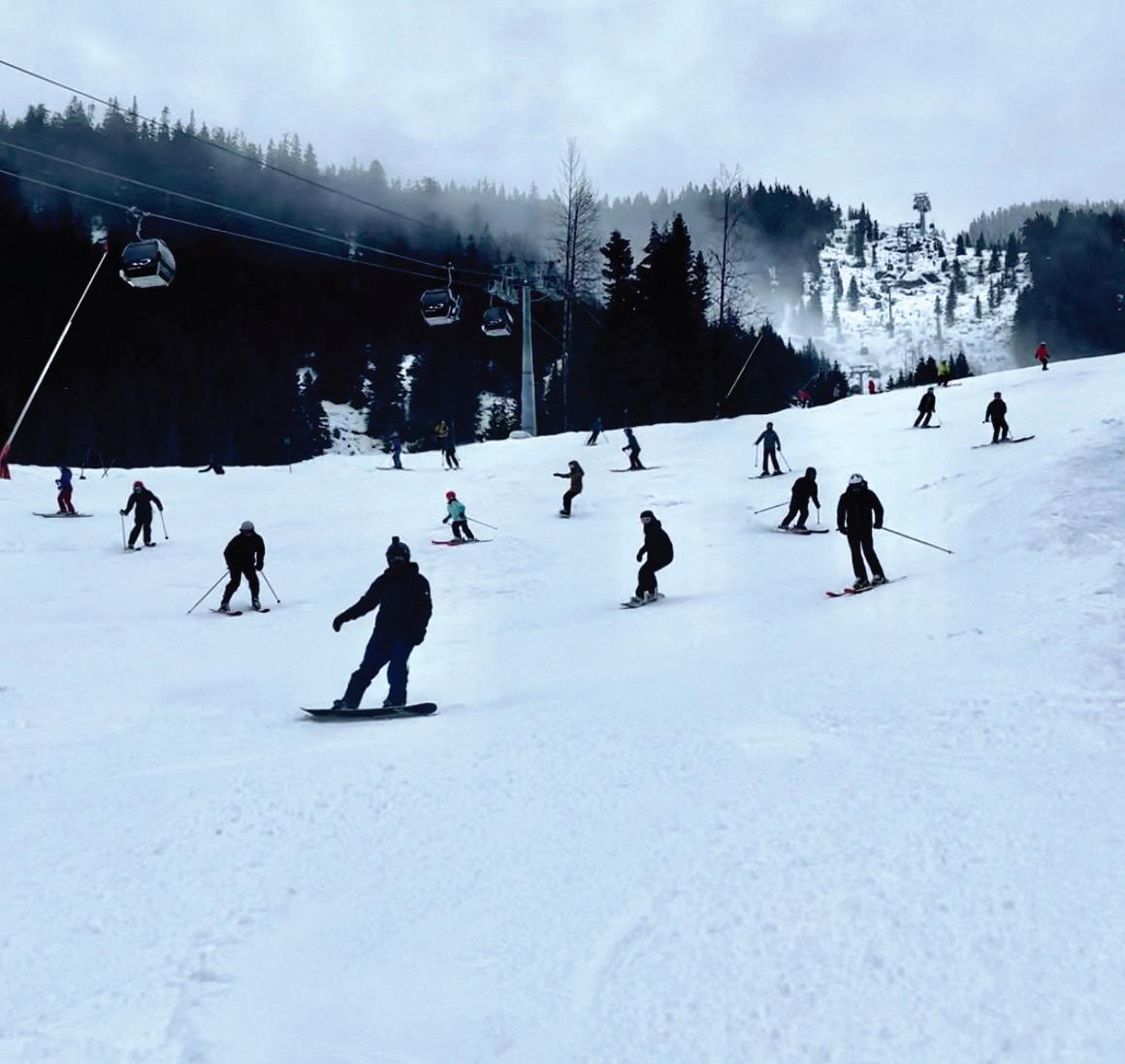



PARTIAL RECALL
1 SLIDING SCALE Views from the Whistler Sliding Centre were on point after the sun popped out over Blackcomb Mountain on Saturday, Jan. 14. PHOTO BY DAVID SONG 2 BUSY DAYS The ski-out to Creekside was a popular place to be on Sunday, Jan. 15, thanks in part to the long weekend for B.C.’s neighbours to the south. PHOTO SUBMITTED 3 BRIGHT LIGHTS Pique sales manager Susan Hutchinson poses with Shelley Quinn, Whistler Adventure School general manager, during the Whistler Chamber’s Vallea Lumina tour on Tuesday evening.
SEND US YOUR PHOTOS! Send your recent snaps to arts@piquenewsmagazine.com 1 2 6 5 4 3 JANUARY 19, 2023 39 Go Sports! 11am - 11pm. Daily. Stay Stinky! 21-4314 Main Street Recycle? Yes or no? Get the BC RECYCLEPEDIA App www.rcbc.ca RECYCLING COUNCIL OF B.C. MEMBER
PHOTO SUBMITTED 4 CHAMBER CHAT Dan Jeffries from Gibbons welcomes attendees to The Adventure Group’s Vallea Lumina Base Camp area at Cougar Mountain during the Whistler Chamber of Commerce’s Chamber après event on Tuesday night, Jan. 17, as Whistler Chamber executive director Louise Walker looks on. PHOTO BY SUSAN HUTCHINSON 5 MAMA MAC Whistle Animals Galore (WAG) resident Macadamia, mom to the adorable little of puppies currently up for adoption at the shelter, is also looking for the perfect family to give her a permanent home. PHOTO SUBMITTED 6 ICE COLD Holly Pywell braved the icy waters of Nita Lake for a cold plunge on Sunday, Jan. 15. PHOTO SUBMITTED
ASTROLOGY

Free Will Astrology
WEEK OF JANUARY 19 BY ROB BREZSNY
ARIES (March 21-April 19): Good news, Aries! During the next episode in the age-old struggle between the Impulsive You and the Farsighted You, I predict the latter will achieve a ringing victory. Hallelujah! I also foresee you overcoming the temptation to quit a project prematurely, and instead pushing on to complete it. There’s more! You will refrain from knocking your head against an obstacle in the vain hope of toppling it. Instead, you will round up helpers to help you wield a battering ram that will produce the desired toppling.
TAURUS (April 20-May 20): You may not have a clear picture of where you’ll be going in the next five years. The detailed master plan that your higher-self devised for you before you were born might even be obscure. But I’m here to tell you that in the coming weeks, a new lucidity can be yours. You can summon an acute instinct about which way is forward, if only you will recognize the subtle ways it’s speaking to you. In fact, I believe you will regularly know what move you should make next so as to expedite your long-term evolution. Life will be rewarding you with mysterious step-by-step guidance. Now please write a short statement affirming your intention to love, honour, and obey your intuition.
GEMINI (May 21-June 20): Do you believe in the existence of guardian angels and spirit guides and ancestors who can intervene on your behalf from the other side of the veil? Do you wonder if maybe your invisible friends from childhood show up in your vicinity now and then to offer you support and kindness? Or how about the animals you loved earlier in your life but who have since passed away? Is it possible their souls have never left you, but are available if you need their affection? Even if your rational mind tells you that none of these possibilities are authentic, Gemini, I suspect you will nevertheless be the beneficiary of their assistance in the coming weeks and months. Their influence will be even more potent if you proceed as if they are real.
CANCER (June 21-July 22): Among your potential strengths as a human being are empathy, sensitivity, and emotional intelligence. You may or may not choose to develop these natural gifts. But if you do, they can be instrumental in helping you achieve the only kind of success that’s really meaningful for you—which is success that your heart and soul love as much as your head and your ego. According to my astrological analysis, you are moving into a phase of your cycle when you will have extra power to ripen your empathy, sensitivity, and emotional intelligence—and thereby enhance your ability to achieve the kind of success that’s meaningful for you.
LEO (July 23-Aug. 22): “Dear Rob the Astrologer: The computer firewall at my youth hostel is blocking your website. I am being told you practise ‘Illegal Folklore and Insurrectionary Fairy Tales.’ What the hell? Can you do anything at your end to get me access to your wonderful horoscopes? Maybe cut back a bit on your Illegal Folklore and Insurrectionary Fairy Tales? Haha. Just kidding. I love that crazy stuff. —Deprived Leo in Ireland.” Dear Deprived: Many of you Leos have lately had problems getting all the Illegal Folklore and Insurrectionary Fairy Tales you need. I hope you will push hard to compensate. In my estimation, you currently have a strong need for dreamy stories that appeal to the Wild Child in you. They’re essential to your mental and spiritual health.
VIRGO (Aug. 23-Sept. 22): In his book A Million Miles in a Thousand Years: What I Learned While Editing My Life , Donald Miller acknowledges that fear can be a “guide to keep us safe.” Being afraid may indeed have its uses and benefits. But Miller adds that it’s also “a manipulative emotion that can trick us into living a boring life.” In my astrological opinion, Virgo, fear will be of service to you—a guide to keep you safe—about nine per cent of the time in 2023. Around 83 per cent
of the time, it will be a manipulative emotion not worth acting on. For the other eight per cent, it will be neither. Please plan accordingly.
LIBRA (Sept. 23-Oct. 22): Select two sticky situations in your world that you would love to reinvent. Let other annoyances and glitches just slide for now. Then cultivate a focused desire to do everything in your power to transform the two awkward or messy circumstances. Proceed as if you will have to do all the work yourself—that nothing will change for the better unless you take full responsibility. If you’re absolutely sure this involves other people altering their behaviour, consider the possibility that maybe your behaviour needs to shift as well.
SCORPIO (Oct. 23-Nov. 21): Three out of four toxic waste dumps in the U.S. are located in predominantly African-American or Latino communities. Two million tons of radioactive uranium tailings have been dumped on Native American lands. Three hundred thousand Latino farm workers in the U.S. suffer from pesticide-related sicknesses every year. These travesties make me furious. More importantly, my rage motivates me to mitigate these travesties, like by educating my readers about them and donating money to groups crusading to fix the problems. In the coming weeks, Scorpio, I hope you will take advantage of your astrological potentials by using your anger constructively, too. Now is a favourable time for you to fight fiercely and tenderly for what’s right.
SAGITTARIUS (Nov. 22-Dec. 21): I predict that love will bring you many AHA! moments in 2023. You can’t fully prepare yourself for them—and that’s a good thing! The epiphanies will be brighter and deeper if they are unexpected. Your motivation to learn the available lessons will be wilder and stronger if you enjoy being surprised. So be ready for lots of entertaining rumbles and reverberations, Sagittarius. The adjustments you will be asked to make will often be strenuous and fun. The inspirations you will be invited to harvest will require you to outgrow some of your previous beliefs about the nature of intimacy and togetherness.
CAPRICORN (Dec. 22-Jan. 19): Some insects are helpful to humans. For example, ladybugs devour aphids, which are highly destructive to crops. Damsel bugs eat the pests called leafhoppers, and lacewings feed on the pernicious nuisances known as mealybugs. I also remind you that some bugs are beautiful, like butterflies, dragonflies, and jeweled beetles. Keep these thoughts in mind, Capricorn, as you contemplate my counsel. Metaphorically speaking, you will have experiences with bugs in the next three weeks. But this won’t be a problem if you ally yourself with the good, helpful, and beautiful bugs.
AQUARIUS (Jan. 20-Feb. 18): What are “brain orgasms?” Can you seek them out and make them happen, or do you have to wait patiently for them to arrive in their own sweet time? When they occur, what should you do? Surrender into them with all your welcome fully unleashed? Or should you question whether they’re real, be suspicious of their blessings, or dismiss them as irrelevant flukes? I encourage you to meditate on questions like these. That will raise your receptivity to the stream of brain orgasms that life will offer you in the coming weeks.
PISCES (Feb. 19-March 20): My Piscean pagan friend
Valie says God is stealthy yet blatant, like a green chameleon perched on a green leaf. After analyzing the astrological omens, I conclude that this is a helpful, allpurpose metaphor for you to use in the coming weeks. I encourage you to be alert for beauty that is hidden in plain sight. See if you can spy the miracles embedded within the ordinary. Ask life to pleasantly blow your mind over and over again. Here’s your phrase of power: open secret
Homework: Ask life to bring you an insight that will help you ameliorate a long-running dilemma. Newsletter. FreeWillAstrology.com.




In addition to this column, Rob Brezsny creates
EXPANDED AUDIO HOROSCOPES
In-depth weekly forecasts designed to inspire and uplift you. To buy access, phone 1-888-499-4425. Once you’ve chosen the Block of Time you like, call 1-888-682-8777 to hear Rob’s forecasts. www.freewillastrology.com

40 JANUARY 19, 2023 Resor t Municipality of Whistler Questions? parksplanningpr ojects@whistler ca We need your play experience and ideas to reimagine Meadow Park. In-Per son Monday, Januar y 23: 2 p m to 4 p m ,Whistler Public Librar y Wednesday, Januar y 25: 3 p m to 5 p m Meadow Park Spor ts Center (arena side) Thursday, Januar y 26: 12 p m to 2 p m , Whistler Public Librar y Online Januar y 23-Februar y 5: Online Feedback Help us make Meadow Park AWESOME! MEADOW PARK rePLAY For more information and to share your ideas: www whistler ca/Engage Scan the QR code with your phone OR Resort Municipality of Whistler Questions? parksplanningprojects@whistler.ca We need your play experience and ideas to reimagine Meadow Park. In-Person Monday, January 23: 2 p.m. to 4 p.m.,Whistler Public Library Wednesday, January 25: 3 p.m. to 5 p.m., Meadow Park Sports Center (arena side) Thursday, January 26: 12 p.m. to 2 p.m., Whistler Public Library Online January 23-February 5: Online Feedback Help us make Meadow Park AWESOME! MEADOW PARK rePLAY For more information and to share your ideas: www.whistler.ca/Engage Scan the QR code with your phone OR
www.whistlerwag.com



RE-USE-IT CENTRE Donations daily 10 am to 4 pm Accepting pre-loved clothing, gear and household items. Shopping daily 10 am to 6 pm 8000 Nesters Road 604-932-1121 RE-BUILD-IT CENTRE Donations daily 10 am to 5 pm Accepting pre-loved furniture, tools and building supplies Shopping daily 10 am to 5 pm 1003 Lynham Road 604-932-1125


Thursdays – Mountain Ready
7:30-8:30 am with Anna
Fridays – Kin Stretch
7:30-8:30 am w Elliot
Saturdays – Zumba
10:30-11:30 am w Susie
Mondays – TRX Mixer
5:15-6 pm w Mel
Tuesdays – Strength & Cardio
7:30-8:30 am w ROOS
Wednesdays – Gentle Fit 1:30- 2:30 pm w Sara

JANUARY 19, 2023 41 Accommodation LONG-TERM RENTALS MULTIPLE LOCATIONS MARKETPLACE FOR SALE - MISC PRE-LOVED RE-LOVED = COMMUNITY LOVE
Visit mywcss.org and our social channels for updates. HOME SERVICES BUILDING AND RENOVATIONS • Kitchen and Bath • Renovations & Repairs • Drywall • Painting • Finishing • Minor Electrical & Plumbing Serving Whistler for over 25 years Wiebe Construction Services Ray Wiebe 604.935.2432 Pat Wiebe 604.902.9300 raymondo99.69@gmail.com FLOORING Open Monday through Friday 8:30 - 4:30 Saturday 10:00 -4:00 Sundays and Evenings by appointment only. 3-1365 Alpha Lake Road Whistler, B.C, V0N1B1 Phone 604-938-1126 email shawcarpet@shaw.ca Family owned & operated SHAW CARPET & FLOOR CENTRE MOVING AND STORAGE Call 604-902-MOVE www.alltimemoving.ca big or small we do it all! HOME SERVICES MOVING AND STORAGE NORTHLANDS STORAGE STORAGE SPACE AVAILABLE BEST PRICES IN WHISTLER FURNITURE, CARS, BOATS & MOTORCYCLES ETC STORAGE AVAILABLE 604.932.1968 ofce@northlandstorage.ca Services HEALTH & WELLBEING SPORTS & ACTIVITIES EMPLOYMENT EMPLOYMENT OPPORTUNITIES FYidoctors-WhistlerFull-Time OpticalAssociateOpportunity Ourclinicislookingforsomeone likeyoutobringyourskillsandexperiencewithyouandjoinus.As anOpticalAssociateyouwillberesponsiblefortheretailandrepair ofeyewearproductsaswellasfollow-upcare.Thisisafull-time, permanentrole.Pleasecontactus atrecruiting@fyidoctors.comor applyonline. WhistlerPersonnelSolutions Full-time,part-time&tempjobs. Nocost,nostrings.604-905-4194 www.whistler-jobs.com DISPLAY ADS DEADLINE FOR PRINT ADS Tuesday 4pm RENT SELL HIRE Classifieds Where locals look Î Secure & scamless Î Fully searchable Î Targeted online community Î Categorised listings Î No reposting Î Trusted by locals Î Make your listing stand out with featured locations CALL OR PLACE YOUR CLASSIFIED WITH OUR ONLINE SERVICE FOR EITHER PRINT OR ONLINE...OR BOTH! Get the added punch to make your business ad standout with a classified display ad. Free ad design, colour options, incentives for ad frequency. Contact a sales rep today. List your accommodation rental in print & online from only $5* a week Sell your stuff Advertising Options Î Packages start with 4 lines of text. Additional text $1/line Î Add one image in print and up to three online as per package level. Î Bolding .50¢/word Î Border $2 * Rates are based on using Pique’s selfserve online application at classifieds. piquenewsmagazine.com piquenewsmagazine.com 604-938-0202 online only Free* for 30 days print & online $11* per week PRINT & ONLINE SELF-SERVE CLASSIFIEDS.PIQUENEWSMAGAZINE.COM
local-events/
piquenewsmagazine.com/
Dont forget to scoop the poop! It’s not fun to step in, or to see
Help keep
clean and pick up after your dog. WHISTLER’S #1 NEWS SOURCE See our full page schedule ad in this issue of Pique for details
around town.
Whistler
Group Fitness Classes






























42 JANUARY 19, 2023 Red Door Bistro needs an Experienced line cook/chef to join our team. Candidates must have at least 5 years cooking experience in upscale restaurant environment. Must have knowledge and experience cooking at grill/sauté station and have basic butchery, vegetable preparation and plating skills. Salary will be based on experience, plus tips and Extended Medical & Dental benefits. Please email resume to info@reddoorbistro.ca Whistler’s premier visitor magazine is on stands now! Look for our Winter 2023 Issue! Find it on select stands and in Whistler hotel rooms. Whistler’s only dedicated wedding magazine. AVAILABLE ON STANDS IN THE SEA TO SKY The ultimate guide to Sea to Sky weddings 2022 Resort Municipality of Whistler whistler.ca/careers Resort Municipality of Whistler Employment Opportunities · Lifeguard/Swim Instructor · Skate Host · Wastewater Treatment Plant Process Supervisor · Labourer I – Village Maintenance · Youth and Public Services Specialist · Legislative and Privacy Coordinator · Program Leader · Lifeguard/Swim Instructor · Solid Waste Technician · Accountant Resort Municipality of Whistler whistler.ca/careers Resort Municipality of Whistler Employment Opportunities · Lifeguard/Swim Instructor · Skate Host · Wastewater Treatment Plant Process Supervisor · Labourer I – Village Maintenance · Youth and Public Services Specialist · Legislative and Privacy Coordinator · Program Leader · Lifeguard/Swim Instructor · Solid Waste Technician · Accountant · General Manager, Climate Action, Planning & Development Services · Administrative Assistant – Fleet · Custodial Guard · Insurance, Litigation and Risk Coordinator · Lifeguard/Swim Instructor (casual) · Lifeguard/Swim Instructor (permanent part time) · Planning Analyst – Policy · Post-Secondary Student Computer Systems Technician – GIS · Program Leader – Myrtle Philip Community Centre · Senior Bylaw Enforcement Officer · Utilities Industrial Electrician Apply online at lordco.com/careers or email employment@lordco.com for more information. WE’RE HIRING IN WHISTLER LORDCO AUTO PARTS IS LOOKING FOR INSIDE SALES REPRESENTATIVE DELIVERY DRIVER WAREHOUSE WORKER CASHIER/CUSTOMER SERVICE @LORDCOPARTS PROUDLY O &Op OPPORTUNITIES: ENGINEERING: Power Engineer Lead Engineer FINANCE: Accounting Manager LOSS PREVENTION: Overnight Loss Prevention Officer HOUSEKEEPING: Room Attendant House Attendant CULINARY: Cook Steward SERVICE EXPRESS: Concierge Workout Attendant Service Express Agent Overnight Service Express Supervisor APPLY HERE ©2022 Marriott International, Inc. All Rights Reserved.
We are currently hiring the following positions for projects in WHISTLER.
We are currently hiring the following positions for projects in WHISTLER.




Journeymen Carpenters (5+ years)
Journeymen Carpenters (5+ years)

Skilled Labourers
Skilled Labourers
We offer competitive pay, a benefits package, company cell phone plan, interesting projects, a collaborative team environment, and a chance to improve your existing skills.
We offer competitive pay, a benefits package, company cell phone plan, interesting projects, a collaborative team environment, and a chance to improve your existing skills.

We are looking for dedicated team players who want to join a rapidly growing company and establish a long-term career in construction.
We are looking for dedicated team players who want to join a rapidly growing company and establish a long-term career in construction.

Please forward your resume to Lea@gccltd.ca
Please forward your resume to Lea@gccltd.ca
Join our team of Plumbers and Gas Fitters

Hiring 3rd and 4th year apprentice or journeyman candidates with experience in service/repair work.

• Offering competitive wages




• Providing fully stocked truck, tools, and phone
• Extended health plan available.
• We can hire skilled foreign workers and support permanent residency applications.
• Short-term accommodation availablefree of charge. Long term housing options available as well. Send your resume to: Dough@spearheadsph.com

JANUARY 19, 2023 43
Free Housing
PLAY HERE » piquenewsmagazine.com/jobs AN OFFICIAL PUBLICATION OF THE 2022-2023 PEMBERTON GUIDE on stands now! Executive Director WE ARE HIRING JOIN OUR TEAM To apply or for more information visit squamishchamber com/aboutus February 3 Application Deadline! The Squamish Chamber of Commerce seeks a talented, forward-thinking Executive Director HOUSEKEEPING, SHUTTLE DRIVERS **class 4 required Flexible Roles & Flexible Hours WE'RE HIRING DELTA WHISTLER VILLAGE SUITES COMPETITIVE RATES & BENEFITS.GLOBAL DISCOUNTS.GLOBAL CAREER. Join the #1 Global Leader in Hospitality. Apply at Jobs.Marriott.com. Contact Barbara.Fraser@deltahotels.com for more information, or drop by and talk to us - we love to meet new people.
Lil’wat Nation General Manager, Community Services
Location: Mount Currie
Status: Full Time – Regular


Reporting to: Chief Administrative Officer
Salary: $110,000 - $130,000 annually

The General Manager of Lil’wat Services is responsible for the overall oversight of five Lil’wat departments: Lil’wat Health and Healing, Lil’wat Community Social Services, Ts’zil, Language and Culture, Community Programs and Community Development. The GM is responsible for working with Department Directors to maximize the amount and quality of services to Lil’wat citizens. This includes providing leadership, financial management, programming and strategy development and execution.
For more information, or to apply for this position please visit our careers page lilwatnation.easyapply.co or email HR@lilwat.ca
www.whistlerwag.com




Protect your pooch this winter!
Antifreeze is highly toxic for pets – check for spills and keep safely stored away from pets.



Ice melters can irritate paws – wipe off paws after walks to avoid dogs ingesting.
White dogs are difficult to see in the snow –keep pets on leash as cars are not able to brake or react quickly in the winter weather.
Lil’wat Nation
Director of Lands and Resources
Location: Ullus Community Complex, Mount Currie, BC
Status: Permanent, Full Time Reporting to: Chief Administrative Officer Salary: $93,475.20 - $101,556
The Director of Lands & Resources is responsible for the overall operations of the Lil’wat Nation Lands and Resources Department including the assertion and protection of Lil’wat Nation rights, title and interests throughout Lil’wat traditional territory. The Department has 8 full time staff plus seasonal on-call field workers. Its role includes engaging with the private section and governing agencies on land use matters, conducting fisheries, environmental, and archaeological field work, managing Lil’wat cultural data and GIS, implementing on-reserve land use policies. The Director will be expected to be proactive and supportive of all Lil’wat Nation lands policies and strategies and work closely with the Chief Administrative Officer and Chiefs and Council regarding territory land use matters.


44 JANUARY 19, 2023 Pastry Opportunities Executive Pastry Chef | Pastry Sous Chef | Pastry Chef de Partie | Overnight Baker YOUR EXPERIENCE & SKILLS: WHAT YOU WILL BE DOING: WHAT IS IN IT FOR YOU: • Creative and passionate about food and customer experience • Ability to work well under pressure in a fast paced environment • Availability to work overnights • Experiment with chocolate, dough, bread making, and viennoiseries • Pastry Kitchen maintenance and cleaning • Ensure quality and freshness of all dessert items • Competitive Benefits • Career Growth Opportunities • Extensive Travel Perks APPLY HERE For more information, or to apply for this position please visit our careers page lilwatnation.easyapply.co/ or email HR@lilwat.ca
We've Got You Covered VISITORS’ GUIDE 2017-2018 FRE
The Museum is currently seeking: Responsible for the development, oversight, and implementation of all marketing and communications efforts of the Audain Art Museum including advertising, social media, media relations and audience development. Competitive


deadline January 27, 2023. For complete





JANUARY 19, 2023 45 We’re hiring in Whistler and Squamish Heavy Duty Equipment Mechanic Civil Construction Labourer/Pipe Layer Gravel Truck Driver Heavy Equipment Operator TO APPLY: New Positions Available! Accounts Payable Accounting Assistant Send your resume to careers@mongoliegrill.com Or drop off your resume in person before 5pm! We are currently hiring CHEFS $25/hour + tips & staff meals. Must have accommodation. JOIN THE MONGOLIE CREW! Whistler’s only dedicated wedding magazine. AVAILABLE ON STANDS IN THE SEA TO SKY WE ARE HIRING! DHD CONSTRUCTION LTD., a Squamish-based, full-service construction and development company is HIRING THE FOLLOWING POSITION: MARKETING COORDINATOR COMPETITIVE SALARY | EXTENDED HEALTH & DENTAL BENEFITS FLEXIBLE WORK ARRANGEMENTS | OPPORTUNITY FOR GROWTH Be a part of the DHD team and their next exciting project – Finch Drive. A 20 acre, master-planned community using modern building technologies to achieve some of Squamish’s most energy efficient, multi-family homes. For more information about DHD, full job description and how to apply, visit www.dhdev.ca DISTRICT OF SQUAMISH Municipal Engineer 1 – Regular Full-Time Recreation Program Instructor 1 – Casual/On-Call Recreation Program Leader – Casual/On-Call Lifeguard 1 – Casual/On-Call IT Support Specialist – Regular Full-Time Executive Assistant to the Chief Administrative Officer - Regular Full-Time Financial Services Specialist – Temporary Full-Time WE ARE HIRING squamish.ca/careers
job
Application
description and to apply visit audainartmuseum.com/employment
Dynamic
Art
salary and benefit program. Marketing Manager Join a
Team of
Lovers!
•
We are looking for Chefs and prep cooks to help us out a couple of days/nights a week, here’s what you need to know/have for each job; Chefs: You need to have experience working on the line, working in a fast-paced environment, good time management and love for cooking good food.



Prep: No experience required, just the love for cooking delicious food. All of our food at Pasta Lupino is made in house, so we take pride in consistency to keep our locals coming back for more!
Pasta Lupino Perks:


- FREE Staff Meal
- Tips (each roll will vary on the amount)
- Great staff parties
- 50% off all internal purchases

- Spirit Ski/Board Pass Program for Whistler Blackcomb
If this sounds a good fit for you, send us an email with your resume, little description about yourself (hobbies and interest) and what type of work you are interested in. Look forward to hearing from you rachel@pastalupino.com
CAREER OPPORTUNITIES
Love a good challenge? Passionate about the place you call home? Tourism Whistler is looking
•
•
• On-site Mentoring and Skills Development
• Extended Health and Dental Benefits
• Positive Work Environment
If you love what you do and have a desire to work on architecturally-beautiful and sophisticated custom homes while growing your career with a renowned Whistler builder, please get in touch. You can send your resume to info@evrfinehomes.com and can view our work at www.evrfinehomes.com.

We look forward to hearing from you!
•
•
What

TO VIEW OUR CAREER OPPORTUNITIES, AND TO APPLY, VISIT US ONLINE AT WHISTLER.COM/CAREERS.


46 JANUARY 19, 2023 NOW HIRING! Our Team enjoys: ü Awesome colleagues ü Flexible schedules ü Training and experience ü Substantial Employee Discount Card & Benefits ü Prime location in Pemberton ü Short commute = less time, more $$$ • FT Front End Supervisor • FT Deli Supervisor Download or fill out our online application at https://www.pembertonsupermarket.com/ about/employment/ or stop by the store and we will give you an application to fill out. You can also email us at jobs@pembertonsupermarket.com or call us at 604-894-3663. • FT Produce - Evenings • FT Meat Cutter We are a proven leader in residential home and estate building in Whistler. We partner with the best architects, designers and trades in the industry. World class, custom projects require commitment and dedication from our partners and our team of craftspeople. We have several significant projects currently in progress across Whistler and we are looking for individuals who are keen to build a rewarding career with a company that values quality workmanship. We are currently hiring for Finish Carpenters, Carpenters, Apprentices, and Labourers. EVR is committed to the long-term retention and skills development of our employees - we are only as good as our team. We are passionate about investing in the future of our workforce, and offer:
Competitive Wages
Annual Tool Allowance
Apprenticeship Training & Tuition Reimbursement
•
•
•
for community-loving, mountainappreciating, environment-respecting people to join our team. Come collaborate with us. We are hiring for the following opportunities:
Director,
Visitor Services
Whistler.com &
Coordinator,
Ask Whistler
Senior Manager, Content Marketing
Month Contract)
(18
Maintenance
Technician/Cleaner
Visitor Centre
Agent
we offer: a flexible schedule offering work-life balance, a commitment to health and wellness, excellent compensation and benefits package, and a great team environment.
Are you looking for some extra work in a fun environment?
PART TIME OR FULL TIME. Well, we have the job for you!








JANUARY 19, 2023 47 Journeyman Electrician position available, Service / Renovation If you thrive in a fast paced, busy and diverse environment with lots of autonomy then this could be the position for you. If you like variety in your work experience, are responsible and would like the opportunity to advance your career, Please send your resumé in confidence to: e. info@sparkelectrical.com We are looking to hire another member to our team at Straightline. Experience in Plumbing is required. Gas Fitting and HVAC would be preferred but not essential. Wages are based on experience, Starting between $38-$50/hr. Part-time or Full-time positions available. Please call 604-935-8771 or email straightlineplumbingandheating@gmail.com for more information. WE OFFER AMAZING EMPLOYEE PERKS & BENEFITS! Life & Leisure Program Extended Health Benefits Free On-Site Staff Parking Free Staff Meals Tuition Reimbursement Program Retirement Savings Program 50% Discount in our Food & Beverage outlets Team Member Travel Discount (including Friends & Family Benefits) CULINARY 1st Cook 2nd Cook Chef de Partie Dishwasher SCAN ME AND APPLY TODAY! Join the Team !! HILTON WHISTLER RESORT & SPA LEADERSHIP POSITIONS Bar & Restaurant Supervisor FOOD & BEVERAGE Restaurant Host Door Attendant HOUSEKEEPING Room Attendant House Attendant FRONT OFFICE Security Officer ARE YOU LOOKING FOR A NEW CAREER IN CONSTRUCTION? WANT TO COME AND WORK FOR A GREAT TEAM WITH LOTS OF ROOM FOR CAREER GROWTH? APPLY TO CONNECT@TMBUILDERS.CA STAFF ACCOMMODATION AVAILABLE, RETENTION BONUS, BENEFITS, FULL TIME WORK We’re Hiring! Labourers, Carpenters, Foreman, Project Managers Apply to: jobs@pembertonvalleylodge.com Employment Opportunities: Part Time or Full Time Night Auditor Flexible Hours, Health Benefits, Casual Environment • HOUSEKEEPING SUPERVISOR Please reply by email: parmstrong@pinnaclehotels.ca The Pinnacle Hotel Whistler has the following positions available: Thank you for your interest. Only those applicants being considered for an interview will be contacted. Please reply with a cover letter and resume to hr@listelhotel.com is now hiring for Guest Service Agent This dynamic role include the following Perks and Benefits: • Extended Benefits • $20 per hour starting wage, plus Commissions • $500 signing bonus, plus Seasonal Bonus available • Discounted F&B and Hotel Stays
ARE YOU A SELF-MOTIVATED INDIVIDUAL LOOKING TO GROW YOUR CAREER IN SQUAMISH?
If you don’t already live in Squamish, you should know it’s one of the most innovative and attractive communities on the West Coast just a short commute from the North Shore of Vancouver. It has a growing worldwide reputation for outdoor recreation with world-class mountain biking, rock climbing, water sports and skiing, boarding and the backcountry in the winter. We’re youthful, engaged and passionate about where we live!
And if you’re a local – well, you know you’re in the right place to forge a career and lucky to call Squamish home.
We’ve got an opportunity to work and truly be a part of this inspired community at its media hub, The Squamish Chief. We’re part of Glacier Media Group and Local News Network, the largest local digital network in Canada. We work with our clients to offer cutting edge solutions like programmatic, Social, SEO, sponsored content and community display advertising on our website – and yes, we reach customers through our trusted newspaper as well. We’ve got media opportunities covered.
Here’s what we’re looking for:
• You have sales experience and are comfortable making cold calls and setting up/ leading meetings with new and existing clients.
• A self-starter with a consultative selling approach working with clients planning both digital and print advertising campaigns.
• Building and maintaining client relationships with your exceptional communication skills comes easy to you.
• You are a goal orientated individual with a positive attitude and a willingness to learn.
• You possess strong organizational skills and have the ability to multitask in a fast paced environment.
Here’s the essentials of what we offer:
• Competitive salary + uncapped commission package.

• Comprehensive health and dental coverage and extended benefits.
• Extensive onboarding training and ongoing support.




Come join us!
Please submit your cover letter and resume in confidence to:
Cathie Greenlees cgreenlees@squamishchief.com
Closing date is February 1, 2023
Lil’wat Nation Employment Opportunities

Ullus Community Center
• Director of Lands & Resources
• General Manager, Community Services
• Snow Removal Technician
• Family Enhancement Worker

• Receptionist
Health & Healing
• Infant Development Program Coordinator
• Homemaker
• Home Care Nurse
• Community Health Nurse
Ts’zil Learning Center
• Administrative Assistant
Lil’wat Business Group
• Cashier (on-call)
• Stock Lead


Xet’olacw Community School
• Prep Cook
Benefits

Pension Plan • Employee Assistance Program Gym facility • Extended Health Benefits Professional Development
Please visit our career page for more information: lilwat.ca/careers/career-opportunities-2/

Vacasa’s forward-thinking approach and industry-leading technology help set us apart as the largest full-service vacation rental company in North America.


We are seeking individuals with a passion for providing exceptional vacation experiences for our Owners and Guests.
We offer competitive wages and benefits: Travel allowance for Squamish/Pemberton-based employees OR Ski Pass/Activity allowance, Extended Medical, RRSP match, Recognition Program, Fun & Safe Work Environment-Great Team, opportunities to grow and more.
Apply online today!
https://www.vacasa.com/careers/positions or email: paul.globisch@vacasa.com or call to find out more details at 604-698-0520
We thank all applicants for their interest but only those selected for an interview will be contacted.
48 JANUARY 19, 2023
BONUS** $1000 (FT) Assistant Guest Service Manager 9-5
flexible
**SIGNING
PM schedule with
days off.
Come be a part of our awesome team as The Squamish Chief’s new Media Account Manager.
Putting people first, every day
Your opportunity
Our Whistler office is looking for an Administrative Assistant to support the team. This is a full time in-office role, and the successful candidate will own the following responsibilities:
• Assemble and file personal and corporate tax returns
• Photocopy, scan, file, data entry, update & maintain records
• Write & distribute correspondence, assist clients
• Reception coverage, greet clients, maintain tidy office/kitchen
• Provide administrative support to staff as required
Your experience and education
• Previous administrative/office experience
• Strong proficiency with Microsoft Office programs
• Ability to work under pressure, manage deadlines and prioritize workload
• Be very detail-oriented - we mean meticulous!
Why BDO?
Our people-first approach to talent has earned us a spot among Canada’s Top 100 Employers for 2022. This recognition is a milestone we’re thrilled to add to our collection of awards for both experienced and student talent experiences.
Total rewards that matter: We pay for performance with competitive total cash compensation that recognizes and rewards your contribution. We provide flexible benefits from day one, and a market-leading personal time off policy. We’re committed to supporting your overall wellness beyond working hours, and provide reimbursement for wellness initiatives that fit your lifestyle.
Everyone counts: We believe every employee should have the opportunity to participate and succeed without barriers.
Ready to make your mark at BDO? Please send your up-to-date resume to whistler@bdo.ca or apply on-line at www.bdo.ca/careers

Thank you to all applicants that apply. We will contact you if you are selected for a personal interview. No phone calls and/ or agencies please. If you are applying for this role, you should have current legal working rights in Canada. As part of our interview process, you may be subject to background inquiries.
We have a rare opportunity to work at one of Canada’s best-read online newsmedia companies, Glacier Media.
You will be part of the Pique Newsmagazine team, a division of Glacier Media. In your role you will consult with local businesses to offer cutting edge marketing solutions: programmatic, social media, SEO, sponsored content and community display advertising on our website and yes, we still reach customers through our trusted newspaper as well.
What we are looking for
• You are comfortable making cold calls and setting up/leading meetings with new and existing clients.
• A self-starter with a consultative selling approach working with clients planning both digital and print advertising campaigns.

• Building and maintaining client relationships with your exceptional communication skills comes easy to you.
• You are a goal orientated individual with a positive attitude and a willingness to learn.
• You possess strong organizational skills and have the ability to multitask in a fast-paced environment.
What we offer
• Competitive salary + uncapped commission package.
• Comprehensive / competitive group health and welfare benefits
• Extensive onboarding training and ongoing support.
Whistler has a worldwide reputation for outdoor recreation and boasts a vibrant village featuring restaurants, bars, retail and more. While this legendary resort is an international mountain sports mecca, it is also a down-to-earth mountain town, where community and culture have forged a unique environment. This opportunity offers you the chance to call a world-class ski hill you own—and if you are a local, well you know you’re in the right place to forge a career and lucky to call Whistler your home.
To apply, please submit your cover letter and resume in confidence to Susan Hutchinson, shutchinson@wplpmedia.com
Closing date: Open until filled.
JANUARY 19, 2023 49
Be a part of an amazing team as our newest Digital Account Representative!
VISITORS’ GUIDE 2017-2018 FRE We've Got You Covered
Sales Associates Positions Available!

At the Liquor Distribution Branch (LDB) our vision of ‘Service. Relationships. Results.’ is all about providing a valued service, building strong relationships with our stakeholders, and achieving greater results for the province.
The LDB is one of two branches of government responsible for the cannabis and liquor industry of B.C. We operate the wholesale distribution of beverage alcohol within the province, as well as the household retail brand of BC Liquor Stores.
We employ nearly 5,000 people in over 200 communities and have been named one of BC’s Top Employers 14 times over for offering exceptional places to work rooted in values of fairness and respect, work-life balance, and inclusion and diversity. We believe that our people are our greatest asset. Being a reputable employer with programs of skills training and professional development are what attract candidates to BC Liquor Stores, while our progressive, forward-thinking culture is why employees with a growth mindset thrive.
Auxiliary positions are on-call, meaning hours of work are not guaranteed and subject to availability. Some auxiliary employees may not initially work a full 35-hour week, but with more hours worked and more seniority gained, more opportunities for more hours of work will follow.
Auxiliary positions are not permanent full-time but can lead to permanent full-time opportunities with a very competitive total compensation package, including a comprehensive pension plan, medical and dental coverage (including massage and physiotherapy), tuition reimbursement and scholarship programs, and access to public service employee benefits including career support services, financial and legal services, and employee and family counselling.
We are dedicated to the highest quality of customer service, delivered with friendliness, individual pride, initiative, and retail passion! If you fit this description and you are prepared to work in a fast-paced environment, we encourage you to apply to become a part of the Whistler area BC Liquor Stores.

To be eligible, applicants must meet the following qualification requirements:
• Be at least 19 years of age
• Be able to legally work in Canada

• Be able to provide excellent customer service
• Be able to communicate effectively and professionally with the public
• Be able to demonstrate aptitude for cashier and related duties, including calculations
• Be able to perform physically demanding work, including lifting 20-25 kg boxes
• Have a valid Serving It Right Certificate™
• A Criminal Record Check is required.
BC Liquor Store Sales Associates may be required to operate a variety of mechanical and hand-operated equipment, in addition to handling large volumes of bottles as part of the LDB’s recycling program.

Rate of Pay as of April 10, 2022: Auxiliary Sales Associate - $20.33 per hour

Seasonal Sales Associate - $18.92 per hour

For exciting and challenging retail opportunities, please apply online at: http://bcliquorstores.prevueaps.ca/pages/openings/ Or apply in person at: Whistler Marketplace 101-4360 Lorimer Rd, Whistler
On November 1, 2021 the BC Public Service announced the COVID-19 Vaccination Policy that defines the conditions and expectations for BC Public Service employees regarding vaccination against COVID-19. Among other possible measures, proof of vaccination will be required. It is a term of acceptance of employment that you agree to comply with all vaccination requirements that apply to the public service. More information can be found here: https://www2.gov.bc.ca/ gov/content/careers-myhr/all-employees/safety-health-well-being/health/covid-19/covid-19vaccination-policy-for-bc-public-service-employees
50 JANUARY 19, 2023
Career Opportunity SEEKING TALENT & CULTURE MANAGER. EXPLORE JOB AND APPLY NOW. SCANDINAVE.COM
















JANUARY 19, 2023 51 Open interviews Mon.-Thurs. from 5- 6 PM, or email your re sume to schedule an alternate interview time at whistler@kegrest aurant s.com •3 -4 FULL TIME LINE CO OK S (eve ning ), up to $27/hr plus tips and benefits for experienc ed cook s •2-3 FULL TIME PR EP CO OK S (day), up to $25/hr plus tips and benefits for experienc ed cook s WE AR E HIRING WH IS TL ER P: Justa Jeskova CHALLENGE RISE TO THE ASSISTANT SUPERINTENDENT Full Time, Year Round The Assistant Superintendent is engaged in the repair, improvement, and daily preparation of the golf course grounds. This includes meeting or exceeding the established standards for guest and employee satisfaction, along with effective cost controls for the Maintenance department. The Assistant Superintendent leads by example by taking a proactive position to all issues concerning the operation of the golf course. What we offer: a fun team and work environment, competitive compensation and benefits package, and access to legendary golf facilities. TO VIEW OUR OPPORTUNITIES, AND TO APPLY, VISIT US ONLINE AT WHISTLERGOLF.COM/CAREERS. Answers EASY#18 31869 2643 16 8291 79 9734 57 1459 59283 #19196278543 382459716 754136829 827615934 513894672 469723185 931582467 248967351 675341298 #20 EASY#20 94 2968 8791 137856 284519 5269 9213 47 915827364 324916785 687543912 143798526 579162843 268435179 852374691 796251438 431689257 Page5of254/11/2005 Glacier Media Digital experts help businesses succeed online. Contact your Sales representative at Pique Newsmagazine today for a free digital audit 604-938-0202 sales@piquenewsmagazine.com Get noticed! • Social • Google • Websites • Programmatic • SEO/SEM • Sponsored content DIRECTOR, WHISTLER.COM & VISITOR SERVICES Full Time, Year Round The Director, Whistler.com and Visitor Services is responsible for maximizing opportunities and resources to achieve revenue targets through all Whistler.com lines of business, including online, call centre and group sales, and also creates visitor servicing strategies that promote guest satisfaction and repeat visitation to the resort. This position requires a strong leader who is sales-driven and resultsoriented, and we are looking for an individual who has progressive and senior sales experience, with the ability to engage and motivate a large team. Excellent communication skills, experience in revenue management, and effective strategic planning and executive skills are required. TO VIEW OUR CAREER OPPORTUNITIES, AND TO APPLY, VISIT US ONLINE AT WHISTLER.COM/CAREERS.


















CALL THE EXPERTS Want to advertise your service on this page? Call Pique at (604) 938-0202, or email sales@piquenewsmagazine.com 52 JANUARY 19 , 2023 DOUG BUSH SURVEY SERVICES LTD DOUGLAS J BUSH AScT, RSIS p: 604-932-3314 c: 604-935-9515 Engineering & construction layout Topographic & site improvement surveys Municipal, volumetric & hydrographic surveys GPS - global positioning systems www.dbss.ca // dougb@dbss.ca SURVEYING Riverstone Tile Contact Peter Groves P - 604 729 2543 E petergroves711@hotmail.com riverstonetiles.com No job too big or too small. From multi-million dollar homes, to basement suites and kitchen backsplash. TILING AUTO GLASS SPECIALISTS Frameless Shower Enclosures Complete Window/Door Packages · Custom Railing Glass Systems Fogged/Failed Window Replacements mountainglass.ca | info@mountainglass.ca 604-932-7288 THE COMPLETE GLASS CENTRE GLASS FOR ALL YOUR HOUSEHOLD & COMMERCIAL NEEDS ROB PIDGEON • 604-932-7707 • Bonded & Insured www.birdhouseservices.com BirdhouseServices@gmail.com find us on GENERAL MAINTENANCE • Carpentry • Tiling • Drywall Repairs • Texture Finishing • Renovations • Installation • Painting • Plumbing • Snow Removal • Appliance Repairs Ask Us About • Mine Sweeping Your Home HOME SERVICES Residential/Commercial Heat Pumps Boilers-Furnaces-Chillers Design Build Call us today! 778-994-3159 www.westerntechnical.net Western Technical System Inc HVAC/R HEATING AND COOLING Offering unparalleled products and services to our community since 1964 Let one of our qualified paint consultants help brighten your life with new selections of Benjamin Moore coatings. 604 894 6240 | 7426 Prospect Street PAINT BLACKCOMB CHIMNEY PATROL LTD. Serving Whistler since 1986 Specialized in cleaning Chimneys, Furnace & Airducts, Dryer vents. 604.932.5775 / 1.877.932.5775 blackcombchimney@yahoo.ca CHIMNEY BLACK BEAR CARPET CLEANING LTD. www.blackbearcarpetcleaning.ca • 604 698 6610 100% ECO FRIENDLY CERTIFIED • Carpets • Upholstery • Tiles • Car Interiors • Furnace • Airducts • Dryer vents CARPET CLEANING www.summersnow.ca Summer Snow Finishings Limited WIND OW COVERINGS Whistler’s Source forBlinds since1989 David Weldon david@summersnow.ca 604-938-3521 •Wood blinds •Sunscreens •Shades •Motorization BLINDS ETC. Coast Mountain Cleaning •Full service cleaning• Residential &Commercial •Carpet &UpholsteryCleaning •Property Maintenance •Established 2011 We follow allVCH, Min of Health andWHO Covid 19 protocols Insured &Bondable •Criminal background checks on all staff 604-966-1437 coastmountaincleaning@gmail.com We use teatreeoil based cleaning products. CLEANING Tel: 604-935-2101 Email: windowcov@shaw.ca www.whistlerwindowcoverings.ca Custom Blinds • Shades • Draperies Connie Griffiths SUNCREST WINDOW COVERINGS • BLINDS • SHADES • SHUTTERS • DRAPERY Custom Window Treatments Contact us today for a free quote or consultation info@suncrestwindowcoverings.com 604.698.8406 BLINDS ETC. ACCOUNTING BLINDS ETC. AFFORDABLE BOOKKEEPING & PAYROLL SERVICES • Payroll Processing • Bookkeeping Clean Up • Catch Up Work • Government Requirements whistlervalleybusiness.com • contact@valley-business.ca 604-938-8095 WANT TO ADVERTISE your service here? Call Pique at (604) 938-0202 , or email sales@piquenewsmagazine.com Full Service Plumbing & Heating northridgemechanical.ca 604-262-6801 RESIDENTIAL INDUSTRIAL COMMERICAL STRATA PLUMBING AND HEATING
Sellout notice
Some choir voices
Bread grains
Rose parts
Lady
Break the rules
Parish donation
Vietnam’s capital
Blow, as a volcano
in Spanish
hard
Jug
Pleasant smell
-- Buddhism
Makes a choice
Seismic event
Gaul conqueror
NFLer’s honor
Notched range
Ibsen works

Evergreen
Moon and sun, in verse
Famous numero

Rajah’s wife
Fuel cartel

Actress -- Harper
Travel choice
Counts the minutes
Persia, nowadays
Sup well
It may be furrowed
Feminine ending 103 Bullring yell
Familiar auth.


Take up, as a cause
Barkin or DeGeneres
Slingshot ammo
Mlle. in Barcelona
Trailer rental (hyph.)
Yearned for
-- James of music
Cut off
Boundary
rookie
Get together again
Wall painting
Untouchable (2 wds.)
About 2.2 pounds
Worshipped images
Drive back
Six-pointers
Carrying current
Chews the scenery
Stop sleeping
See-through
Swamp vapor
Alter in tone
Fixed the pilot
Perpendicular
Make a claim 23 Part of A.D. 34 Book page
Dixie state 66 Hedge shrub 69 -- Abdul-Jabbar 70 Store-bought hair 71 Suppose 74 Sounds hoarse
Picture border
However 80 Try to nd out 81 Roost 83 Bleach container 84 Declares invalid 85 Succeed in the end (2 wds.) 87 Latest news 88 Retrieve (2 wds.) 89 Disquiet 91 Switch positions 92 Pursuits 93 Puts a stop to 94 Abrade 95 Spice stand
PUZZLES
1 Muf er 6 Sidestep 11 Chops down 15 Gets stuck 20 “Iliad” poet 21 Lent a hand 22 Boys Town site 24 More than lethargic 25 Infuse 26 Hoof-on-pavement sounds 27 Remembrance 28 “Wouldn’t hurt -- --” 29 Valuable deposits 30 Part to be played 31 Youth 32 Glossy 33 Thing 35 Tawdriness 39 Sleeper unit 41 -- the line 42 Twist violently 44 Felt boot 45 Look over to rob 48 “Who Made Who” rockers 51 At least two eras 52 Easy victory 55 Horse’s gait 59 Spinks defeater 60 Elbow neighbor 62 Gull relatives 63 Imitate 64 Mournful poem 67 Arroyo 68 Hands-on-hips 70 Dinner beverages 72 Buying frenzy 73 Fruit-pressing residue 75 Writer -- Oz 76 Imitates 77 Turn signal 78 Cakelike cookie 79 Not as common 81 Epic 82 Bleachers sound 83 Roast beef au -84 Nuzzles 85 Cherry seed 86 Meditation guide 90 Gourmand’s
92 Movement
fault 93 Fashion accessory 94 Age,
95 Going
car 98 Poundage 99 Intend 101 Reporting to 102 Tunes
divas 103 Threat
105 Horrible food 107 “-- St.
108 Is able to 109 Throw for -- -110 Give
high sign 113 Poetic contraction 114 Toddler
116 Ex-speaker
117 Gun
119
120
122
124
126
131
134
5
7
106
109
111
112
115
117
119
121
123
125
126
127
128
129
130
132
133
135
136
137
140
142
146
147
LAST WEEKS’ ANSWERS Solution, tips and computer program at www.sudoku.com ANSWERS ON PAGE 51 Enter a digit from 1 through 9 in each cell, in such a way that: • Each horizontal row contains each digit exactly once • Each vertical column contains each digit exactly once • Each 3x3 box contains each digit exactly once Solving a sudoku puzzle does not require any mathematics; simple logic suf ces. LEVEL OF DIFFICULTY: EASY EASY#17 431 6254 98 8516 87 9736 52 2483 794 EASY#18 31869 2643 16 8291 79 9734 57 1459 59283 EASY#19 684 38591 9 8265 17 7385 9 49651 732 EASY#20 94 2968 8791 137856 284519 5269 9213 47 JANUARY 19, 2023 53
ACROSS
malady
along a
as cheese
by
for
ender (2 wds.)
Blues”
a
perch
Gingrich
owner’s org. 118 Stalk
Bronze coin
Sneakier
Fidel’s country
Answer
Is bratty (2 wds.)
138
139
141
143
144
145
147
148
149 Jumpy 150 Wagers 151 Good,
152 Stair part 153 Vile smile 154 Breathe
155 Bygone 156 Dilapidated DOWN 1 Hindu deity 2 Promising
3
4
6
8
9
10
11
12
13
14
15
16
17
18
19
36
37
38
40
43
45
46
47
49
50
53
54
56
57
58
61
62
65
76
78
96
97
98
100
104 Majestic wader
Accuracy
Corn units
Big birds
Wall St. locale
Food energy unit
Roll call list
Whips
Leafy shelters
Rapids vessels
Inspecting
Divert
Recorded
Vestibule
Cornbread
Telepathy
Cable network
B.C.’s new health-care bill is a shameful travesty
THERE’S THIS phenomena, frequently called a law, of unintended consequences. Unintended consequences are outcomes caused by an action that were unforeseen by the perpetrator of the action. Unintended consequences can be good. Aspirin is often cited as a positive unintended consequence for its ability to relieve headaches—intended— and prevent heart attacks, unintended.
But those aren’t nearly as interesting as the adverse unintended consequences. The example that always captured my whimsy
BY G.D. MAXWELL
is the introduction of South American cane toads into Australia. There’s about a million things in Oz that’ll kill you. There are lots of insects you don’t want to meet up with. And some of them ravaged the country’s sugar cane industry before the advent of chemicals to deal with them.
So in 1935, someone decided to bring cane toads over to deal with the pests. Problem was, there were no natural predators in the country to deal with the cane toads. Bigger problem was cane toads secrete toxins that’ll kill things that try to eat them. Pretty soon, cane toads were a bigger problem than the one they had in the sugar cane fields. Oops.
Bad unintended consequences are the reason things like drugs generally go through long trial periods before being approved.
Unfortunately, there are no long trial periods for laws passed by well-meaning legislative bodies. To cite just one example of laws that had serious unintended consequences, think prohibition in the United States. Designed to sober up the growing country, prohibition not only led to more drinking and general disregard for the law, but also supercharged organized crime.
And prohibition was really a pretty simple piece of legislation.
Unlike B.C.’s Bill 36, Health Professions and Occupations Act. Passed late last year, the bill was designed to replace the existing Health Professions Act to modernize it and, “prioritize protection of the public and to facilitate good governance by regulators.”
Sounds good, eh?
Problem is—more accurately, problems are—Bill 36 is an enormous omnibus bill, containing 645 clauses. It is a shotgun approach that affects every aspect of the delivery of health-care in the province.
One might argue it makes sense to deal with all aspects of health-care at one time. Perhaps that’s true. But the devil is in the details.
We elect MLAs to, among other things, make law. Bill 36 is a law. Given that making law is fundamental to government, it would be nice to think our elected lawmakers know and understand the laws they’re creating. We may forgive unintended consequences, but
we’d like to think they at least understand the intended ones. Clearly it takes some time, a lot of time, to carefully consider and debate a law with more than 600 clauses, any one of which may carry the seeds of unintended consequences. And with so many clauses, the probability of such consequences approaches 100 per cent.
There are 87 MLAs in the provincial legislature. The governing NDP has 57 of them. If you polled all 87, you’d be lucky to find a dozen who read all 645 clauses of Bill 36. But even if all of them had read all of it, you wouldn’t be able to find a single one who had the opportunity to raise objections,
according to that source, unusual, in fact almost unheard of.
So if our elected MLAs could ferret out enough oopsies in the first third of the bill to warrant amendment, and much of the meat is contained in the later clauses, what might have been uncovered had they been able to perform their due diligence—in other words, perform the very function for which we elected them—in the remainder of the bill?
We’ll never know.
What we do know is a significant section of health-care providers are seriously concerned about this law’s overreach and the unprecedented powers it gives to the Public
professional conduct. It goes without saying health-care colleges—professional bodies like the College of Physicians and Surgeons— have generally been more inclined to protect health-care workers than they have to ferret out quacks. Nonetheless, they’ve operated independently.
Bill 36 will eventually replace the 15 colleges with six, aggregating various professions and operating under the auspices of the Provincial Regulatory Oversight Superintendent who will operate a discipline tribunal to deal with those who run afoul of one of the many clauses. Oh, and it’ll be appointed by the government.

What could go wrong?
Well, your health-care records could be seized by the government, something they can’t do currently, if they’ve got an issue with something your doc/physio/nurse, etc., told you. Your health-care provider could be shut down for criticizing the health ministry or PHO. Or for suggesting an alternative course of treatment based on your particular health issues.
ask for clarification, propose amendments or otherwise debate the merits of more than the first 223 clauses.
That’s because after a couple of hours, the NDP imposed closure and called for a vote... the outcome of which was a foregone conclusion given the party’s majority.
So what’s the problem with our legislators passing a bill so large in scope with so little debate? I mean, what could go wrong?
As related by one MLA, the government allowed two or three amendments to the bill because of “errors or unintended consequences” discovered during the scrutiny of those 223 clauses. Such authorized amendments to proposed legislation is,
Health Office and health ministry. Don’t like an edict from the PHO? Don’t speak out about it. Such boldness can trigger ex parte proceedings—administrative proceedings without notice—that’ll shut you down, seize your assets and quite possibly lead to licence revocation or worse.
Beyond that outstanding example—and when have we recently seen health-care workers speak out against PHO edicts?—the law is vague to the point of opaque about what, exactly, might set the wheels in motion to steamroll those who fall under its myriad rules.
The bill wants to “streamline” the various professional “colleges” that oversee
Or, as so many have hinted, they could simply leave the profession or province. Hey, it’s not like we don’t have docs we can spare. What? We don’t? Well that would certainly be an unwanted unintended consequence, eh?
Bill 36 and the shameful way it was passed is a travesty. At this point, the best we can do, and don’t imagine it doesn’t have any impact, is let the two heavy hitters in this debacle know you don’t think this is the way government should work or laws should be made. And it’s as easy as sending them an email: premier@ gov.bc.ca—that would be David Eby, premier of all B.C.—and HLTH.Minister@gov.bc.ca— that would be Adrian Dix.
Let them know you believe MLAs should be able to do the job for which we elected them. Let them know you trust your healthcare providers more than you trust them.

■
MAXED OUT
Your health-care provider could be shut down for criticizing the health ministry or PHO.
54 JANUARY 19, 2023
ADOBE STOCK










*PERSONAL REAL ESTATE CORPORATION Each brokerage independently owned and operated Engel & Völkers Whistler Whistler Village Shop 36-4314 Main Street Whistler BC V8E 1A8 Phone +1 604-932-1875 whistler evrealestate com Squamish Station Shop 150-1200 Hunter Place Squamish BC V8B 0G8 Phone +1 778-733-0611 squamish evrealestate com CONTRIBUTION AT CLOSING Engel & Völkers i s a proud c hampion of Special Olympics Many o f our a dvisors donate a p or tion of t heir commissions to Special Olympics o n behalf o f their clients This simple p rogram m eans t hat ever y time we help our clients realize their real estate goals, we are helping a Special Olympian get j ust a bit closer to theirs G L O B A L R E A C H , L O C A L K N O W L E D G E F O L L O W Y O U R D R E A M , H O M E WHISTLER CAY ESTATES C5 6900 Crabapple Drive Adventures West is the gateway to all Whistler has to offer, with Alta Lake and the Valley Trail right at your doorstep This 3 bedroom & 2 5 bathroom unit has been meticulously maintained and is a truly wonderful spot Call today to schedule a viewing $1,999,000 Sam Surowy 604-902-9754 SQUAMISH 3 - 41333 Skyridge Place Well-built, quality townhome Soak up sweeping Skyridge views from this deluxe 2000+ sq ft property Amazing trails right out the front door Skyridge is the benchmark of elevated living $1,338,000 Angie Vazquez prec* 778-318-5900 BLACK TUSK 73 Garibaldi Drive 73 Garibaldi Drive is a spacious 3,170 sq/ft home that is situated on a quiet 7,535 sq/ft lot within the quiet & serene Black Tusk development that is a short 15 minute drive to Whistler! $1,899,000 Maggi Thor nhill prec* 604-905-8199 NORDIC 7H - 2300 Nordic Drive Ski in – ski out shared ownership At Natures Door on Whistler Mountain 3 5 bed, 3 5 bath townhome with hot-tub, garage, pool, gym, managed by Fairmont Schedule your viewing today $389,000 Nick Swinbur ne prec* 604-932-8899 CREEKSIDE CP2 1400 Alta Lake Rd Lakeside living! Spacious 1 bed/1 bath penthouse in Tamarisk, on the shores of Alpha Lake All day sun, cozy wood fireplace and sauna! Canoe/kayak & bike storage, and large personal storage locker No short term rentals, and no GST $679,000 Janet Brown 604-935-0700 NEW TO MARKET PEMBERTON 14 - 7408 Cottonwood Street A gorgeous “like new” completely renovated townhome located in a very popular community neighbourhood Bright, spacious, open-concept 3 bedroom, 2 5 bathroom townhouse $860,000 Kathy White 604-616-6933 Carmyn Marcano 604-719-7646 SQUAMISH Paradise Valley Road Escape to your 9-acre waterfront estate in Paradise Valley Down valley living offers lot size & absolute privacy unavailable in Whistler Live in the carriage home while building your 5,400 sq ft dream home paradisevalleyestate com $3,185,000 Ken Achenbach 604-966-7640 NORTHERN LIGHTS, VILLAGE 1 - 4150 Tantalus Drive This gorgeous 3BR, 2 5 bath 2,135 sq/ft Northern Lights townhome perched above Whistler village offers location, privacy & the sought after ski-in/ ski-out access Tourist accommodation zoning also offers nightly revenue when not in use $4,400,000 Connie Spear 604-910-1103 SOLD WHISTLER VILLAGE 6693 Tapley Place “Serenity” – A custom-built gem situated on a 2/3 acre of flat lot with a manicured yard This 5,900 sq ft house was well designed and built with the best craftmanship and finest quality materials A true Whistler dream house $12,880,000 Ruby Jiang 778-834-2002












PEMBERTON OFFICE 1411 Portage Road, Pemberton, BC V0N 2L1 604.894.6616 or Toll Free 1.888.689.0070 WHISTLER OFFICE 106 - 7015 Nesters Road, Whistler, BC V8E 0X1 604.932.2300 or Toll Free 1.888.689.0070 *PERSONAL REAL ESTATE CORPORATION remax-whistler.com Property Management remaxseatoskypm.com Dave Sharpe 604.902.2779 Kristi McMillin 778.899.8992 Madison Perry 778.919.7653 1710 River Run Place $2,599,000 1710 River Run Place is an expansive 8639 square foot lot in a coveted new neighbourhood less than fifteen minutes south of Whistler Village. The property sits on a quiet cul-de-sac surrounded by extensive trail networks, picture-perfect mountain ranges, and the stunning turquoise Cheakamus River. #607 - 4295 Blackcomb Way $185,000 This centrally located studio at the Whistler Peak Lodge overlooks The Village Stroll and has beautiful west-facing mountain views. Step outside your door and be in the midst of everything Whistler has to offer including great shopping, restaurants, and of course the ski hill. The property features an exercise gym, hot tub and 24 hour desk. Denise Brown 604.902.2033 Doug Treleaven 604.905.8626 #205G3 - 4653 Blackcomb Way $368,000 Horstman House is one of most popular 1/4 complexes in Whistler and the only one on the Blackcomb Benchlands. 205G3 is a rare 947 sf 2 bed, 2 bathroom end condo with an oversized balcony that enjoys afternoon sunshine. Fully furnished & equipped with in-suite washer/dryer, walk-in shower & soaker tub and gourmet kitchen. #31 - 4355 Northlands Blvd. $21,500 CHRISTMAS Week at Northstar ! Just what a small family needs, A deeded Ownership that will give you a week of Skiing in Whistler every year during the holiday period while kids are out of school. Bring a Christmas tree because 5 years out of 6 you will wake up Christmas morning, rip open the presents, eat breakfast and go skiing!! #354 - 4314 Main Street $1,459,000 Investing in Whistler is all about timing. Your next 5 months will be the best ever revenue months in Whistler. Don’t miss out! The #1 most stunning 2 bedroom 2 bath view property is in the heart of the village. Underground secured parking, ski/ bike storage, hot tub, gym to help relax and enjoy your time. Mike Nauss 604.932.9586 Sally Warner* 604.905.6326 Theresa McCaffrey 604.902.1700 Ursula Morel* 604.932.8629 #4J - 2300 Nordic Drive $349,000 At Natures Door is a 2nd to none lifestyle!! This home includes 3 spacious Bedrooms, 3.5 bathrooms, media room, and fully furnished right down to the place mats and towels. Offering its own private hot tub, bbq, as well as being Ski in, Ski out, directly onto the Dave Murray Olympic Run. 1/10th Share. #510 - 4320 Sundial Crescent $495,000 The Pan Pacific Mountainside offers the best location in Whistler - right at the base of the lifts up Whistler and Blackcomb Mountains - it doesn’t get any better! It is also an 8 time winner of Canada’s Best Ski Hotel in the World Ski Awards. As a result this is a fabulous recreational property with exceptional rental performance. 900 Erickson Road $2,290,000 Mid-century modern home with architectural updates. 5 acres in the Pemberton Meadows with unobstructed views from majestic Mt Currie to the Pemberton Icefields. A comfortable living environment with three bed, two bath, storage, and a two-car garage, natural light, views from all rooms, radiant hot water heat, and a wood-burning stove. #304A/B 2129 Lake Placid Rd. $1,099,000 RARE TURNKEY OPPORTUNITY in NEWLY RENOVATED Whistler Resort Club Complex in CREEKSIDE! Perfect for a Private Residence or Investment Potential! 2 LOCK-OFF BEDROOMS and 2 BATHROOMS allows for the ultimate in versatility. Upgrades include a NEW KITCHEN, BATHROOMS and FLOORING. Sherry Baker* 604.932.1315 Alexi Hamilton 604.902.3291 #208 - 3212 Blueberry Drive $1,699,000 This bright condo is situated in the quiet community of Blueberry, desirable for its central location that is just steps from the Valley Trail and a short 15-minute stroll to all the amenities of Whistler Village. With plenty of windows, the openconcept living area is spacious and bright. #20 - 7381 Laurel Street $989,000 This beautiful Monte Vale end unit townhome has just had a new top of the line renovation. The list of upgrades is extensive. The views are unobstructed and light floods through this spacious open concept home. This home features three bedrooms and two large bathrooms as well as lots of space for a home office or children’s play area. 2154 Whistler Road $2,259,000 Highly sought after, rarely available 3 bed/3 bath end unit townhome in Aspen Ridge. 3 levels of light, bright, spacious living just moments to Creekside shopping and gondola. Ski out to Dusty’s after a day on the hill, grab a few groceries from the market and walk home for a quiet night in. Meg McLean* 604.907.2223 1 2 .5 .5 3 3 2.5 3 2 3D Tour - rem.ax/2154aspenridge 3D Tour - rem.ax/510pan 3D Tour - rem.ax/208raven Video - rem.ax/1710riverrun 2 3 Video - rem.ax/900ericksonrd Video - rem.ax/205horstman Video - rem.ax/354deer 3D Tour - rem.ax/304wrc 3D Tour - rem.ax/20montevale























































































































































































































































 Mike Roger // Birken/Whistler
Mike Roger // Birken/Whistler



















































































































 BY ROBERT WISLA
BY ROBERT WISLA













































































































































































































































































